#relatable by the metric the reviewer put up i mean. he can still be relatable otherwise i mean djfjf
Text
sometimes i think abt that youtuber that said diane nguyen was a dull character in seasons 1-4 of bojack because “shes the character that is the hardest to relate to in the cast because she’s married to a sitcom actor and is a popular ghostwriter, which isnt something many people can say, so to fix her, they needed to let her get divorced and get into a worse financial situation ”
as opposed to the actual sitcom star she married who got the job by wandering into a studio, apparently,
#i agree that shes kinda on the wayside in those seasons but i wouldnt say shes bland or nothing at all#i honestly found her to be pretty relatable and some of her more toxic traits helped me realize aspects of myself i need to work on#even before season 6 where her arc hits me like a freight train i still really empathized with her#especially in that episode where mr pb throws her a giant surprise party despite her telling him several times she hates that stuff#and he just snaps at her for being ungrateful. ik shes not faultless but tbh i was totally on her side lmao bc i would die if someone did th#that to me#echoed voice#also ik this show gets praised for its realistic portrayals and whatnot and im in that boat too but this makes me go ?????#bc theyre all high level managers or actors besides todd. who also isnt relatable bc he just does insane shit all the time#relatable by the metric the reviewer put up i mean. he can still be relatable otherwise i mean djfjf
8 notes
·
View notes
Photo

In Focus: Interstellar.
Inspired by Christopher Nolan’s Interstellar placing high across three notable Letterboxd metrics, Dominic Corry reflects on how the film successfully hung its messaging around the concept of love—and what pandemic responses worldwide could learn from its wholehearted embrace of empathetic science.
“Love isn’t something we invented. It’s observable, it’s powerful. It has to mean something.” —Dr. Amelia Brand (Anne Hathaway)
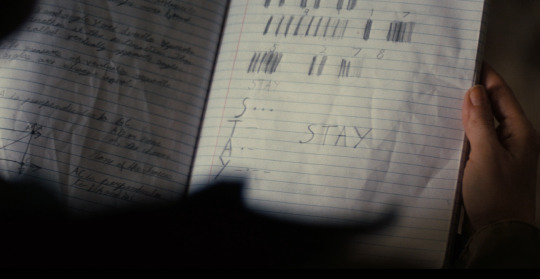
This story contains spoilers for ‘Interstellar’ (2014).
Although it is insultingly reductionist to both filmmakers, there are many reasons Christopher Nolan is often described as a modern-day Stanley Kubrick. The one most people usually settle on is the notion that both men supposedly make exacting, ambitious films that lack emotion.
It is an incorrect assessment of either director, but it’s beyond amazing that anyone could still accuse Nolan of such a thing after he delivered what is unquestionably his masterwork, the emotional rollercoaster that is 2014’s Interstellar.
In the epic sci-fi adventure drama, Nolan managed to pull off something that many filmmakers have attempted and few have achieved. He told a story of boundless sci-fi scope, and had it be all about love in the end. It sounds cheesy to even write it down, but Nolan did it.
That Interstellar is such an overtly cutting-edge genre film that chooses to center itself so brazenly and unapologetically around love, is frankly awesome.
Love informs Interstellar both metaphorically and literally: the expansive scope of the film effectively represents love’s infinite potential, and love itself ends up being the tangible thread that allows far-flung astronaut Cooper (Matthew McConaughey) to communicate with his Earth-bound daughter Murph (played as an adult by Jessica Chastain) from the tesseract (a three-dimensional rendering of a five-dimensional space) after Cooper enters the black hole towards the end of the film.
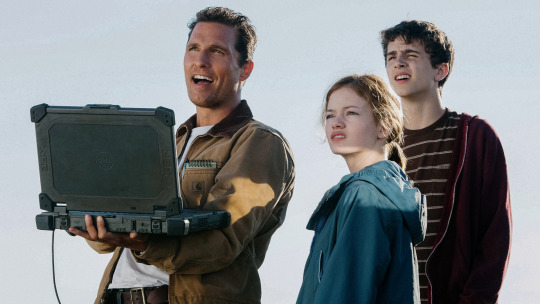
Matthew McConaughey as Joseph ‘Coop’ Cooper, Mackenzie Foy as Murph, and Timothée Chalamet as Tom.
In transmitting (via morse code) what the robot TARS has observed from inside the black hole, Cooper provides Murph with the data to solve the gravity problem required to uplift Earth’s population from its depleted home planet. Humanity is saved. Love wins again. Hard sci-fi goes soft. Christopher Nolan’s genius is confirmed, and any notions of emotionlessness are emphatically washed away.
This earnest centering of love in Interstellar is key to the film’s universal appeal, and undoubtedly plays a large role in why it features so prominently in three significant Letterboxd lists determined by pronoun: Interstellar is the only film that appears in all three top tens of “most fans on Letterboxd” when considering members who use the pronoun he/him, she/her and xe/ze. (“Most fans” refers to Letterboxd members who have selected the film as one of the four favorites on their profile.)
To get a bit reductionist myself, sci-fi adventure—in cinema, at least—has traditionally been a masculine-leaning genre, but Interstellar’s placement across these three lists points to it having superseded that traditional leaning, hopefully for the better.
Yet the film reliably still provokes reactions like this delightful tweet:
few movies make me as mad as Interstellar. who the fuck makes 3/4 of an excellent hard sci-fi movie backed up by actual science and then abruptly turns it into soft sci-fi about how the power of love and time traveling bookshelves can save us in the final 1/4? damn you, Nolan
— the thicc husband & father (@lukeisamazing)
February 13, 2021
Although this tweet is somewhat indicative of how many men (and women, for that matter) respond to the film, I think it’s pretty clear the writer actually loves Interstellar wholeheartedly, final quarter and all, but perhaps feels inhibited from expressing that love by the expectations of a gendered society that is becoming increasingly outdated. The “damn you, Nolan” is possibly a concession of sorts—he’s damning how Nolan really made him feel the love at the end. It’s okay, @lukeisamazing, you don’t have to say it out loud.
Conversely, it can be put like this:
“The emotion of Interstellar is three-fold: Nolan’s script, co-written with his brother as with all his best stuff, masters not only notions of black holes, wormholes, quantum data and telemetry, but it also makes a case for love as the one thing—feeling, fact, movement, message—that can mean more and do more than anyone in our current time, on our existing planet, can comprehend.”
The writer of this stirring summation, our own Ella Kemp, is paraphrasing a critical section of the film, when Nolan goes full literal on the concept of love and has Cooper and Dr Amelia Brand (Anne Hathaway) debate its very nature, quoted in part at the top of this story. It comes when the pair are trying to decide which potentially humanity-saving planet to use their dwindling fuel reserves to travel to. Brand is advocating for the planet where a man she loves might be waiting for her, instead of the planet that has ostensibly better circumstances for life.
Brand: “Love is the one thing we’re capable of perceiving that transcends dimensions of time and space. Maybe we should trust that even if we can’t understand it.”
“Love has meaning, yes,” responds Cooper, heretofore the film’s most outwardly love-centric character, exhibiting a stoic longing for his dead wife, while also abandoning his ten-year-old daughter on Earth for a space adventure (albeit one designed to save humanity) than has now inadvertently taken decades. “Social utility. Social bonding. Child rearing.” Ouch.
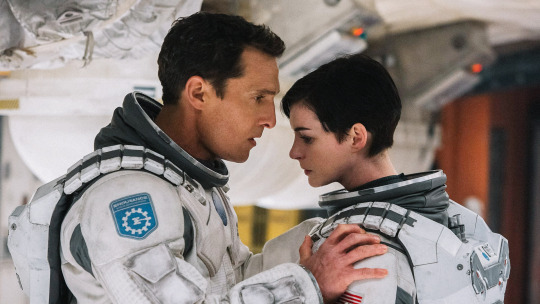
McConaughey with Anne Hathaway as Dr. Amelia Brand.
Brand: “You love people who have died. Where’s the social utility in that? Maybe it means something more. Something we don’t yet understand. Some evidence, some artefact of a higher dimension that we can’t consciously perceive. I’m drawn across the universe to someone I haven’t seen in a decade who I know is probably dead. Love is the one thing we’re capable of perceiving that transcends dimensions of time and space. Maybe we should trust that even if we can’t understand it yet.” Amen.
Cooper remains unconvinced by Brand’s rationale, but this dispassionate display presages him going on to realize the true (literal) power of love (and his poor, science-only decision-making—thanks Matt Damon) when it provides him the aforementioned channel of communication with Murph in the tesseract. Nolan has a female character make the most eloquent vocal argument for love, but it’s the male character who has to learn it through experience.
So while Interstellar does initially conform to some prevailing cultural ideas about love and how it supposedly relates to gender, it ultimately advocates for a greater appreciation of the concept that moves beyond such binary notions. That is reflected in how important the film is to Letterboxd members who self-identify as he/him, she/her and xe/ze. We all love this movie. Emphasis on love.
Brand’s speech—not to mention the film as a whole—also can’t help but inform the current global situation. Interstellar argues for a greater devotion to both science and love, in harmony; such devotion might have mitigated the devastating effects of the coronavirus pandemic where both concepts were drastically undervalued by many of those in charge of the response.
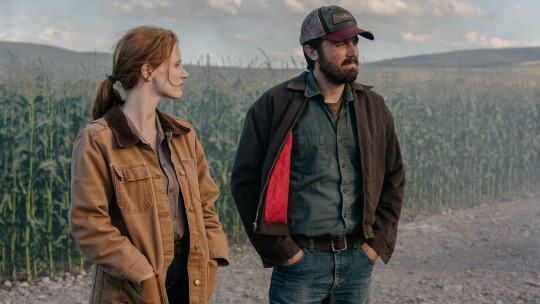
Jessica Chastain and Casey Affleck as the grown-up Cooper siblings.
Despite the reactions cited above, responses to Interstellar aren’t always split down gender lines. We’re all allowed to feel whatever we like about it, and substantial variety comes across in the many, many reviews for the film.
Zaidius says Interstellar is so good that, “after watching [it], you will want to downgrade all of the ratings you have ever given on Letterboxd.”
On the other hand, Singlewhitefemalien takes issue with Dr. Brand’s aforementioned love-based decision-making in her two-star review: “She wants to fuckin’ go to Planet Whatever to chase after a dude she banged ten years ago because women are guided by their emotions and love is all you need.” A perhaps fair assessment of the role Nolan chose his sole female astronaut to play in the film?
Sam offers food for thought when he writes “First, you love Interstellar; then you understand Interstellar.”
Letterboxd stalwart Lucy boils it down effectively in one of her multiple five-star reviews of the film: “I needed a really good cry.” It’s hard to say whether Vince is agreeing or disagreeing with Lucy in his review: “Fuck you Matthew McConaughey for making me cry.” The catharsis this movie provides for dudes becomes clearer the deeper you venture into our Interstellar reviews (and I ventured deep): “How dare this fucking movie make me cry… twice,” writes John. Let it out, John.
Then there’s Rudi’s take: “I sobbed like an animal while watching this but I’m not exactly sure what animal it was like. Like a pig? Like a whale? I don’t know but I do know that I cried a whole fucking lot.”
Emotionless? With all this crying?
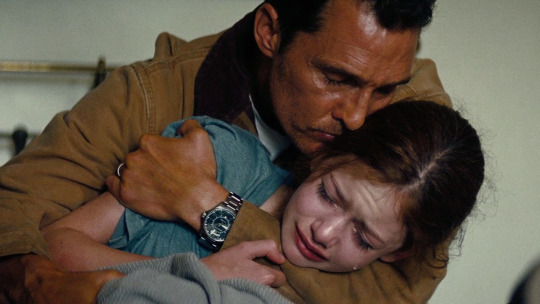
Christopher Nolan inspires more debate than any other filmmaker of the modern age (when we’re not getting unnecessarily riled up about something Marty has said, that is) and while Nolan has the passionate devotion of millions of viewers, I’d argue he still doesn’t quite get his due. Especially when it comes to Interstellar.
By so successfully using love as both a metaphorical vessel and a palpable plot point in a sci-fi adventure film, he built on notable antecedents like James Cameron’s The Abyss and Robert Zemeckis’ Contact, two (great) films with similar aspirations that didn’t stick the landing as well as Interstellar does. In Contact, McConaughey engages in a similar debate about love to the one quoted above, but notably takes the opposing side.
Steven Spielberg (who at one point was going to direct an earlier iteration of Interstellar) did a pretty good job of showing love as the most powerful force in the universe with E.T. the Extra-Terrestrial, but there hasn’t been a huge amount of room for such notions in the genre since then.
Kubrick’s 2001: A Space Odyssey, Interstellar’s most obvious forebear, is often accused of being the director’s most brazenly emotionless film. And while that’s perhaps a bit more understandable than some of the brickbats hurled Nolan’s way, there’s more emotion in the character of Hal 9000 than in many major directors’ entire oeuvre. It’s also, in part due to Hal’s place in the examination of queer consciousness in the sci-fi realm, the film currently in the number one spot on the xe/ze list.
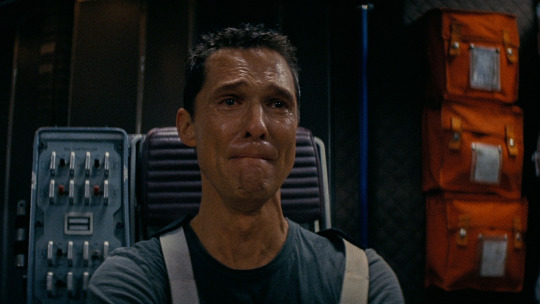
Two films that notably exist in Interstellar’s wake are Denis Villeneuve’s Arrival, which expands upon Interstellar’s creative use of time-bending (and like Contact, features a female protagonist) and James Gray’s Ad Astra, which tackles the perils of traditional masculinity with more directness.
Interstellar doesn’t solve the sci-fi genre’s cumbersome relationship with masculinity and gender, but it makes significant strides in breaking down the existing paradigms, if only from all the GIFs of McConaughey crying it has spawned. Its appeal across the gender spectrum is an interesting and encouraging sign of the universality of its themes. And the power of love.
Fans out of touch with their feelings may complain about the role love plays in the film, but that says more about them than it does the film. Love wins. Also: TARS. How could anyone not love TARS?
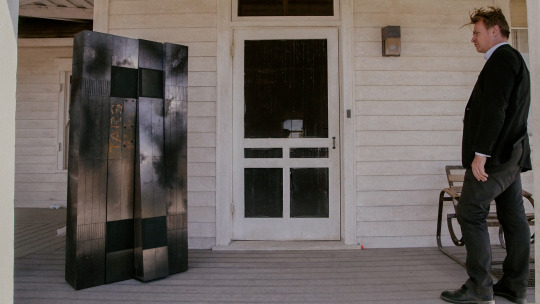
TARS and Christopher Nolan.
Related content
Men/Boys Crying: a master list
“I Ugly-Cried Like Matthew McConaughey in Interstellar”: Amanda’s list
“I Liked Interstellar”: Sar’s list of what to watch afterwards
Follow Dominic on Letterboxd
#interstellar#christopher nolan#2001 a space odyssey#stanley kubrick#letterboxd#science fiction#sci fi#sci fi film#sci fi movies#queer consciousness#the meaning of life#love
30 notes
·
View notes
Text
Scottrospective: Scott Pilgrim and the Infinite Sadness
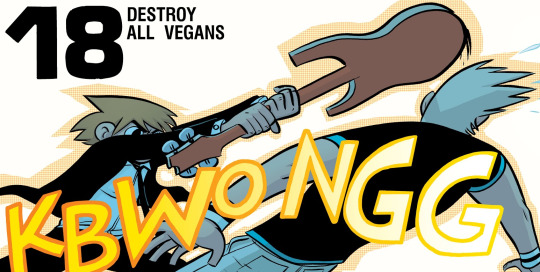
Welcome back my Scottaholics! We’re moving right along fun and fancy free just a few days later from Book 2 to 3. Which fits: As I mentioned in my review of book 1 I first encountered Scott, Ramona and Wallace in a free comic book story, and VERY intrigued, bought volumes 2 and 3 from the same comic shop after reading it in line.. or maybe I went there again later and bought them. My brain is a foggy sinkhole. Point is I was hooked from then on out, and bought the next three volumes as I came out, and through the internet because by then i’d leanred to use Amazon. Ironic given Ramona’s work for them is not only iconic to the series but plot important in volumes 1 and 2. As is Scott’s package toss in the movie. But the story of my long wait for volume 4 can wait for February. Point is it was these two and Free Scott PIlgrim are the ones I poured over again and agian, obessing over as a teen and the ones that stick in my brain the most.
But even with that last time the exaustive process of covering it exposed a LOT of volume 2′s weakness: While it has a lot of iconic scenes, including Scott accidently convincing a man to skateboard himself to death, the Ramona and Knives fight, the envy call, the flashback, and is still very enjoyable..it also feels the most like a collection of loose events out of the books. Good stuff and character and tone wise better than last time.. but not quite as narratively strong. The series was GETTING there, the art was solidfiying into it’s final form, the characters were in the right place, SCott was more likeable.. but it hadn’t quite hit it’s stride yet.
Three guesses when it did and the first two didn’t count. Infinite Sadness is one of my favorite volumes, along with 4 and 6. And while part of that is nostaliga and a personal connection.. the bulk of it is just this volume being even BETTER on the re-read. I picked up subtle bits that I didn’t notice before that only enritched the experince, the pacing is sublime, the character work is top notch and compelling, the art work is finally crystlalized into what the series is known for, and would only get even better as it goes, and the fights are some of the series best. This is one hell of a story and I warmly invite you to join me as I break it down after the break.
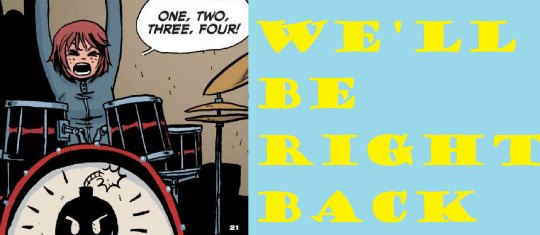
Previously on Scott Pilgrim: Scott defeated Lucas Lee, the second Evil Ex, met Luke Wilson, and prepared to go to his ex girlfriend’s concert despite this being a terrible idea to discuss a gig. It was there he and Ramona found out Envy’s base player Todd, the douchenozzle who she cheated on Scott with, is also the douchenozzle Ramona cheated on Lucas with.
So we open.. exactly from that moment, with Scott and Ramona starring wide eyed while the band plays in an utterly dazzling sequence that’s been brought up a notch in the color remaster. Also one of a handful of moments that was barely touched from page to screen, with only slight adaptations to make it better on screen, and the addition of Metric’s now iconic “Black Sheep”. And when reading the scene.. I couldn’t resisit turning black sheep on as it matched it perfectly.. so yeah have the Clash at the Demonhead performance from the film
youtube
So while that worms it’s way into your head, let’s talk about the character designs for Clash Of the Demonhead, since volume 2 is the last time in the color editions O’Malley really talks about character origins and stuff. I could’ve missed something of course, we’ll see as we go won’t we. I just saved it for here as the Volume 2 review was running a bit long as is and while their shown on covers and on the back cover of the black and white edition, they don’t show up in person and in their full glory till the last panel, hence saving it for here where Envy and Todd are the main antagonists and Lynette is... plot relevant.
Envy was based on the front woman for the band Metric, Emily Haines, designed much like hanes to be a tough, confrotnational, sexy woman, his words not mine, who’d gone through a lot of change in a few years since according to him, and i’m willing to take his word for it since I don’t know the band outside of the one song he picked for the movie, a lot of the bands songs are about that. And honeslty it makes me want to check them out more, as does how awesome black sheep is I can’t belivie I took this long, and is supremely intresting as I hadn’t realized there was a good reason there wasn’t just an original song written for clash at the demonhead. I mean if you base your character on the frontwoman for a band why NOT use one of their songs.
Speaking of band, Plumtree’s drummer, Lynette Gillis, was the inspiration for Lynette Gycott, though the final version of her is more cold and robotic and less like Gillis than initially envisioned.
Finally Todd..was based on Scott, and while he evolved out from that a bit especially in powers.. the concept basically stuck as Todd is a stronger, dumber, more agressive and douchey version of Scott whose mistreatment of women is far more deliberate than Scott’s untetional douchebaggery.
So after some interview segments for some sort of documentary on the band with the crowd, we cut to our heroes after the show, all standing around and being nervous. Stephen’s first words are “Decent show eh, told you they were good”.
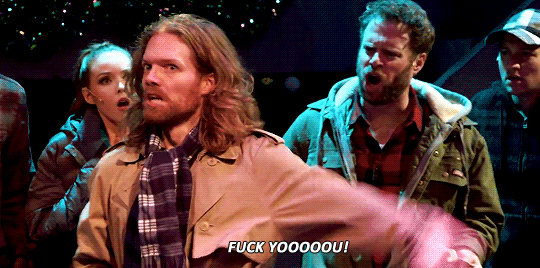
Admitely re-reading this one and answering a reader question, unrealted but it got me to thinking, made me realize Stephen wasn’t AS much of a dick as I thought: I didn’t think about the fact Scott and Envy’s blow up cost him their old band which was close to singing, and that Scott both as revealed in volume 3 and in bits here, was kind of a dick towards the end, intitating the breakup while drunk and belligernt and saying a facepunchingly dickish comment we’ll get to. So he wasn’t BLAMELESS and it’s understandable Stephen dosen’t hate her as much. She was friends with his horrible albatross of a girlfriend and didn’t break his heart.
However.. he’s still an asshole and deserve jeff blim’s theatrical fuck you up there. He still ignores Scott’s pain, or the fact that most of the breakup WAS Envy’s fault as we’ll see. We’ll get into it in full obviously but for the cliffs notes so I can yell at a fictional grumpy closted canadian man: She slowly drifted away from him, treated him like he had no say in a band he helped found or took his feelings into account in the record deal, and cheated on him with Todd and possibly another guy. And as seen here she used her fame to bribe her ex and friends into showing up just so, as we see, she can torture him and his new girlfriend a bit. Envy is not a good person and Stephen is ignoring that and his friends VERY obvious emtoinal turmoil. Especially dickish since by this point Scott has clearly swallowed his pride and agreed to a show with someone who really DEEPLY hurt him for Stephen and Kim’s sake.. and he’s not even remotely greatful for it clearly. The only reason he’s not the biggest asshole left in the building is because Todd, Envy and Julie, queen of bitches, is in there.
So after a save point gag that goes nowhere, Envy shows up to take the group back stage... awkward, uncomfortable and very intentional silence insues to makes Scott even more sweaty and nervous and Ramona visably and understandably annoyed. Knives tries to talk to her hero but gets ignored because Envy’s a bitch.. and so’s Julie who not only joins in the shunning of a fucking teenager who clearly loves this band, but also is clearly trying to conversationally surgically attach her lips to Envy’s ass. Her toadying is obnxoious as you’d expect and as transparent as you’d expect, trying to drudge up old nostalgia while Envy’s clearly barely intrested, and the only thing that makes it more tolerable than normal Julie is Envy clearly barely tolerates this and likely is only going with it because she could be a useful minon in the future.
Thankfully this is broken up. Unthakfully it’s by knives shouting her most iconic line:
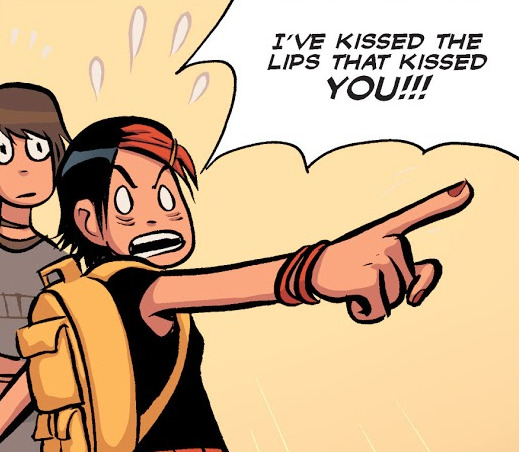
Given Envy is shown to not be the best person.. her response is to have her cyborg goon belt knives in the face
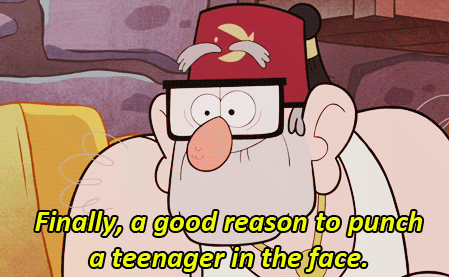
Which leads to an even better line seconds later
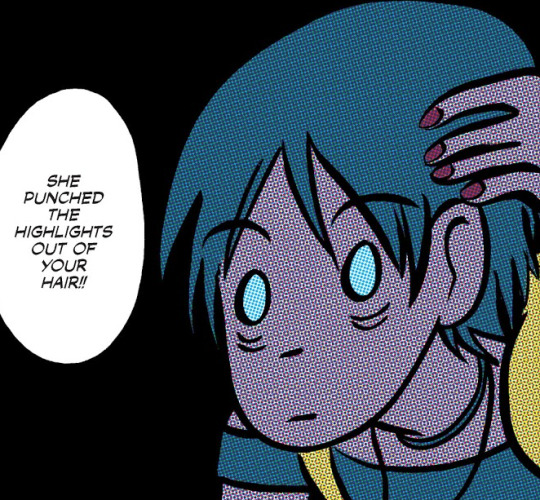
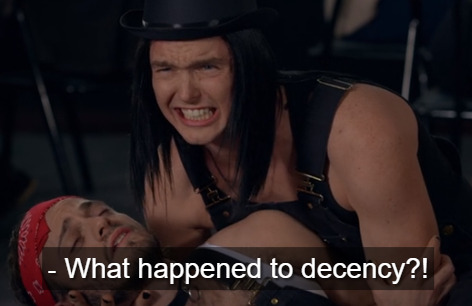
Envy then to just .. complete the circle of being a bitch has NEil take knives out then mocks her when Julie explains why knives and neil were even here. And it’s VERY telling that even Julie, who was must minutes from humping envy’s leg and begging to go with her when she leaves, is visably put off by Envy’s attitude. So while Ramona is understandably fucking done with this, as even she has some shred of sympathy for the teenager who tried to stab her a day ago, Scott has to take a minute to have a flashback. We see two brief bits of Scott with Envy, at the start of their college band Kid Chamelon where they were all happy.. and shortly after the breakup where Scott is miserable, in the middle of the street, sadly saying their name while saying “I’m so alone”.. explaning that desert bit from volume 1.. and making it ten times more painful. Nicely done Brian.
So with Knives gone we get our usual character age intros and descriptoins, my favioritte being Stephen “wants a damn buritto dammit” which I can relate to and thankfully got it monday. He also does show a bit more of his noble self as, things have escalated to the point even he can see Envy has some sort of evil scheme planned and he walked right into it so he asks what her ulterior motive is. Julie pipes up with “She dosen’t NEED ulterior motives she was written up with in spin!”
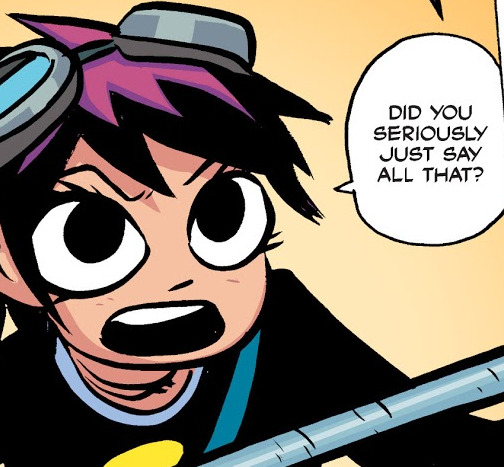
So Envy grills Ramona a bit clearly trying to make her squirm..though at least when Julie TRIES to jump in she shoots her down, like some asshole pulling a yappy dog on it’s leash hard. Eventually Scott flips out and .. well I don’t want to overpanel this review but this is just.. quotes cannot do this justice.
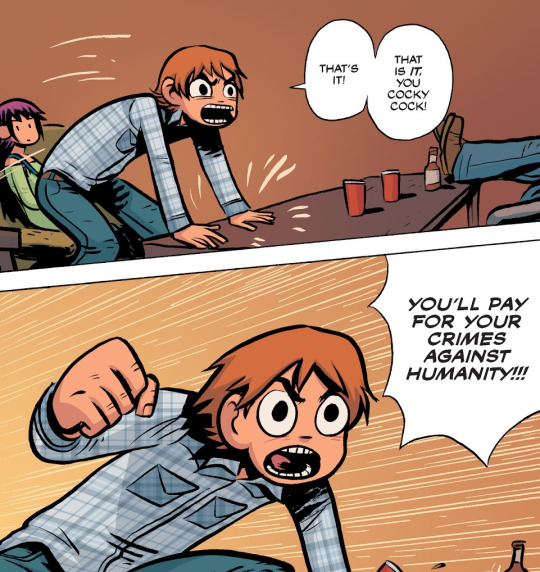
The result.. is the reveal Todd is psychic due to being a vegan and he throwing scott through a wall with telkenisis, kyle!
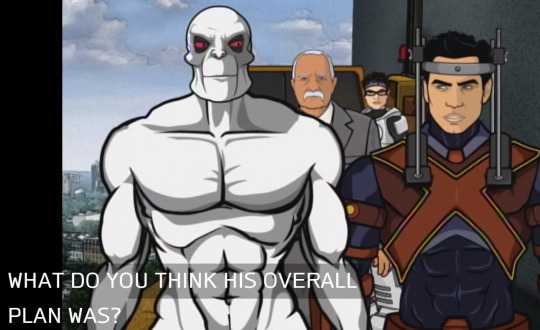
It’s explained he has these powers because he’s a vegan and even was top of his class at the vegan academy. Citation... needed. Not because of his power but because Todd may be one of the stupidest beings that’s ever lived. And I once had a friend whose other friend told me, since they’d be going to diffrent high schools and he was trying to pass off his mummies curse of keeping him from destroying himself with his own stupidity, tried to run into a wall to loose weight. No I don’t get how this would’ve worked but having known the guy I guarnatee he was arrogant and dumb enough at the time to try it. Nowadays I assume he’s much better... I assume. You.. you’d have to be to have survived another decade.
Todd is also THAT kind of smug dickhead. Thankfully I haven’t met one in real life or online, as the two vegetarians I have known, one of my best friends micheal and my uncle drew, the former of whom now also eats fish and the latter of whom gave it up once he moved to places he could get meat that was raced humanely easier, but who I still respect for having that amount of self control. But Todd is a clear parody of the type of vegan and vegetarian who think their better than everyone.. by thinking he’s even BETTER than regular vegans because not every vegan can take the strain of psychic powers, with Kim naturally sniping at him.. then flipping him off when he says “don’t get snippy babe” and is very lucky he has psychic powers as otherwise he’d suddenly be wondering where his dick is and why kim’s holding a broken bottle.
Brian also pokes fun at the old 90 percent of your brain trope. You know the old one that claims you only use 10 percent..
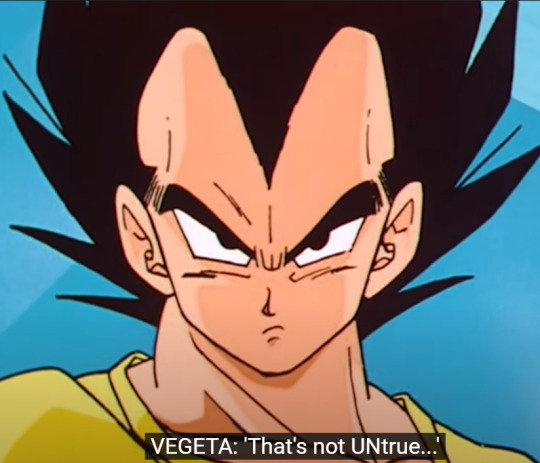
But it’s only because your only ACTIVELY using it and the rest is simply other functions. But hey we got Deathstroke out of that claim so good enough. Todd claims it’s because the other 90 percent is curds and whey. This might be the greatest use of this outdated trope in human history. No.. no.. it is. It exactly is.
Envy brags that’s why he can’t beat him having clearly traded disappearing up her own ass for disappearing up todd’s, Julie was also crammed up there, it was getting crowded. Envy claims to have been with todd since age 11.. which.. is more.. delusion than anything and she brushes off Ramona rightfully pointing out that’d mean he cheated on her with Ramona as Rammy trying to distract her and trying to smack talk SCott more who has another flashback.
SOME YEARS AGO.. I DUNNO 5? 5 YEARS AGO?
We see Scott’s first meeting with Envy, who was rooming with Julie. Julie, it might shock you.. has not changed at all in 5 or so years. She’s seen bitching at her roomate Natalie V. Adams, the future Envy, for not wanting to get drunk and high and for hanging out in her room with all her anime posters and stuff. As you can tell, she’s a vastly diffrent person at this point, a nerdy interverted otaku and as you can probably guess now the flashbacks have started at the top, we’ll be seeing how she became the sexpot rockstar she is now and how that drove a wedge betwene her and Scott. Julie SHOCKINGLY does not take this well and as Stephen to kil lher if she ever becomes friends with her. I mean I would but If I could travel into fictional works I certainly woudln’t be wasting my time murdering Julie. I’d be asking kim out and trying to get into some cool video game ablities myself. I ain’t got time for that bitch.
Next cut Julie is ... even worse as she’s calling Scott some “jerky jerky ladykiller”, pointing out he’s hooked up with recurring background characters Sandra and Monique. Now GRANTED, Scott could’ve hurt them and Julie could be right for once.. we’ve seen he has a history of being an insenstive douche by pure accident. But.. from the sounds of it given his encounters with Sandra and Monique were both in seperate ladies rooms, as in casual hookups I assume are common in universities. As long as he used a condom and dind’t lie about being in it longterm, who the hell does it hurt. Same if he and Natlie ended up being that. He’s not a “ladykiller” if he got busy on a washroom sink. He just had casual sex in an awful location and given Scott is both horny and stupid freqently, I could buy he either inittated it clumsily and sandra and or monqiue went for it, or one of them thought he was cute and wanted a quick one with him and it just never went anywhere either due to lack of intrest or Scott being kind of a moron. I don’t buy he INTENTIONALLY hurt anyone, he MIGHT of hurt Sandra she seems kind of ditzy and might’ve not realized it wans’t serious.. but it just entirely sounds like a casual, consesual one time hookup with two seperate women. And as long as he wore a condom and repsected their needs what the fuck is it Julie’s buisness. BEcause their here freinds? I mean they told her but they weren’t expecting her to play dick sheirff with scott probably. And Natlie is not her buisness: their not really friends.. she’s just trying to ruin Scott’s day. I honestly get the sense she only hates Scott because she can’t get rid of him, Stephen won’t dump him as a friend and he fucked her friends once. Which makes me hate her MORE. Natlie/Envy however also calls bullshit and thinks Scott’s much too awkward to be a ladykiller. Accurate. I mean he’s good with women and gets dates easily, he’s just not inteitonally leaving them high and dry. He’s just not great with empathy.
Scott snaps back to the present and gets pissed.. and we get the real reason for the outburst as he shouts “You you ass! She USED to be NICE!”. It’s very clear that Scott blames Todd for Envy’s change into an cold and cruel person. But .. that’s not on him entirely. I do think Envy’s cattier, more cruel “play with prey like a cat with a mouse” personality at this point is due to Todd feeding into her worse impulses.... but the flashbacks make clear even before she saw him again she was slowly changing as a person for better, gaining a drive and passion for music.. and for worse, shutting scott out cheating on him and generally not carring about anything but her career, especially Scott. As much as he wants to belivie it she didn’t MAGICALLY change into a bitch overnight and beating todd won’t fix that. She became what she is as a choice. Todd just made what she became worse.
After the predictable result of Scott getting flung into the air and falling back down, he has another flashback and we see the next phase of their relationship: Scott, Envy and Stephen playing in a band for Stacey and Wallace (!), whose hair is certainly a... choice. And the two falling in love and julie grilling scott on if he and nat are a couple because why stop making me wish for a bus to hit you NOW Jules?
So we then get ANOTHER iconic line and another scene that was perfectly translated into the film
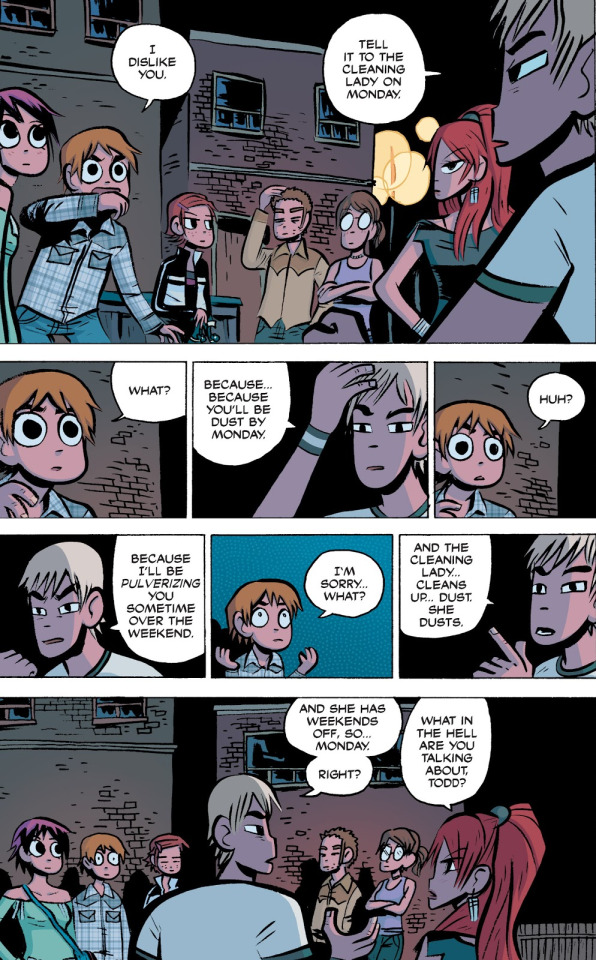
Comic gold no matter the medium.. Brandon Routh just nailed it and I watched the scene again before writing this just out of curoisty. Flawless stuff. Check it out
youtube
I will say however that while Movie!Envy’s response of just quickly covering is pretty funny.. I prefer the comic’s envy’s utterly baffled and pissed off “What are you talking about Todd?”. Even she can’t fathom what the fuck just happened. But since it’s late and Todd’s brain is pretty fried, Envy calls for everyone to get some sleep and they’ll regroup tommorow at 1pm at Honest Ed’s. Honest Ed’s WAS a famous discount Store in Canada that sadly closed in 2016, making what ‘s about to happen to it here sad in hindsight. It was known for big sales, big spectacle and i’ts larger than life owner who sadly passed a few years after this volume. But god bless him for giving this series one of it’s best settings. More on that when we get there for now FLASHBACK
Back in College, we see Nat’s change into envy as she sells all her stuff for some bitching new boots and cd’s and during sex with Scott asks him to start calling her Envy. Their still somewhat happy, as the next flashback has Scott remembering their 8 month anniversary and her playfully mocking him as the girl.. before we get a much starker one of him telling her he loved her and her not responding.. and looking at him.. more.. bored than anything.
Back in the present our heroes try to wait out the rain under a bank thing, can relate to the times i’ve visted the city and came out to rain, and when that fails Kim says she’s off and will see them at practice and tells Stephen to blow her when he asks her if she’s going to Honest Ed’s, then seems genuinly confused if he pissed her off before heading home. Swing and a miss stevie, swing and a miss.
Scott is hungry and sorta drags Ramona, whose not in the mood for anything, over to Pizza Pete’s a nearbye eatery. It’s there they happen to run into Other Scott... Other Scott is another guy named Scott. He dosen’t do much in the books. But the name Other Scott is objectively funny and he is objectively nice so he’s fine in my book and I applaud the movie for using him as Wallace’s love intrest. Though I wouldn’t be REMOTELY suprised if they were fucking in the books too. And of course with him is Wallace himself, who really is just.. entering this volume in the most Wallace way possible.
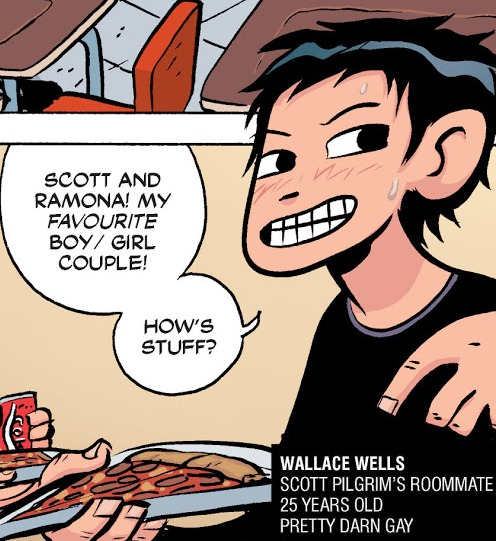
A little drunk, eating some cheap but good food, with a million dollar style and in just the exact right place at the exact right time. If that’s not Wallace Wells, I don’t know what is. Wallace and Other Scott were clubbin, not a huge suprise given Wallace has his own deep and complicated social life we never see and Wallace is naturally a little bit absolutley livid when he finds out Scott went to see Envy’s show anyway despite you know, putting him in a misery coma. Who do you think has to clean you and feed you when your like that Scott? Elves? Well I mean .. Wallace MIGHT be an elf.. but he stilld soen’t want to do either of those things. He breifly gets sidetracked by the fact that Scott is wearing his shirt.. maybe. I mean he wore it the other day but given their living situation it’s honestly hard to tell. Ramona reminds him of his priorites
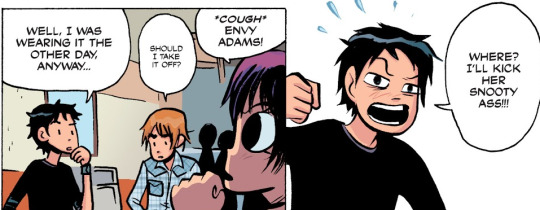
That’s part of the fun of rereading these again so soon after rereading them in december: I’m noticing tons of little moments like this I didn’t really before. The two explain things, including Ramona pointing out Scott’s extra stupid around Envy. I mean it’s a bit mean to point out given this is clearly a lot for him.
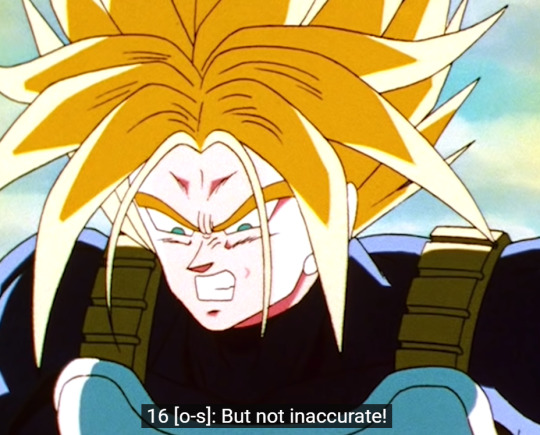
Wallace brushes it off and promises to help him train like a true pal before being prompted to talk about this new boy he picked up Mobile.. who we wont’ see in person for a while but Wallace is clearly head over heels for and begs Scott to let him have the apartment.. or more accuratley Ramona, whose clearly not in the best of moods with Scott, to take him. His sales pitch is immaculate
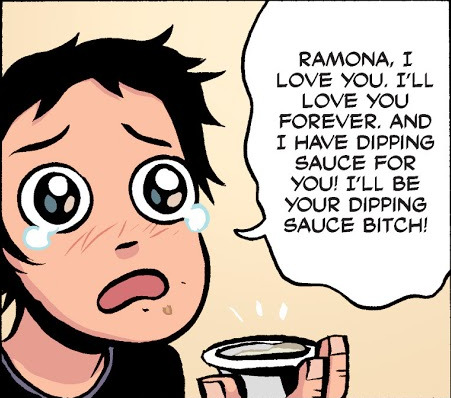
So she agrees and a friendship is forged based on mutual hatred and being someone’s dipping sauce bitch. I’ve forged longer lasting friendships on far less. Also Wallace forgot his keys but wisely banked on his Gladstone Gander esque luck to help him out.. seriously i’m convinced he has a lower yield version of that. Or God wants to bang him but can’t because his penis is so powerful it CAN SPLIT A MOUNTAIN IN TWAINNNNN. You make the call.
So they sleep it off, and Scott heads home early next morning.. and forgot he gave wallace his keys. Thankfully wallace finds him, and even got him donuts for when he came back, what a guy, makes you cry and I did. He also shows off a new trick about using your chi to dust rain off you. Turns out Mobile is psyhich which.. dosen’t come into play but for vallad reasons: Scott assumes Mobile can just.. give him psyhic powers and training but a) he and Wallace JUST met and while they’ll remain together for the rest of the series, it’s a big ask to have him help train his best friend to fight a man as dumb and chisled as a mountain, and B) “It dosen’t work that way” meaning scott’s probably not psi adept and even if he can be taught, there’s not NEARLY enough time for him to get good enough at shielding himself from Telkenisis in time given Todd’s already fighting him today and has two other oppprotunites afterwords to beat his ass to death. There’s just not enough time. So scott collapses with a donut in his mouth.. are .. are we sure this isn’t just a more attractive more sucessful canadian alternate me?
We flashback to when Wallace met Envy and since i’ts post-becoming envy, it dosen’t go well and he hates her immidetly, and expects Scott to break up with her asap.. which while bitchy.. actually woudl’ve been a good move in the long run. And “Bitchily phrased but a good move in the long run” has apparently always been Wallace’s go-to move.
In the present Wallace helps Scott , who thinks everything sucks, realize it does not, with the help of fresh bacon and perspective, helping him avoid thinking Envy is “back” when she’s just vistiing and somewhat forces him to admit it’s not happening again nor should it. And implicity your both with other people, you’ve moved on, stay moved on. ANOTHER Flashback, this time with Envy asking Scott how he and Wallace met after dinner with Scott’s parents. It’s the story we’ve been hinting at since.. uh last volume.
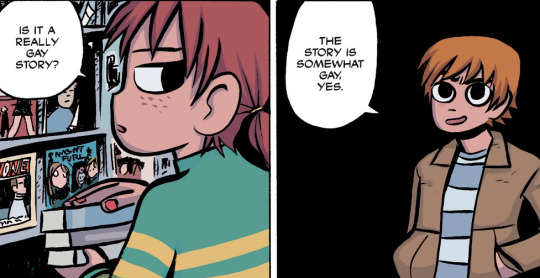
And indeed it is somewhat gay! Behold! The origin of a friendship to piece the heavens or .. something like that. I’m tired.
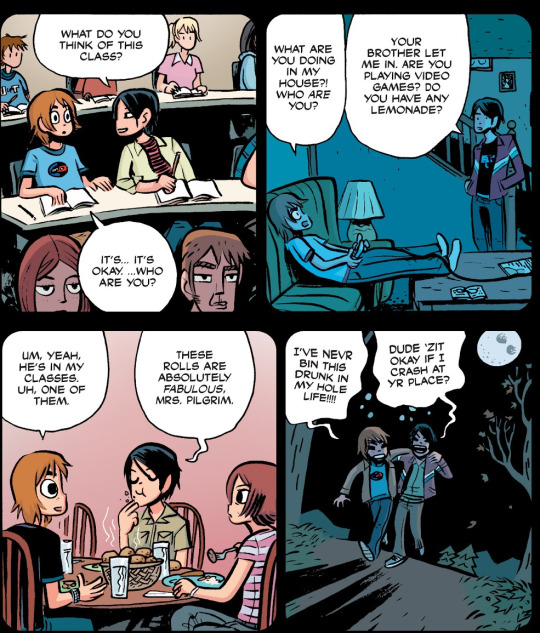
It’s a quick breezy story that honestly both explains a lot and is what you’d expect; Wallace taking an intrest, Wallace presumibly realising Scott is straight off screen but deciding fuck it I like this guy let’s be pals instead, and jjust sorta showing up at his house. But since it’s Wallace and he and Scott both love gaming.. it just stuck. And it’s easy to see why. Scott’s a bit of an introvert and Wallace is a ton of an extrovert. Wallce is nice, naturally charming and endlessly cool, and as you can see it took him probably just an afternoon to go from freaking scott out for showing up randomly, to Scott talking the guy up and clearly being the bosom buddies they are now. The two just ballance each other out well. Wallace need’s scott’s weirdness and general heart, and Scott needs Wallace to keep him from running into the brick walls of life via his own stupidity and conflict avoidance. It’s what they do, they make it a two player game.
So later that day, and some off screen training later, presumibly to the song Two Player Game despite the fact it didn’t exist yet, our heroes (Scott, Ramona and Wallace), Villians (Envy and Todd) and other not so much evil as just cretionus assholes (Stephen and Julie) arrive. It’s also clear that Envy just made up the challenge as she went and I fucking love it, just saying they’ll run to the back, try and kill each other and no psychic powers, with Scott’s own handicap being “He isn’t a surivivor” which earns a rightful you unebleiviable bitch from wallace and a just ast rightful “fair enough” from Scott.
Stephen wonders what the deal is and Julie’s answer is... I don’t.. I can’t unpack this.
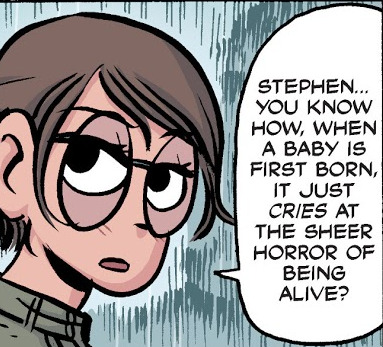
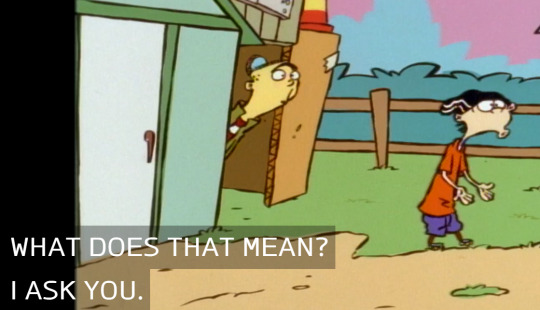
Meanwhile Wallace says “I hate her so much” Which I THINK was meant for Envy, but as a teen I interpited as being for Julie. Then again it being BOTH is entirely possible given no one can stand Julie for more than five mintues other than Stephen. And that’s because he’s still in the closet and hasn’t come out as bi or gay and thus sees her as a safe option or he really sucks with his taste in partners. Or a little from collumn a , a little from collumn b.
So yeah Scott wants a Strategy and Wallace has.. nothing other than “Well he can’t use his powers so.. use that. I guess.. I dunno. I’m hungover” though Ramona warns he can’t go long without using them without freaking out. So gooood? I’m starting to think Kim is the most useful member in his crew for this fight.. and she’s the one who decided to nope out of it because she didn’t want to watch his ex pick him apart mentally and her muscly new boyfriend pick him apart with MIND BULLETS. Wallace isn’t really helping this go round, though he’s still a treasure, Ramona is trying but dosen’t have much, and Stephen thought bringing Julie was in any way shape or form a good idea. Which really sums up their entire relationship so it’s not surprising, it just makes me question why the two are friends at all.
No really, out of Scott’s three close friends.. this friendship feels the most like two guys who just used to hang out but have no real reason too other than convience. Wallace would go to bat for scott.. with an actual bat.. to Envy’s skull. He just dosen’t want to go to jail.. again. Kim pines for him, pun intended, and also does care, she just dosen’t show it because scott’s kinda a moron parade and an insenstivity brunch rolled into one. So she sticks around even though it hurts to. Stephen.. lost his big shot in part due to Scott (Though Envy’s pushness and lack of consideration for his feelings didn’t help), his shrew of a girlfriend hates him and he’s not that good at bass... and I just got it. While Tornoto’s a big city , he’s probably not sure if Kim would be doing this without Scott. He’s.. entirely still his friend because he needs a bass player and kim’s a damn fine drummer whose hard to replace. I just got it.. it makes him a self serving douchecanoe for only being someone's friend because he needs a bass player even though he doesn’t like him, but I at least GET IT now.
So the rush into Honest Ed’s begins and.. my god this whole sequence is sublimely redelcous. It feels like what would ACTUALLY happen if two guys fought for the reasons scott and todd are fighting: just two idiots dinking around in a discount store. Scott dosen’t even last a few seconds before shouting in response to Todd’s taunts “We are all dead”, tripping while looking for eyeware and well..
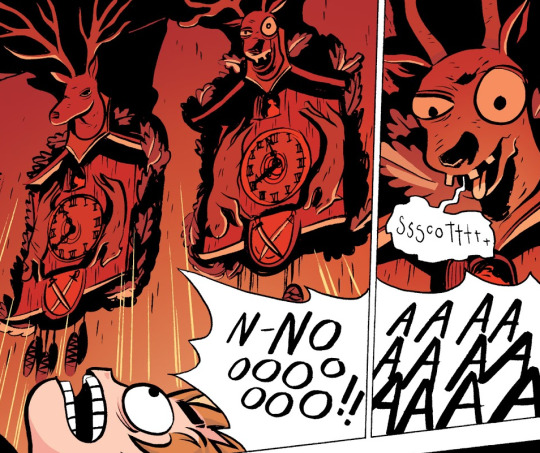
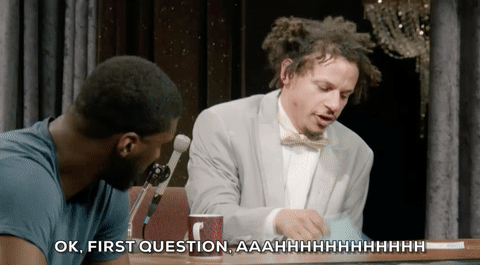
Meanwhile Todd starts to break down while shouting FATHEERRRRRRR like all good psychics. As for how long this beautiful nonsense has been going on....
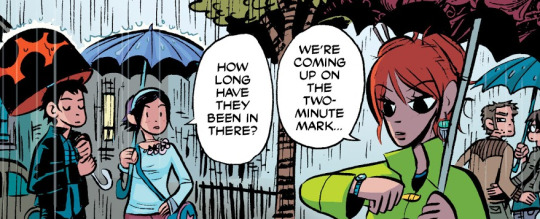
Oh and if you thought it hadn’t gotten redicously hilarious enough... wait till you see what’s next.
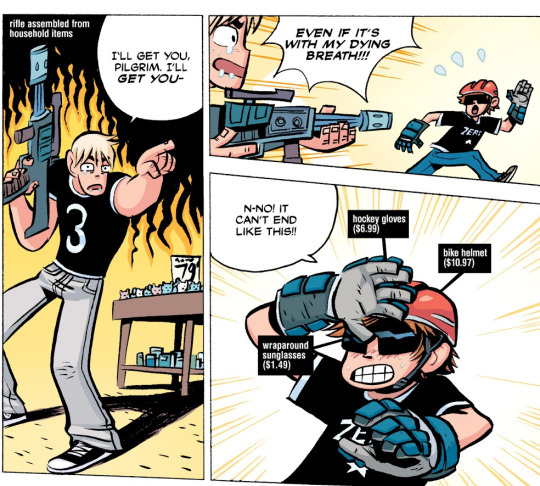
No words.. should’ve.. sent a poet.. got a tubby asshole who reviews comics, disney shows and disney comics instead....
So we then get a montage in todd’s head with his SHOCKINGLY OLD dad telling him he dosen’t have the willpower to be a vegan.. Lynette telling him she’s his for the taking and Envy will never know as she opens her shirt, and
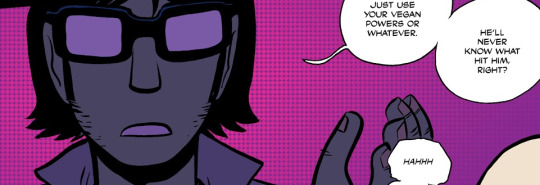
Gideon.. showing he not only consults the league but confriming what the audience and scott realized: He’s behind these assholes.. but it also shows how much. He’s actively coaching them.. and granted we KNEW the exes were in contact with one another given Lucas was having an understandable sigh about Matthew.. but this shows Gideon isn’t just some player and this isn’t some automated service. He brought them all together. The how ends up being hilarious, and we’ll get to that but while it was obvious he was the final boss this is a nice and terrifying bit of clarification. As for what happened next.. well Todd freaks out with his powers from not using them
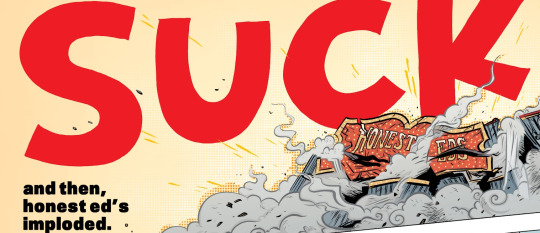
Really sad in hindsight.. but still really funny despite the horrifying concidence. So yeah our hero declares victory but dind’t really when and things just kinda end. This segment went basically nowhere and acomplished nothing. .but was still really fun, with great lines and is one of the most memorable and awesome scenes in the series.
It also shows the series growth between volumes: Last volume had a lot of cool moments.. but no real plot structure, just a bunch of things that needed to happen to get here. With Volume 3.. things are VERY tightly plotted, and even a fun but kinda pointless diversion like this... still fits in perfectly, giving us a second Scott and Todd fight to build him up, showing off just HOW powerful Todd is, and fleshing out the tofu headed douche a bit. As we’ve seen this volume still has it’s little slice of life moments the series does well. their just well put into a very compelling and fast paced plot, one we’re fully invested in as we see Scott’s torment and Ramona’s mounting anger at envy’s bullshit. It helps that Envy and Todd are the second best big bads of a volume behind gideon himslef in the fimale, with Roxy close at their heels if you were curious. Envy just oozes ego and superiority and is fun to watch every time, while we see moments once in a while that show she’s still human underneath even if she acts like a goddes.. and is admitely one of my types but that’s enough of that. She provides a nice contrast to ramona, also being standofish and mysterious but wheras ramona is clearly mysterious out of shame for a past she’s not proud of Envy is out of a past.. she has no reason to flee from and was never that bad.The only part Envy kept was Todd which was an objectively bad decision.
Todd meanwhile like all the exes as I re-realized.. is a mirror to scott. Each one has a piece of his worse traits amplified and expanded. So far Patel has been scott’s dorkyness, expanded from
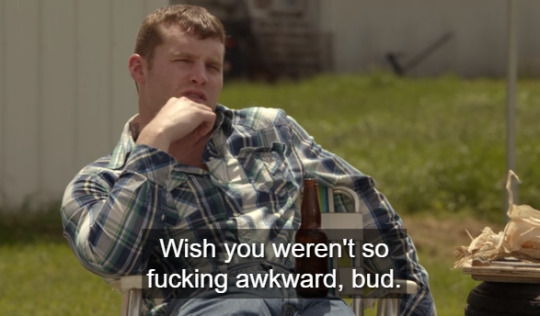
To being a giant showy hipster douche desperate to seem cool and important. Lucas is scott’s afabliity and laziness taken to just outright avoiding a fight.. not nearly as bad as the others given he still has one of Scott’s best qualities with no drawbacks.
But Todd.. is probably the ex that mirrors scott the second most. Besides both being base players with shaggy hair, both are delightfully stupid, both have a lot of charisma besides that and both are extremley good in a fight. But noticably.. Todd zigs a lot where Scott zags and the simlarites sort of stop. While both are objectively attractive, Todd is more conventinually chisled while Scott is more adorable, expertly reflected in the movie by having former Superman Brandon Routh opposite former George Micheal, Micheal Cera. Todd’s ablities are mental while Scott’s are entirely in martial arts and later swordplay. Todd has a rough relationship with his dad who never supported him and constnatly doubted him while Scott’s parents fully support him and love him uncdoitoinaly and despite his protests and annoyance with them.. it’s clear he still cares about them and loves them.
And most damingly.. Scott treats people like garbage sometimes.. but it’s because he’s oblivoius. He’s a finaical burden on Wallace, cheated on Knives, gave Kim no closure, blew up Stephen’s chances at the big time, and in general can be kind of a dick.. but NONE of that is intetnional. It dosen’t make it okay, the books make that clear.. but it’s why we can still root for him: It’s something that can be fixed. Scott hurts people a lot but he lacks gneuinely malicious intent. He leaves a lot of pain in his wake.. but it’s because he’s socially inept, and again and I say this as someone with atusitim myself, defintely on the spectrum , so he dosen’t GET he’s hurting people unless they tell him. Something that will probably not shock you but I relate to and has happened to me in the past, hence while i’ll clal him a douche or stupid, because he’s both, I do sympathize with the guy as the whilrwilnd of descrution is just him being so intent on being seen as a good person and moving past things he can’t see the wreckage in ihs wake, and the series is about him growing past that mindset.
Todd.. is just an entitled dick who KNOWS he’s probably going to hurt people but does the things anyway because he thinks as a rock star he can do whatever he wants. As a Vegan he’s superior so he’s allwoed to do WHATEVER he wants. He’s so obessed with making his dad not see him as a failure he’s developed an Ego that can only be visualized properly using well.. Ego
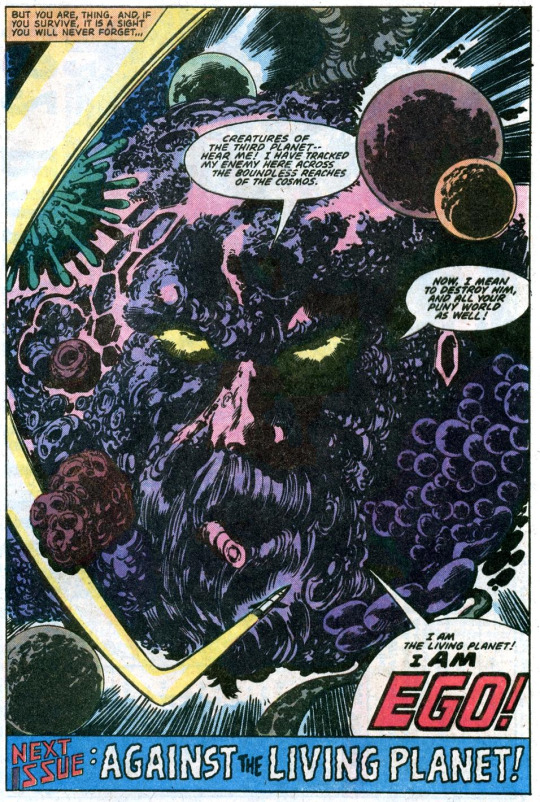
That’s what his ego has become. He’s so up his own ass his head is coming out of his mouth somehow. He’s so in love with himself he’s probably googled “How to make a sexy clone of yourself”. He’s scott’s oblivoiusness and selfishness, but with genuine intent. He’s scott if he KNEW what he was doing was wrong.. and said fuck it anyway i’m a rockstar baby. Todd, is EASILY what scott could’ve been at envy’s side had they not broken up.. successful.. but an utter bastard who only cares about themselves.
Anyways we cut to practice that night were Stephen is spiraling and Kim declines going to the show.. not for the obvious reasons of wanting to avoid another round of “watch Envy tourture scott before Todd beats his skull in with his psychic powers”, but because she has a date. Lucky bastard. The guys are naturally as tactful as you’d expect about this and suggest she’s doing a collage or puzzles before she shuts htem down and they awkardly recover and I laugh my ass off.
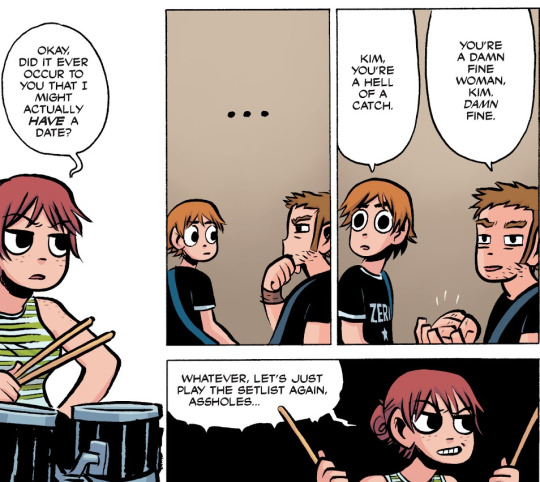
So Scott and Ramona head out, trading some talk and what have you and having some Sushi, not going there often because they can’t afford it.. but it’s cool Scott swipied Wallace’s card. When pressed on his douchebaggery Scott assures her.

We’ll get more into this next time, but needless to say Scott’s mooching is finally becoming a plot point next time. Speaking of next time on the way to the show Ramona realizes “Wait why the hell are we doing this” and convinces Scott not to go as they can relax, have a night off, cuddle and stuff, and then Scott can fight Todd tommorow at the big show. Why DO they need to sit in with two assholes who are only inviting them to fuck with their heads some more. Well okay one asshole while Todd is okay with all this he probably just mubled some “sure whatevers” while trying to solve a rubix cube while Envy outlined her plans to him before rearanging the stickers so he could win.. I Mean with his mind so it’s sitll a little impressive but still.
So they TRY making out, complete with being in their undies.. but it just dosen’t work as both of them keep picturing Envy’s face and that’s not good for either of them.
AND it was at this point fucking tumblr.. ate an hour’s worth of work I just did. Probably not something you need to know or care about but something that pisses me off greatly as I was approaching the end of the review and now have to either retype or entirely rethink what I JUST spent a while working hard on.

And this time I mean it. The only reason i’m not giving up and shelving this review for a bit.. is ithat i’m a stubborn bastard who refuses to give up that easily and who needed to vent about this to somewhere.
So Ramona finally comes clean about Todd.. and in a nice moment admits to cheating on Lucas with him “It wasn’t very nice but I wasn’t a nice person”. It’s a small thing, something I didn’t notice before.. but it’s actually a big step given how guarded Ramona is to admit to doing something this bad. Last volume, just a few days ago time wise, she lied entirely about this and probably has no idea Scott knows already. But she’s being honest, telling him the truth so he’ll be prepared for what’s coming and know the full story.
The full story is they were both little shits who raised hell together till Todd disappeared for a while. He shows up as you’d expect, dickishily interupting class before explaning Dairy Scientests kidnapped and experimented on him. He also says this
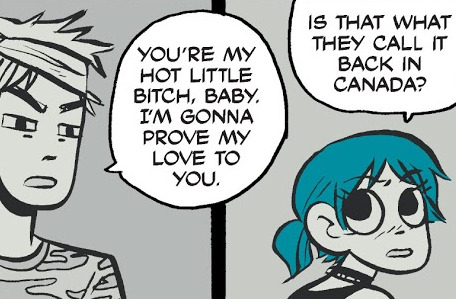
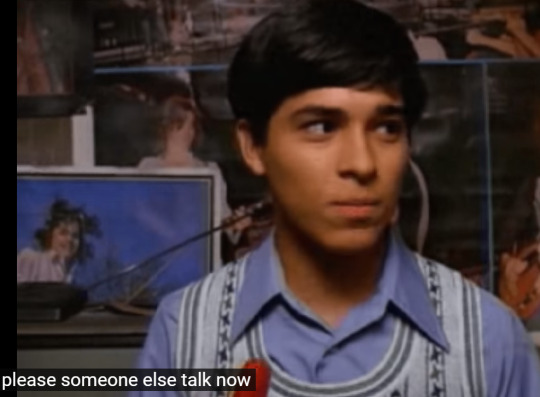
So he proves his love. in the most badass and horrifying way possible: BY MAKING ONE OF THE TWO BIG NOTICABLE CRATERS ON THE GODDAMN MOON.
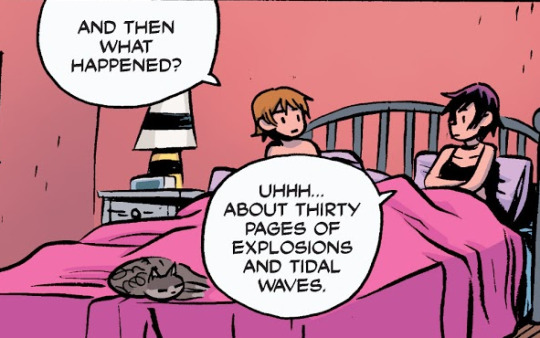
One of the series best jokes. Ramona also takes a hard pass to learning about envy and asks about Kim... not for any reason.. just thinks sh’es nice. It’s not like she wants to make out with her face.. a lot. Just.. girl things. SHUT UP. She’s also unsatisfied with Scott’s piss take version of his relationship with her.
Closing out the chapter, Knives.. has somehow climbed a huge pile of billboardsi n the middle of tornoto.. which would be awesome.. if it weren’t such a beautifully sad image.
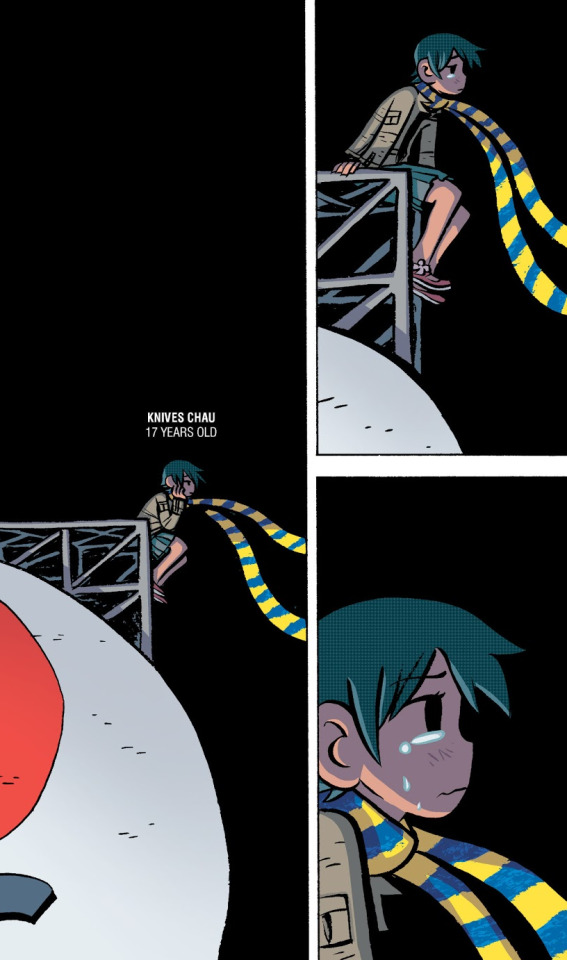
Whelp my heart just exploded with pain at this poor girl whose lost the love of her live, which is a goood thing mind you but dosen’t mean it dosen’t hurt less, her faviorte band and her highlights all in the span of a month.
Moving on as we approach the final act, we get a brief scene as Todd orders some Gelato, which is itallian icec ream, very not vegan and Envy does not relaize this. Todd however rants about being a rock star, being so above people and as for the rules
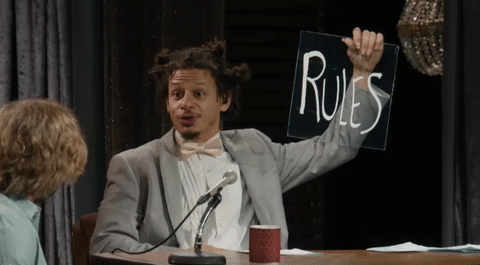
We also get this lovely bit

And then they make out and i’ts treated as a big shocker despite.. us.. finding that out several dozen pages ago. We know already.
Back at Scott and Wallace’s place, Ramona shows up with cool new blue hairdoo, which I agree with Wallace is awesome and admits she changes her hair up every couple of weeks.. someething that in the color version we do see better. We also get a gag that no longer makes sense as he asks if that’s her natural haircolor and she says yay and the caption admits this was funnier in black and white. Eh one or two jokes for some really pretty colors is a fair enough trade.
Scott however once again bitches about his hair, despite Ramona pointing out to him and Wallace that.. there’s like dozens of haircut places within walking distance. I remain unsuprised thier that oblivous. But to shut her boyfriend up she agrees to cut his hair and while they do asks what Envy’s actual name is.. scott’s response .. is pretty heartbreaking “Natalie. She stopped liking it. Then she stopped liking me.
So Scott shows up with his NEW HAIR CUT.. aka his old one just trimmed up a bit, but the one you see in modern merch and the game. A bit shaggy but not as long. Scott reassures Stephen whose spiraling with panic that it won’t be the same as last time and they’ll have fun. Kim, understandably and having not been told anything, wonders what “last time was”. After everyone chimes in Kid chamelon i’ts time for another FLASHBACK.. as you were probably expecting by now.. but this time I added some proper effects to spice it up.
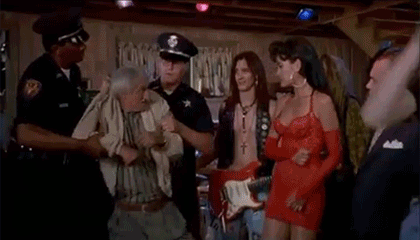
So we find out more of whta drove a wedge between the two: Envy slowly but surely took a tryanical death grip on the band, adding some guy named Joel on the drums, possibly the same guy from Crash and the Boys, and bumping Scott to bass, without asking him or Stephen about this and just sorta.. demanding it. While her intetnions are understandable, she just wants the band’s best sound.. her actions are still head tiltingly obnoxious, and clearly show she had not studied rock history yet as usually taking absolute control of the band and ignoring your band mates is the easiet way to destroy a band. Sometimes it’s just envy, pun unintneded but welcome, but yeah.. it’s no wonder they didn’t last. Scott is also shown to be more and more uncomfortable with the band going from a fun thing he did with his friend and girlfriend.. to something that could make him famous.. something he’s very transparently not ready for and dosen’t want. And it makes sense: he was just a dumb college kid in love.. he didn’t start the band for fame or glory.. he just wanted to have fun. Same with his current band. And while in the PRESENT his lack of ambition can be obnoxious and will be a problem in the next volume, here.. he’s still in college and sudeenly got thrust into a career he dosen’t want with a person who no longer loves or respects him. It’s understandable that he’s a nervous , miserable wreck.
So in the present, Stephen is throwing up and asking for julie and Scott.. is a dick and ignores him. Were it anyone else and any other relationship currrently int he books I would actually give a shit. So he wonders around a bit, running into some teens who are intrested in him, word travels fast apparently, Julie, who for once displays a human emotion of concern for Stephen or the closest she can, and thankfully Wallace, Stacey and Micheal,who now has a spooky skeleton ring from the future and badly needs his own spinoff. Stacey TRIES to pump her brother up.. but it’s clear he’s in no good mental place for that and trudges off while Wallace, man of the year, worries about him.
One GOOD THING about the astronomical setback that happened is in the orignal draft of this.. I forgot to talk about Stacey. Despite promising to. So here it goes: After this Stacey.. just sorta vanishes from the series. She’s still around and while not super promient gets a decent amount of screentime in the finale, she makes cameos before then. But from this book on she’s no longer a main character like she was in the first two books. There she had several scenes, lots of focus, and her own mini arc in the first one about Wallace stealing her boyfriends. There’s. an actual reason for this as O’Malley regretted naming her after his sister and thus basically stopped writing her unless he had to, sticking her in once in a while to assure fans he hadn’t forgotten her but removing her from the main plot.
That being said while his reason is weak.. I dn’t think it’s the ONLY reason she slid into the background. The main cast already had 6 characters, and on top of that this volume heavily focuses on Envy, the next adds Lisa Miller to the mix, and every volume frmo this one on has increased focus on the ex of the week, building them up more as characters and giving them way more screen time. Stacey.. really didn’t have a unique niche or roll in the sotry the other 5 non-scott leads didn’t: Knives filled out the position as the baby of Scott’s friend group, Ramona and Wallace served as better voices of reason, Kim and Wallace had better chemistry with Ramona and thus worked better as her friends, and Stpehn. did nothing she did but still at least had a part to play as band leader and the only one of Sex Bomb-Omb with ambition. Stacey is not a bd character and DID deserve to still be way more prominent.. but her move to the back let Kim take her place and rightfully so. And not just because of the crush on kim thing, Kim’s just more compelling and tha’ts an objective fact. Still would’ve been nice to learn more about Stacey though.
Scott then frees his girlfriend from a conversatoin with Sandra and Monique, as Julie bitchily told both about Gideon which Envy told her about, because as your every couple of paragraphs reminder, Julie is a piece of shit. Scott then orders them some alchols, breaking his usual teetotling and runs into kim, hollie and joseph. with Hollie here to see the band and .. Joseph here to see todd. At least h’es honest.. for this volume. Anyways, our happy couple soon split off for a bit and while we bounce back and forth.. i’m just going to cover what hapepned with each seperately as SOMEHOW tumblr once again ate a good hour’s worth of work, this review is already a day late, and I have both abother one and a dental apointment today. So in short
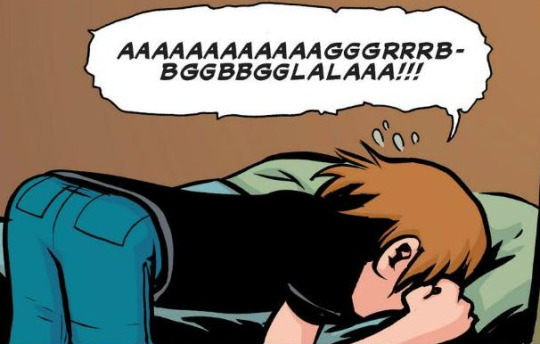
Ramona and Kim: Kim fills Ramona in on her past.. via tone down, seemingly contridctary, and as we’ll find out later the true version of what happened: She was with Simon, he was a dick, Scott showed up he was also a dick, things happened. I guess. Ramona is disapointed, though Kim does provide some crucial info on her moving to tronto.. and reuniting with scott.
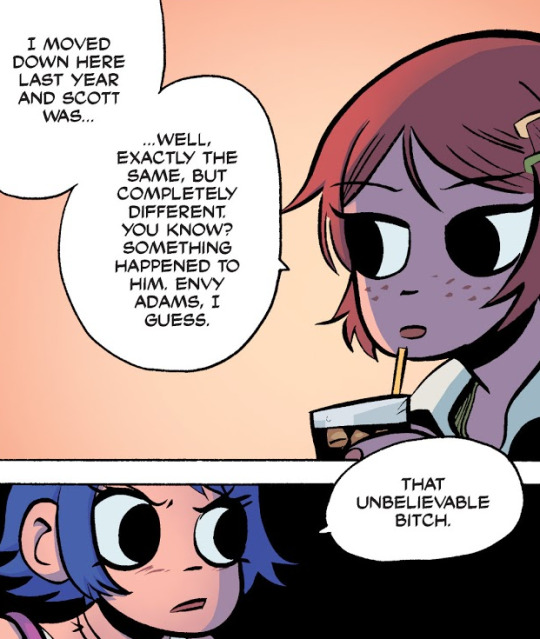
It honestly.. explains a LOT of why Scott is the way he is what happened with Envy. He saw Envy change entirley as a person.. and thus feels changing as a person , and smoking, is a sign of something bad.. when really it just means.. your changing. Sometimes for the better, sometimes for the worst but we area LWAYS changing and it took me a lont time to realize that. The two are distracted from this though by Todd sloppily making out with Lynette in front of everyone.
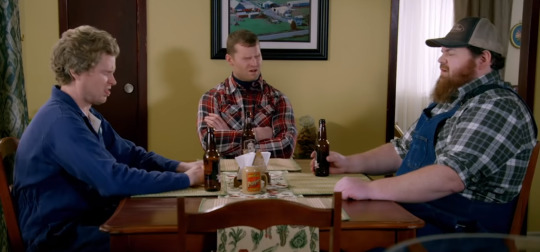
We’re also reintroduced to Crash and the Boys, now redubbed the boys and crash, and seemingly playing music without intsturments. The thorughly lovely and rediculous explinaton for this and their new gloves and goggles, i’ll save for in a bit.
Scott and Envy, Scott and Knives: Scott goes out to get some air.. only to find Envy, who despite menally tourturing him for a few days insits they talk like regular people.. Scott wisely counters with “Nat when did we ever talk like real people” and while saying he won’t get to call her that again, it still chips down her walls for a second and shows that a bit of who she used to be, loath as she is to admit it, is still there.
Scott then spots knives... and has a moment of truth. And a hell of a series of reaction panels
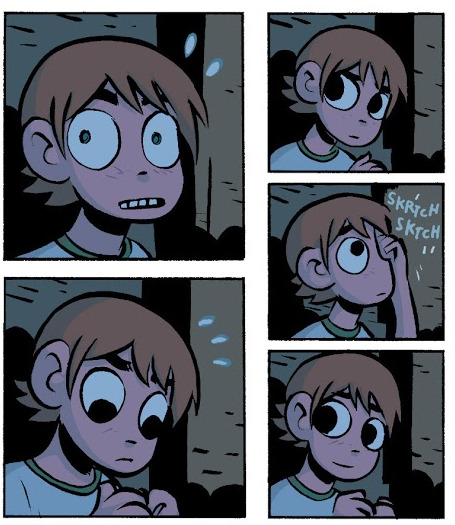
It’s a VERY good scene.. that i’ve written about TWICE now but regardless, it shows Scott.. genuinely changing. Ignoring his past actions, running away from them and trying to pretend he never fucked up once... that’s been his go to. It’s his main flaw and hte one that takes the entire series to deal with as we’ll get into. And it’s here.. he faces it for the first time. He’s scared of knives at first.. but realizes.. he genuinely hurt her, and she’s where she is, cold, alone, and huddled in an ally lost and confused, because of him. Sure Envy hurt her.. but so did he.. and what’s worse. he did it just like Envy hurt him. Not thinking of her as a persona nd throwing her away when he didn’t need her. And so after books of build up.. he finally takes some responisblity and talks to her. It’s WHY the books work: Sure scott’s a dick, and remains a bit of one throughout, but.. he means well, isn’t inteitonally a standoffish prick, and slowly grows PAST this, and tries to be better, for Ramona.. and just because it’s the right thing to do.
So Knives reflects on the past few weeks, admitting that it’s been unbearably painful.. but she can’t and won’t go back to who she used to be. She’s lost her innocnce and all that, been dumped by the “love of her life”, been punched in the face by her faviorite drummer and treated like dogshit by her faviorite artist. Todd did nothing for once but gets no credit because of who we’re dealing with here. Point is.. it was a lot and while sh’es not HAPPY.. she’s greatful for it. Scott however.. steps up, saying what Envy did was wrong, she deserved better.. and finally, after how terribly he broke up wit hher.. apologizes for how he hurt her. And while Knives takes this as hope they’l get back together, Scott continues to be very mature, especially for his usual behavior, telling her no, it won’t happen, to give neil a try as whle she is dating him because he looks like Scott he’s not all bad, and that wallce was right: she was too good for him. And while Knives isn’t ready to accept it.. Scott did the right thing. Good for you man.
So while he, and later kim and stephen seperatly, get ready, Ramona.. runs into Envy. Whose oddly nice for ahlf a second.. before bringing up Gideon and giving Ramona a barrage of insults, clearly trying ONCE AGAIN, to knock her down and wreck her. Thing is while Scott clearlya nd understandably has baggage with Envy is easy prey for her manipulative elephant dung, Ramona. isn’t. All Envy’s done is piss her off more and more with each act of high school level mean girl bullshit... and sh’es done with it.
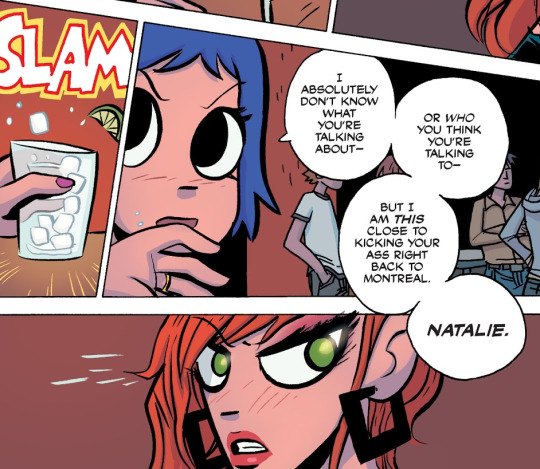
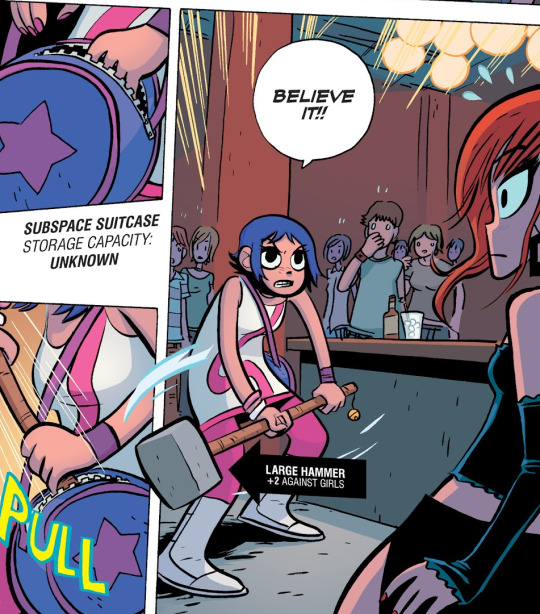
FIGHT’S ON. This Volume.. is honestly where Ramona really comes into bloom, pun intended, as the duetragonist of the books. While the book IS about Scott getting his life together and their relationship and he’s still her hero.. the books are also about RAMONA growing as a person, her own flaws and past, and the climax of all of them.. is just as much about her as it is scott. And this book has her own flaws come into play: Just like Scott she runs from the past, from who she was, and only faces it when needed, which will become more apparent as we go. But at the same time, we get to see far more of her personality as a result as her mysterious facade continues to drop. She’s prone to getting upset, but also clever and witty and knows her limits, knowing that going to that second performance would’ve just done no good and knowing herself very well, something Scott has genuine trouble with. She’s strong, sarcastic and knows who she is and what she wants and this volume finally brings that into focus. Not only that but her fight with Envy, is just as warranted, climatic and awesome as Scott’s fight coming up, as no one has stood up to envy due to her fame.. but Ramona.. dosen’t care. Someone’s gotta stop her, and Ramona’s taking up the job. And the awesome looking hammer.
That being said taking up a giant hammer against a beloved celebrity dosen’t win you any point, so Ramona finds herself discouraged, even if Envy can very clearly handle herself. Thankfully she gets some encouragment from exactly who you’d expect.
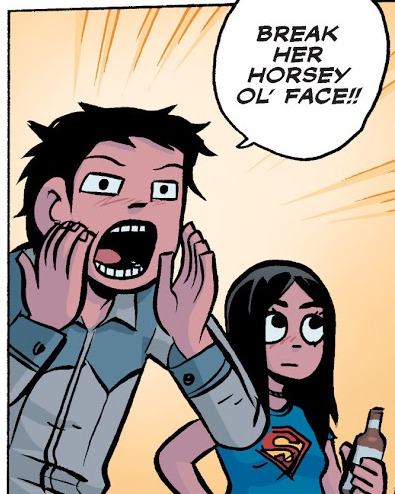
And Wallce.. turns out to be pretty useful. At least in this one fight. His shouting not only gives Ramona her fight back.. but keeps distracting envy, leaving her wide open. The tide turns though when Wallace has to pee, and Envy uses the distraction to knock the hamme rout of Raona’s hand and prepare to flatten her. But once again.. someone save sher in the knick of time.. and this time it’s the LAST person you’d expect, as Knives gives the hammer a flying kick.. and then crashes into a wall, and when Ramona, understandably not getting this since she tried to turn her into swiss cheese earlier this week, asks why, Knives admit’s she just wants Scott to be happy. Knives has grown too, and while she’s still obessed with Scott and waiting for themt o break up.. she’s no longer going to try and wedge her way in. If Ramona is what Scott wants, tha’ts what he gets.
All three are distracted by well.. this...
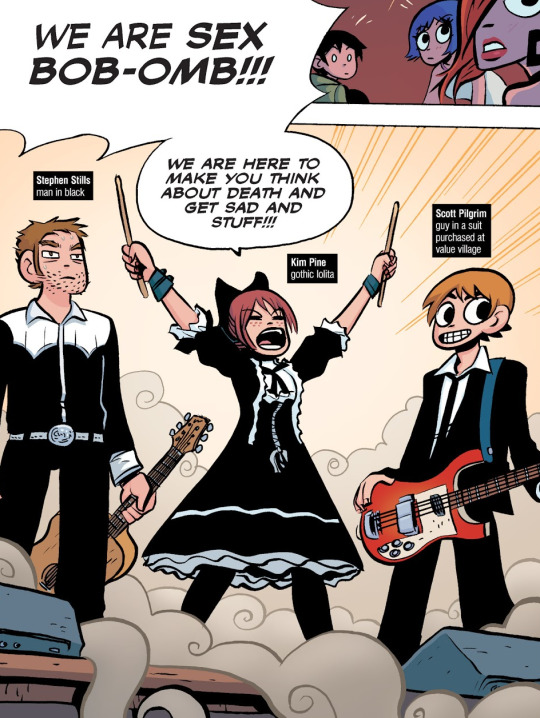
State of your outfits mates. Though that line is iconic. But serously the outfits are hilaroiusly and reaslitically mismatched. Kim’s home made and overdone gothica lolita outfit that dosen’t match her AT ALL, goth yes , poofy goth no. Stephen’s johnny cash outfit he clearly had lying around and Scott’s Dad Suit.
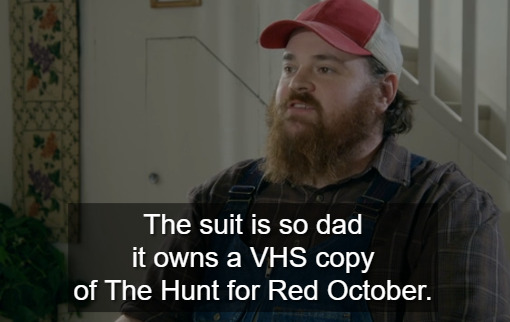
That being said.. still the best looking one of the three. But Envy takes advantage to regrab the hammer and try and murder the two of them.. but Scott sees this.. and well... you get it by now, one more time. Bake me away toys!

So we get the final weeks or days or whatever of the relationship. In a nice parallel to Scott playing Ramona a song he does the same for Envy.. who both questions what this is for then is confused why he’d do something so sweet. Next scene is her getting a call while their cuddling in bed from some guy she idntiefies as Jason and.. barely disguises is clearly cheating on Scott with. and could possibly be todd I dunno.
After that we get to Kid Chamelon preparing to sign a deal and Envy.. trying to press Scott into sginging it, ignoring his obvious discomfort, and then casually threanting to replace him. While Scott does give us a face punchingly dickish comment about “How he started this band to meet chicks and maybe he met the wrong chick”... he’s still somehow in the right as while he’s being a manic dickhead... Envy has ceased seeing him as a person or even something she cares about and tells him to get a hair cut and leave.
We then get the breakup itself as Scott goes up to envy.. and she tells him to get out of her life. ack in the present, Scott’s grown enough to realize he has to stop her and does so.. by touching hte back of her knee which.. uhhhh.
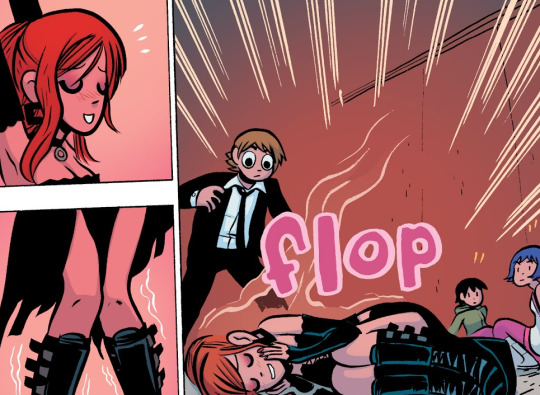
So yeah.. he beat her with an orgasm, and that looks oddly hot. And i’m moving on before that last part of the sentence sinks in. Envy, once she recovers, orders Todd to do a murder on them, but Todd’s not there and Ramona, naturally, brags about him having cheated on her. Envy.. denis.. this.
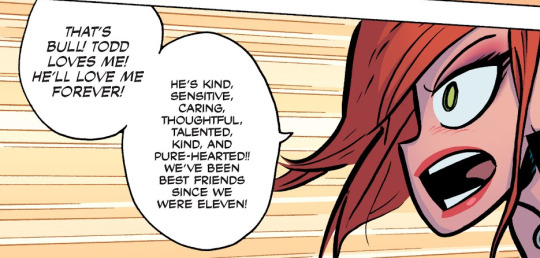
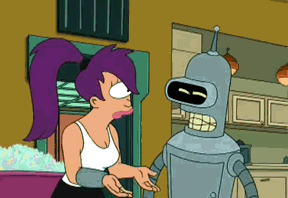
I .. don’t have time to unpack that. This review is late, I have two other reviews to get to today. Time for ANOTHER flashback.

This time it’s Envy teling a story bok verion of her and Toddd’s relationship. It’s a real poetic and well done sequence. In a nuthsell: Envy and Todd were best friends and deeply in love as kids until todd moved away i’m guessing sometime in middle school. Deeply depressed, Envy sailed through life as sort of a ghost, TRYING to find another connection like that, but failing. Todd returned after she graduated though, and gave her a symbol of his love.. a hole on the moon. Yes another one. And they both promised to never waiver as he went off to the vegan academy. Clearly Envy did with Scott... but it paints her ambition in another light. One where she wanted to be big and bold enough for him.. but slowly carved out her old self to do so.
And as is obvious it was pointlness: not only did Envy love someone else.. but Todd never cared as much as she did. As Ramona points out, and relcutnantly because even she feels a little bad about this one, he did the moon trick with her.. and this time Envy CAN’T deny it.. becaue the evidence is right there.
And of course Todd.. makes his case even WORSE by picking that moment to come out of the bathroom, sipping up his pants, with panties on his head, and with Lynette following right after him. Envy.. tries to murder Lynette, her go to, but LYnette teleports out. Because she can do that. Though Envy does hit her cyborg arm so she looes that and the panties and Ramona offers to mount it at her place if Kim takes the panties, but kim admits she wasn’t scrapbooking, she said she was and was just making the dress. Horay, as ramona puts it “Col se can still be friends. Right.. FRIENDS.

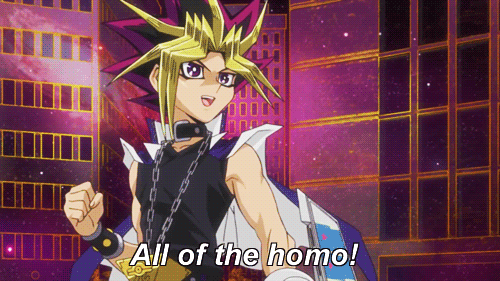
Envy TRIES to cave Todd’s skull in, get some therapy woman, but Todd naturally tk’s it away but despite being the king of all assholes DOES care enough not to fight her. Envy... plays nice then knees him in the nuts like he fucking deserves. Todd then returns to being the once and future douchebag by TK’ing her into the crowd and bragging about it.
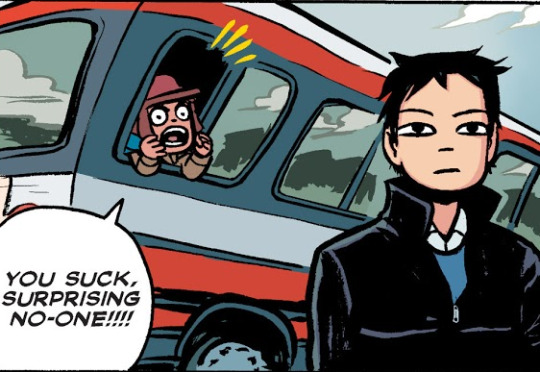
Scott dosen’t take this well, even after everything and the final fight begins. They have a bass fight.. but like the game i’ts redicuously one sided since Todd both is a skilled bassist compared to Scott.. and is still using his psychic powers lest you forget he’s a bastard man.
The Boys and Crash however show up to even the odds.. and their trainig is the reason they can play music without insturments as they can now manipulate pur sound. Fucking beautiful. But even they aren’t enough and Todd swats them aside.
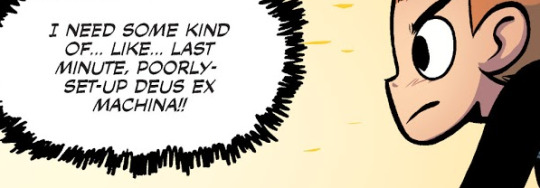
While poorly is a bit harsh.. the vegan police show up, which is awesome, though the movie got thomas jane for one of them and had that high five so they win. But yeah.. while this is hilarous.. and the scene with them is great.. it’s also the weakest part of an otherwise near perfect book. It just feels a bit anti clmatic that after all this build up.. Todd is just.. beaten with a sloppy depower. The boys and crash would’ve still been a cop out, but it would’ve been a freaking cool cop out. The thing that saves it is afterwords Scott still gets an epic finish: after they devganize him for the gelato earlier, scott headbutts him epicly and wins. He gets money and.
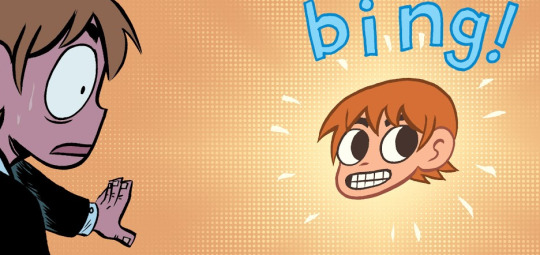
A 1-up, which understandibly terrfies him but will come in hand in a few volumes. Trust me. Scot checks on everyone. Ramona’s fine, Envy is not and breifly blames scott before he points out Todd was a no good cheating dickwad, and Kim is obviously fine as nothing happend, but him asking is a nice bit of charcter growth. Kim asks about kinves but she’s okay and neil is helping her. But theshow must go on and since the headliners are dead (don’t worry he’ll respawn), in parts unknown and in emotoinal apocalypse, someone’s gotta play.
So our heroes have the show of their lives, and crowd reaction is mostly positive with Jospeh noticing htier levels were horrible, a hint for next time, and the crew interviewing everyone.. including a mysterous gentleman having a beer, who has no commenta nd walks away.
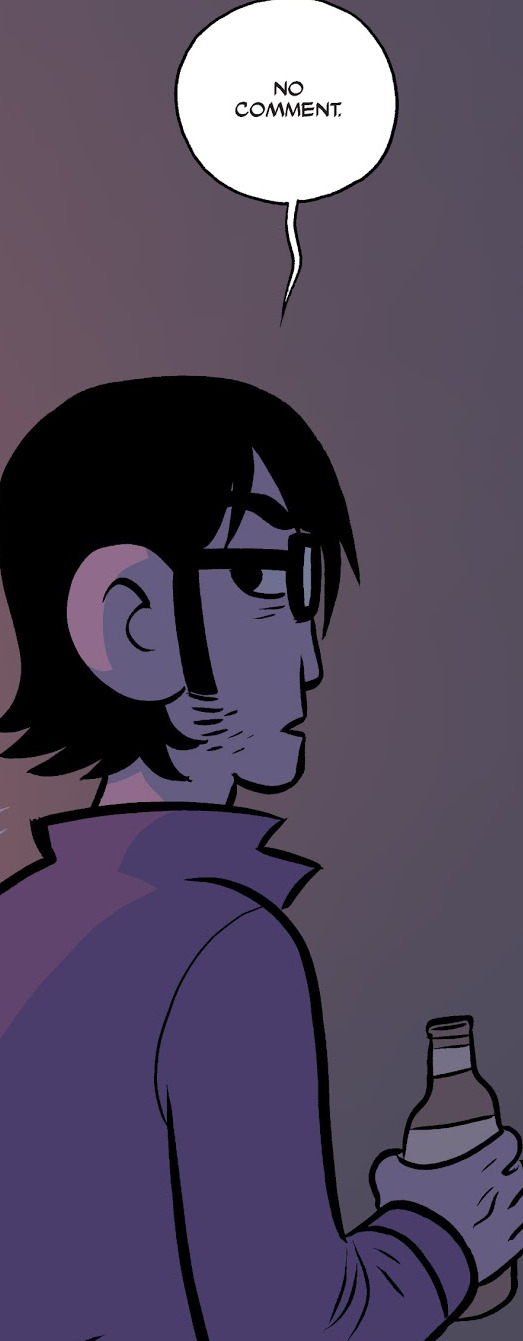
Gideon.. was here the whole time,but he’s not ready for Scott JUST yet. Still a really damn cool tease for the final boss.
So we close the next day, Scott and Envy sorta make up, with both apologizing for their behavor and while Scott gets no closure, envy promises to return.. and makes good on it. But.. that’s for the finale. For now Scott’s girlfriend and best buddy give him a moment to baste in his pathos, before heading off. And in a nice bit of metaphor, the clouds part, and our three amigos walk off into the sunset and a bright future. Three down 4 to go.
Next time: Lesbian Artist Ninjas! Side Stories! Scott Gets A Job! The Band gets a producer! Kim gets a decent apartment and a boyfriend! Lisa returns! See you in feburary.
Until then if you liked this review, spread it around andi f ther’es a comic you want me to cover, my comissions are open. Until the next rainbow, it was a pleasure.
#scott pilgrim#scott pilgrim and the infinite sadness#ramona flowers#wallace wells#kim pine#stephen stiles#neil nordgraf#envy adams#todd ingram#lynette gycott#julie powers#other scott#monique#sandra#college#comics#Brian Lee O'malley#oni press
27 notes
·
View notes
Text
Missives of Appalling Idiocy and Envy Embarrassing to Behold
So many messages of the type alluded to by the title of this article crossed my desk in the last fortnight that I found myself in the rare position of having too much content to easily record and communicate with pen and paper—a writer’s dream, if that content did not also simultaneously indicate both the tolling of the proverbial bell, and the fact that I am one of those for whom the death knell sounds.
I have observed the colleges and universities of the Western world devour themselves in a myriad of fatal errors over the last two decades, and take little pleasure in seeing what I knew was inevitably coming manifest itself in an increasingly comprehensive manner. It is of course a self-destructive and unfortunate tendency of human reason, with all its limitations—as well as ego, with all its pretensions—to wish or otherwise agree to serve as Cassandra, and to derive a certain satisfaction in watching the ship whose demise was foretold breach its hull on rocks hidden from all other observers. The self-righteous pleasure of “I told you so,” is, however, of little comfort when the icy water wends its way around ankle, knee and thigh, threatening to swamp everything still retaining its incalculable and unlikely value, even if it simultaneously makes short shrift of the ignorance and willful blindness that is frequently part and parcel of the death of something once great.
It is also necessary to note that the catastrophic failures of process and aim which I am about to relate were by no means hidden from the public view by the persons and institutions in question. They were instead positively trumpeted to all by multiple attempts to harness the powers of social media and announced, more traditionally, in press releases designed to indicate the success of some great and laudable moral striving. It is nothing less than a dire day when the proud revelation of vices of deadly and multifarious seriousness serve to substitute for announcements of genuine and valuable achievement, but that is where we are at—make no mistake about it.
The first story emerges at Brock University, in combination with the scientific journal Angewandte Chemie—the former an educational institution of moderate reputability; the latter a prestigious place of scientific publication among chemists. It is no easy matter to find a permanent tenured faculty position at such a university, or to publish research findings or literature reviews/summaries in a peer-reviewed scientific journal. The process generally requires several years and multiple resubmissions and rounds of editing by a minimum of three colleagues per submission with expertise in the field as well as approval by the editor. Angewandte has a rejection rate of 80%—and it should be noted that that rejection rate only takes into account papers that the submitting researcher felt were of sufficient quality to be considered by a journal of high standards. Dr. Tomas Hudlicky of Brock submitted an essay memorializing and updating a piece written thirty years ago, which has been widely recognized as powerfully influencing the direction of the chemistry subfield in question (organic synthesis).
Now, the first thing that must be understood about Dr. Hudlicky is that he holds a prestigious Canada Research Chair, a position funded by part of a large federal initiative devoting approximately 300 million dollars per year in the attempt to attract to Canada (or to encourage to stay in Canada) researchers who are of particular promise, as evidenced most fundamentally by their research productivity. That promise or productivity, in turn, can be measured with reasonable accuracy with metrics such as number of peer-reviewed articles in relevant scientific journals (more than 400 in Hudlicky’s case), by noting how many times such articles are cited by other authors over the years subsequent to publication (Hudlicky: 13300) and, finally, by a metric known as the h-index, which provides a measure of how many publications have received a variable minimum number of citations (and which therefore combines in a single number some information about publications per se and some about citations). A researcher with an h-index of 10 has published 10 papers with 10 or more citations; a researcher with an h-index of 57 (Hudlicky’s score) has published 57 papers with 57 or more citations. Hudlicky’s research productivity is admirable and rare. The mere fact that he was hired as a Canada Research Chair meant that his department, as well as the federal governmental agency tasked with funding the attraction or retention of extreme talent, both determined in the relatively recent past that he was a fish well worth landing. Something about this needs to be clarified: the universities that hire those researchers competent enough to be competitive in a Canada Research Chair competition are not doing them a favor by offering them a position; rather, it is an honor for the university (and the students, both undergraduate and graduate, that attend the institution) to be chosen by the researcher in question. No serious academic disputes this, although some may quibble about the precise metrics used for identification of the serious talent. This is particularly true of an institution such as Brock, which is an university of reasonable but not exceptional quality, and which genuinely needs highly productive faculty members to help it ratchet itself up the very competitive academic ladder.
Hudlicky’s paper in Angewandte Chemie was peer-reviewed positively, judged as desirable by the relevant editorial staff, and published. This meant that it managed the difficult job of passing through the eye of a needle, and entering the kingdom of heaven, at least as far as research chemists might be concerned. But some of Dr. Hudlicky’s surmises with regard to the discipline of organic synthesis raised the ire of a Twitter mob (https://twitter.com/fxcoudert/status/1268920299833233416?s=20). This is not a difficult feat, in my opinion, as Twitter seems to exist primarily for the purpose of generating mobs—composed primarily of individuals who are hungry for the opportunity to taste blood and bask in the joys of reasonably risk-free reputation destruction, revenge and self-righteousness. Furthermore, as far as Twitter mobs go, those who complained about the Angewandte Chemie publication were not particularly numerous. No matter: once the complaints emerged, the editor of the journal in charge of Dr. Hudlicky’s work—one Dr. Neville Compton—removed the paper from the journal’s website, and offered an abject apology for daring to have published it in the first place. Furthermore, he reported the “suspension” of two of the journal’s editors (indicating precisely how much trust those individuals should have placed initially in his judgement) and cast aspersions on Hudlicky’s ethics, stating that his essay did not properly reflect fairness, trustworthiness and social awareness, while implying that the now-pilloried author and his peer reviewers and editors were discriminatory, unjust and inequitable in practice. It should be noted, by the way, that the position of editor for a scientific journal is general one filled by volunteers, who donate their time for the greater good of the scientific enterprise, rather than for any monetary gain. So Compton fired generous volunteers to ensure that his good name would not be irredeemably sullied by any association with the now-demonized professor Hudlicky and his ne’er-do-well compatriots (none of whom likely knew each other except in passing).
What was Hudlicky’s sin? His 12-page document (approximating 4000 words) dealt with issues he believed were affecting organic synthesis research and communication, and covered topics such as the range of research options available, integrity and trustworthiness of the relevant literature, transference of skills from mentor to trainee, impact of information technology, the corporatization of the university environment, the effect of new technology, the diversity of the available work force, and the competition for resources among researchers—all topics that people of putative good will and competence (such as the author and his reviewers and editors) could agree had a demonstrable effect on the quality of research currently conducted. However, Hudlicky voiced a smattering of opinions that were deemed unacceptable by a small number of people who both read his submission and were somewhat active on Twitter. Here are the sentences constituting his sins, which fall into two of the categories Hudlicky identified as relevant for analysis of research productivity. I have paraphrased them very slightly for length:
Under Diversity of Workforce: “In the last two decades many groups have been designated with “preferential status” (despite substantive increases in the recruitment of women and minorities). Preferential treatment of one group leads inexorably to disadvantages for another. Each candidate should have an equal opportunity to secure a position, regardless of personal identification/ categorization. Hiring practices that aim at equality of outcome is counter-productive if it results in discrimination against the most meritorious candidates. Such practice has also led to the emergence of mandatory “training workshops” on gender equity, inclusion, diversity, and discrimination.”
So those apparently objectional words constitute 90 of 4000—a small proportion of the total content of the essay, and the proffering of an opinion that insists “if”: not that diversity, inclusivity and equality provisions necessarily produce prejudicial hiring practices (although the research evidence suggests that they clearly do [1])) then they may have a detrimental effect on research productivity. It is also important to note that these opinions paraphrase very closely a decision reached and publicized by a German court in 2007, at least according to a supporter of Hudlicky who dared express an opinion supporting his colleague.
The Twitter mob trolls who objected to this opinion reacted as if what Dr. Hudlicky said was that efforts to “diversify” hiring and student selection were definitively harmful, while what he truly did was only raise the possibilities that such actions could become counterproductive if they resulted in the exclusion of qualified candidates. No one can object to this opinion, reasonably—unless they assume, as did Hudlicky’s critics, that all claims to objectivity in hiring and selection are inextricably bound up with the systemic prejudice hypothetically characterizing all hierarchies of specialization.
Under Transference of Skills: “The training and mentoring of new generations of professionals must be attended to by proper relationships of “masters and apprentices” without dilution of standards. Hudlicky described two conditions under which the successful transfer of skills can occur: first, if the skill is not transferred within three generations, it is lost forever, and second, there must be “an unconditional submission of the apprentice to his/her master.” This applies not only in the sciences but also in art, music, and martial arts…. Submission to one’s mentor is rarely attainable today. Many students are unwilling to submit to any level of hard work demanded by professors. The university does not support professors in this endeavor as it views students as financial assets and hence protects them from any undue hardships that may be demanded by the “masters.” This situation, coupled with the fact that professors have less and less time to mentor students in the laboratory, cannot provide for a productive transfer of skills, especially the maintenance of standards and integrity of research.”
This is an additional 170 words/4000, and paraphrases an opinion most famously put forward by Michael Polanyi, a Hungarian-English polymath of genius level, who made contributions to chemistry, philosophy and economics, and who delineated the importance of “tacit knowledge” (that is, knowledge that was acted out but not necessarily articulated) in the transmission of specialized technical ability across the generations. Hudlicky was therefore criticized and pilloried by individuals on Twitter who appeared to know nothing of M. Polanyi’s work on tacit knowledge (for whom such ignorance was perhaps justifiable) but also by the editor of Angewandte, for whom such ignorance (voluntary or otherwise) was most certainly not. Acquisition of this knowledge required precisely the unfreedom recommended by Hudlicky—followed, of course (with the acquisition of the aptly named Master’s degree) by autonomy in thought and action that was increased beyond what it would have been capable of achieving without the devoted apprenticeship in question. Such a process can only be undertaken by a pupil capable of regarding his or her teacher as a true mentor, and by a mentor bent on producing a pupil more capable than him or herself, after an intensive period of training. None of that, according to Hudlicky (and this is not obviously an unreasonable hypothesis in this day of age) is possible in the university as it is currently constituted, even in the departments that still teach hard sciences. Not only is it not possible, he implies, but it is no longer posited even as an acceptable possibility. In a properly functioning institute of training, however, it might be argued that disciplined and contractually-mediated temporary subjugation to higher authority is eminently desirable, despite the limited sacrifice of casual autonomy that might require, if the person or persons to whom the subjugation is made are true experts. It is the willingness to undertake this apprenticeship, as well as the capability of superseding it, that makes up the master in “Master’s degree”—a designation that I notice Brock still grants, despite potentially colonial overtones at least as damning as those that characterized Hudlicky’s writing (if we are going to go down that absurd route).
That is the sum total of Hudlicky’s academic crimes. He has faced severe retaliation on no less than seven separate fronts for his hypothetically unforgivable thoughts—the two we have already discussed, and five more, including, third, the cancelation of an entire issue of the journal Synthesis (published by Thieme), which was to be dedicated to his 70th birthday and for which invitations had already been sent to more than forty prominent scientists; fourth, the elimination of any mention of his work in yet another journal, Highlights in Chemistry; fifth, a statement by the Norwegian Chemical Society (not as of yet made public) hypothetically critiquing his ongoing collaborations with three Norwegian researchers; and sixth, his transformation into whipping boy by his own faithless professional colleagues at the administrative level at Brock University. Dr. Greg Finn, Provost and VP Academic at that institution, saw nothing wrong with stabbing one of his university’s most esteemed scientists in the back at the first sign of trouble. The provost wrote a painfully cringing apologetic “open letter to the public,” claiming, of course, that Hudlicky’s opinions, if in the least controversial, were in no possible manner representative of Brock University as a whole, and essentially hanging that institution’s hypothetically valued top chemist out to dry. Finn states that Hudlicky’s article “…contains descriptions of the graduate supervisor-graduate student relationship that connote disrespect and subservience. These statements could be alarming to students and others who have the reasonable expectation of respectful and supportive mentorship…. [The statements in this paper] do not reflect the principles of inclusivity, diversity and equity included in the University’s mission, vision and values as approved by our Senate and Board of Trustees.” Only an individual accustomed to dining on very thin gruel or simply spoiled meat would find any nourishment in statements with such content and of that quality.
An admirable university, secure in its worth, would have determined very quickly that one Dr. Hudlicky was, conservatively, worth a hundred Dr. Finn’s, and acted accordingly. But research prowess is no longer as important as willingness to mouth the appalling commonplaces of political correctness in the hallowed corridors of academe. And what that essentially means is that resentful and underqualified pretenders to the role of useful intellectual can now exercise the upper hand in apparent scientific worthiness, so far as it has been reduced to a simple political power game. And the list of consequences for Dr. Hudlicky I have outlined so far does not by any means exhaust the description of his punishment. He is (was (?)) apparently a scientist of sufficient merit, as his Canada Research Chair should have clearly and decisively indicated, to have had an entire upcoming issue of another journal, Synthesis, devoted to a retrospective of his work, complete with invited commentary—and now the existence of that tribute has become highly doubtful.
Three other events worth of note that came to my attention over the last two weeks, when I have been communicating with academics concerned with this sequence of happenings, drive these points home. A highly cited professor of physics, who I cannot name, at a university I cannot name either (suffice it to say that the former has garnered 100+ publications and 7000+ citations in a highly technical field) had his standard Canadian Federal grant application rejected because (or so the reviewers claimed) he had not sufficiently detailed his plans to ensure diversity, inclusivity and equity (DIE) practices while conducting his scientific inquiry. It is now standard practice for university hiring boards to insist that their faculty job applicants submit a DIE plan with their curriculum vitae—a terribly dangerous occurrence of its own. I believe that the fundamental reason such plans are required, particularly of those who practice in the so-called “hard” STEM fields (science, technology, engineering and mathematics) is so that those who could not hope to assess the quality of research endeavours in those specialties as a consequence of their own ability or prowess, can be made into judges by enforcing the adoption of standards of attitude and behavior that have nothing to do with the fields in question. I am no arithmetical genius, for example, myself. It is almost certain that a Master’s degree, to say nothing of a Ph.D. or professorship in mathematics, would have been beyond me, even in my younger years, when such talent is most likely to manifest itself. I would never dream of attempting to review a grant application in a specialized subfield of chemistry, engineering or physics—even of biology, which is nearer my bailiwick. But if it became possible to adopt the position of judge because of my colleagues’ attitude toward student selection and staffing, then—presto! Those who are applying for such funding are no longer painfully more intelligent than me. They are merely and reprehensibly in error in their basic political opinions. There is nothing but victory in that for me, in precise proportion to my degree of resentment for my unfortunate and rather incurable stupidity.
Consider, in addition, the current landing page for the Department of Physics at McGill University. It is difficult to provide a purely objective analysis of the significance of the different elements of this page, at least concerning their relative size or prominence (and, therefore, their implicit importance), because there is wide variation in resolution of the various screens that users may employ to access it. Suffice it to say, however, that at a resolution of 2048 by 1536, which is higher than average (and therefore allows more of the available visual content to be presented to the viewer simultaneously) the second-most visually evident active link is the “McGill Physics Community Statement Against Racism”—and, if this is not sufficient proof of the upstanding moral quality of that “community” there is also an active link to an “Equity Diversity and Inclusion” page in the center of the main menu bar of the page.
It does not seem merely picayune to note (1) that the proper role of such a page is to convey information pertaining to physics to those who might be applying to that department at McGill and not about the political or sociological attitudes of its faculty, administrators and students. It is also perhaps not out of place (2) to voice a certain skepticism with regard to the timing of this oh-so-very-properly-moral statement and note that if it required the unfortunate death of one George Floyd to motivate its appearance it is either inexcusably opportunistic or a classic case of closing the barn door once the cattle had already made their disappearance. To make it even clearer, if that is necessary: if the McGill physics community is so unrepentantly racist that it required someone’s death to draw its existence to the surface, a mere banner statement is by no means sufficient atonement. If it is not racist to that notable extreme, then mere humility might have led to the conclusion that now was not the appropriate time to trumpet the assumption of moral superiority necessary to formulate the anti-racist and pro-diversity claims that are being made, front and center, regardless of the fact that this page exists to provide information about physics and not sociology at the august institution of McGill University.
I would also like to point out, just for the sake of completeness, that the two rather egregious moral errors in page construction do not constitute the entire universe of deception characterizing the page. It is apparent that the McGill Physics Department has decided that live classes of the classic sort are unlikely to take place in the fall of 2020 and is now offering its students (who are certainly being regarded as far stupider than most of the physics majors I have met) the opportunity to “implement modern, evidence-based teaching techniques & technologies” and the “unprecedented chance for students to shape their own education, and how science is taught at McGill.” Clearly, what might appear to the uneducated observer as somewhat of a catastrophe for new undergraduate attendees at McGill (that is, the impossibility of attending live university classes) is actually—as those in the know clearly realize—a new and special opportunity for them to be educated in an even finer manner than those who were unfortunate enough to embark upon their education before the blessing of the COVID-19 virus. I mention this only to point out that virtually nothing presented as content on this departmental page, political or not, has escaped the spirit of deception that is arguably its central and most appalling feature, whether it is political (as in the case of objection 1 and 2) and designed to signal a particular brand of ideological morality, or a consequence of third-rate marketing tactics (objection 3), which are more simply characterized as lies.
And, in case you are not convinced by the stories I just told, which do lack somewhat for detail, because of the current necessity for confidentiality, consider this: a group of three professors at Concordia were awarded a New Frontiers in Research Grant (announced in late 2019) aimed at “engaging Indigenous understanding and involving Indigenous communities in the co-creation of knowledge, the project aims to decolonize contemporary physics research and attract Indigenous students.” The head researcher, one Dr. Tanja Tajmel, “questioned the colonial assumptions made in the way Western science evaluates light and what it considers knowledge.” Dr. Louellyn White, associate professor in First Peoples Studies, added that “Indigenous ways of knowing have been suppressed and marginalized throughout academic history and we are finally gaining momentum in elevating Indigenous knowledges as equally valid to Western science… If we, as an institution, do not embody the Territorial Acknowledgement by recognizing and affirming the expertise of our Elders as Knowledge Keepers, the acknowledgement becomes nothing but empty platitudes.” Dr. Ingo Salzmann, the last of the three principal investigators to whom the funds were awarded, says, ““The culture of physics certainly changes with diverse people involved,” he argues. “Therefore, decolonizing science involves challenging the underlying hierarchies.”
The refusal of the research grant application specifically requesting funding for what must now apparently be regarded as “colonialized (or colonized (?) physics” and the success of the application that had the magical mention of “indigenous knowledge” should alert those who know of both and who are attending to the increasing politicization of the university that the STEM fields comprise the next frontier for the politically correct. Qualified and expert researchers in such fields are already in great danger of being pushed aside by politically correct activists who will happily and self-righteously displace them by merely refusing to admit to the existence of anything approximating an objective truth against which claims to competence might be assessed. The rest of us will pay in the longer run, when we no longer have the will or the capacity to make use of the rare talents that make people highly competent and productive as scientists, technological innovators, engineers or mathematicians.
We might also note that the politically-correct micro-tyrants beating the drum for diversity, inclusivity and equity are pursuing two goals which exist in logical contradiction to one another. Those who occupy a field like physics can only be racists if the fundamental claims to transcendental or ontological truth of that discipline are accepted: if physics describes the world, in a manner that is objectively true, then it is possible for whatever group that currently holds positions of power in that discipline to be prejudiced, perhaps by sex or race, and exclude qualified individuals who differ unacceptably along those dimensions to suffer unfair exclusion. But to make this case requires acceptance of the idea of the universality of the truth being pursued. Alternatively, there are multiple valuable forms of physics, shall we say, indicating that multicultural approaches are required—but the absence of those multiple forms are not so much racist as opportunistic or even merely isolated from the larger world (as each individual group can only be expected to pursue its values in an environment where there is no objective truth, but only group values). Which is it? The answer is quite simple: either, or both—depending on where the largest degree of guilt can be attributed. Convenient as this might be, it is not a good long-term solution to the problem: the internal contradictions inherent in such claims will results in within-group deterioration of solidarity in very short order. If classic physics is nothing but Eurocentric power-maneuvering, who cares if non-Caucasians are excluded? They are perfectly free to pursue their own power-centered physics. If there is an objective reality to that physics, then it is possible, at least in principle, to use objective tests of competence to rank-order candidates, and the problem of potential discrimination vanishes, at least to the degree that is possible.
I have suspected for years that the STEM fields posed the most dangerous threat possible to the unopposed dominance of politically correct sociological idiocy over the entirety of the university environment, basing their claim to validity on recognition of something approximating a universally accessible objective reality. That claim is too powerful to go unchallenged in today’s climate of moral self-flagellating among those, particularly common in the ranks of university administrators, who want all the advantages of the power high-ranking hierarchical positions provide, but none of the hypothetical moral baggage that are part and parcel of the prejudicial and patriarchal structure that gave rise to those positions. The proper solution? Continual apology for the sins of others who occupy equivalent or superior positions, conjoined with a willingness to damage the reputation of those miscreants, and to force them into an apologetic stance—or even to apologize for their own unearned privilege, as long as that does not result in any true sacrifice of power, income or authority. This is particular evident, in the stories I have related, in the case of the Brock University Provost.
The George Floyd incident has emboldened those who are shamelessly using crooked faux-moral means to stake a moral claim in the so-called patriarchal structure that makes up the academic world. They are certainly able and willing to use the unfortunate death of an individual who had enough of the attributes of a systemically oppressed person to serve as poster boy for the self-serving political claims that are now being made on his behalf. This tendency, unchecked, poses a direct danger to the integrity of precisely those STEM fields that have so far remained essentially immune to the embarrassments and blandishments of the politically correct movement. But, make no mistake about it, scientists, technologists, engineers and mathematicians: your famous immunity to political concerns will not protect you against what is coming fast over the next five or so years: wake up, pay attention, or perish, along with your legacy. Whatever you might offer the broader culture in terms of general value will be swept aside with little caution by those who regard the very axioms of your field as intolerable truly because of the difficulty in comprehending them and considered publicly as unacceptably exclusionary, unitary and unconcerned with sociological “realities.”
Jordan Peterson, June 16, 2020, https://www.jordanbpeterson.com/political-correctness/the-missive/
1 note
·
View note
Text
The G-spot doesn’t exist
There is no magic button. We’re here to correct the record—and to apologize.
Once upon a time, that time being 1982, there was sex. And then, suddenly, there was sex.
The difference? A teensy half-inch ribbed nub on the upper front wall of your vagina. Scientists—and magazines (hi) and books and sex-toy companies and movies and TV shows and your roommates and your sex-ed teacher—reported that it was a universal key to The Mysterious Female Orgasm. And thus began the era when you were supposed to be able to say “it blew my mind” to your girlfriends at brunch.
Or was it three inches wide? Farther down, near your vulva? Slick instead of ribbed? Kinda springy to the touch?
Whatever, it was it. And fuck if we all didn’t work hard to find our own. Back in 1982, Cosmo told women to get there by “squatting” so it would be easier “to stick one or two fingers inside the vagina” and make the necessary “come-hither motion.” A 2020 Google search turns up thousands of road maps (“where is the G-spot?” has been searched more times than Michaels Jordan and Jackson). That cute-adjacent guy you slept with in college tried the classic pile-drive maneuver, to middling success.
🩸THE G-SPOT IS ALLEGEDLY…
🩸🩸“One inch in.”
🩸🩸🩸“Three inches in.”
🩸🩸🩸🩸“Barely in.”
🩸🩸🩸🩸🩸“Near my cervix.”
🩸🩸🩸🩸🩸🩸“The roof of my uterus.”
🩸🩸🩸🩸🩸🩸🩸“The back right of my vagina.”
🩸🩸🩸🩸🩸🩸🩸🩸“In a little pocket of space up near my belly button.”🩸
But it must not matter, because the G-spot economy is booming: G-spot vibrators, G-spot condoms, G-spot lube, G-spot workshops, and, for the particularly daring and/or Goop-inspired, $1,800 G-spot shots meant to plump yours for extra pleasure.
Hell, even Merriam-Webster is in on it: The G-spot is a “highly erogenous mass of tissue” in every dictionary it prints.
So then why, when we talked to the woman who helped “discover” it, did she tell us we’ve all been obsessed with the wrong thing?
THAT WOMAN IS BEVERLY WHIPPLE, PHD. SHE AND A TEAM of researchers officially coined the term “G-spot” in the early ’80s. They named the thing, which they described as a “sensitive” “small bean,” for German researcher Ernst Gräfenberg (yeah, a dude). And just like that, your most frustrating fake body part was born.
Honestly, it all got out of hand from there, says Whipple. Her team wasn’t saying that each and every woman has a G-spot. (“Women are capable of experiencing sexual pleasure many different ways,” she insists to Cosmo now. “Everyone is unique.”) And despite that bean analogy, they didn’t mean it was a spot spot. They were talking about an “area” that could simply make some women feel good. But the media (hi again!) preferred the neat and tidy version and ran with it like a sexual cure-all.
Researchers did too. In 2012, a study published in The Journal of Sexual Medicine proclaimed that of course the G-spot was real. It just wasn’t a bean. It was actually an 8.1- by 3.6-millimeter “rope-like” piece of anatomy, a “blue” and “grape-like” sac. This revelation came from gynecologic surgeon Adam Ostrzenski, MD, PhD, after his study of an 83-year-old woman’s cadaver. (He went on to sell “G-spotplasty” treatments to women.) Over the years, lots of other researchers found the G-spot to be lots of other things: “a thick patch of nerves,” “the urethral sponge,” “a gland,” “a bunch of nerves.”
For the most part, though, the thing that women were supposed to find has remained a mystery to the experts telling them to find it. Dozens of trials used surveys, pathologic specimens, imaging, and biochemical markers to try to pinpoint the elusive G-spot once and for all.
In 2006, a biopsy of women’s vaginas turned up nothing.
In 2012, a group of doctors reviewed every single piece of known data on record and found no proof that the G-spot exists.
In 2017, in the most recent and largest postmortem study to date done on 13 cadavers, researchers looked again: still nothing.
🩸🩸THE G-SPOT IS ALLEGEDLY…
“Really deep in there, not close to the opening of my vagina at all.”
“IDK.”
“My clitoris.”
“By my butt.”
“Behind the clitoris.”
“Right inside my vagina and to the left.”
“In different places.”🩸🩸
“It’s not like pushing an elevator button or a light switch,” asserts Barry Komisaruk, PhD, a neuroscientist at Rutgers University. “It’s not a single thing.”
“I don’t think we have any evidence that the G-spot is a spot or a structure,” says Nicole Prause, PhD, a neuroscientist who studies orgasms and sexual arousal. “I’ve never understood why it was interpreted as some new sexual organ. You can’t standardize a vagina—there is no consistency across women as to where exactly we experience pleasure.”
Sure, she says, some women might have an area inside their vaginas that contains a bunch of smaller, super-sensitive areas. But some women say that when they follow Cosmo’s old two-finger come-hither advice, they feel discomfort or like they have to pee. Others feel nothing at all. Because for them, there’s nothing there.
NOW FOR THE TRICKIEST PART OF this story—and, TBH, the reason this is even a story at all. Despite the lack of scientific evidence, there are still lots of G-spot believers, many of them super-smart, well-meaning sex educators. They’re a pretty heated group (one hung up on us when we called for an interview) and not...entirely...wrong. Their point is: If a woman believes she’s found her G-spot, that should outweigh any lack of science. And specifically, if someone claims to have experienced G-spot pleasure, it seems “bizarre” to shut her down, says Kristen Mark, PhD, a sex educator at the University of Kentucky. “That feels like going backward.”
Fair. It’s just that, as Prause points out, “women deserve accurate information about their bodies.” Can’t we have our pleasure—and the truth too?
As Prause said (and this bears repeating), for some women, there is sexual sensitivity where the G-spot is supposed to be. But for others, there’s none. Or it’s to the left. Or it’s in a few places. And that’s kind of the whole point. It’s all okay. It can all feel good.
What everyone can agree on is that we need more research. Women’s sexual health is vastly understudied, and the scientific hurdles are borderline absurd. In 2015, Prause tried to get a trial going at UCLA that would study orgasms in women who were, you know, actually alive. The board heard her out but wanted a promise that her test subjects “wouldn’t climax” because they didn’t like the optics of women orgasming in their labs. (As you’ve already guessed, the study wasn’t approved.)
So yeah, a new kind of thinking about female pleasure is going to take a minute for certain people to get on board with. Like those brunch friends who go on and on about G-spot rapture. And like men, who might love the idea of the G-spot best of all. A G-spot orgasm requires penetration, which just so happens to be the way most guys prefer to get off. “If you’ve got a penis, it would be super convenient if the way the person with a vagina has pleasure is for you to put your penis in their vagina,” says Emily Nagoski, PhD, author of Come as You Are, a book that explores the science of female sexuality. Related: 80 percent of the men in Cosmo’s survey said they believe every woman has a G-spot; nearly 60 percent called it the “best way” for a female partner to achieve pleasure. (“Once you rally enough experience like myself, you can find it on every girl,” one supremely confident guy told us.)
Just like it did for women, the G-spot gave men a universal performance metric and the “cultural message that pleasure for women happens by pounding on their vaginas with your penis,” says Nagoski.
Things were this close to going in a much better direction. “In the early ’80s, there was research that was really putting the clitoris front and center,” explains Nagoski. “Then along came the G-spot research, creating this pressure for women to be orgasmic from vaginal stimulation even though most women’s bodies just aren’t wired that way. And if you really think about why vaginal stimulation matters so much, it’s because it puts the focus on male pleasure.”
GO AHEAD AND LET THAT SINK in while we gear up to talk about the fallout. Not only the sexual frustration (although that, definitely that) but also the giant emotional burden the G-spot unwittingly dropped on all of us. Turns out, the thing that was supposed to awaken and equalize our sex lives came with a really shitty side effect: shame.
More than half of the women in Cosmo’s survey reported feeling inadequate or frustrated knowing that others are able to orgasm in a way they can’t. Eleven percent said this made them avoid sex entirely. “I have friends who say they always climax from intercourse alone and they’re like, ‘You just haven’t found it yet,’” says Alyssa, a Cosmo reader. “It’s like they’re the lucky ones.”
That’s why on one recent Tuesday, another Cosmo reader, Beth, found herself sitting in a room that looked oddly like a vagina—low, pink light, a candle burning softly nearby—getting her first round of G-spot homework. She and her husband had hired a sex therapist to help them feel more in sync sexually. Basically, he wanted it a lot more than she did, probably because she was still waiting for something...bigger. “I can have a clitoral orgasm,” she says. “But knowing that there’s something better, I wanted to experience that.”
🩸🩸THE G-SPOT IS ALLEGEDLY…
“Just go up with your finger and make a G.”
“Slightly out of reach.”
“It depends.”
“On the outside of the labia.”
“Part of the lady parts.”
“A secret place.”🩸🩸
The couple’s take-home tasks were a checklist of “sexy” moves, designed to help them find Beth’s G-spot so she could have The Orgasm. “The night we did doggy-style, it felt...god, there was the sound of skin smacking and my husband asking me if it was working. It was terrible.” (We fact-checked this with Beth’s husband. Oh yeah, “it sucked.”) After that, they gave up.
Other couples are still searching: 22 percent of guys say that finding a woman’s G-spot is the number one goal of sex, which helps explain the 31 percent of women who say they’re dealing with exasperated partners. Prause worries about that. She says: “You’ll hear guys say things like, ‘My last girlfriend wasn’t this much work,’ or ‘You take a long time to orgasm,’ or ‘This worked for the last person I slept with.’ That makes women question if they’re normal. And that, we hate.”
WHICH IS WHY WE’RE CALLING OFF THE SEARCH. WE’RE done with the damn “spot” and we’re sorry, again, that we ever brought it up. And actually: Unless sex researchers make a surprisingly major breakthrough, Cosmo won’t be publishing any more G-spot sex positions or “how to find it” guides.
“What would truly be revolutionary for women’s sex lives is to engage with what research has found all along: the best predictors of sexual satisfaction are intimacy and connection,” adds Debby Herbenick, PhD, a professor at Indiana University School of Public Health and a research fellow at the Kinsey Institute.
The science world is revolutionizing, too, trying to figure out how to rebrand the G-spot into something more (and by “more,” we mean actually) accurate. Whipple stands by her “area.” Italian researchers have suggested renaming it the somewhat less sexy “clitoral vaginal urethral complex.” Herbenick has her own ideas: “First of all, it should not be named after a man. It’s a female body we’re talking about, and just because a man wrote about it doesn’t mean he was the first to understand or experience it.” But anyway, she’d go with “zone.”
As for us, we’re going to kick off this new era with a 100 percent G-spot-free piece of smarter, wiser sex advice, courtesy of Nagoski: “If it feels good, you’re doing it right.” Call that whatever you want.
WELL THIS IS A BUMMER...
YEAH, IT FOOLED US TOO
2 notes
·
View notes
Text
Don't mind me, just losing my mental sh*t
Has anyone else ever noticed it always seems to be the people who’ve never written/posted anything that leave the most unnecessary (and often meanest) comments?
Or the people who themselves write like they haven’t hit puberty yet but feel like they can comment like a professional editor by giving advice that is exactly the opposite of what they were just saying needs to be fixed?!
Not Winx Related, I just really needed to vent. I got a shit review on a non-Winx Story and as I bitch a little about that I'm finally taking the time to address a review I got on my GOT fic, which turned nasty that I want to pick apart, but not to his face because he is not the kind of reviewer who should be interacted with, so I'mma dump it here. (Rant un-beta'd.)
Like? You really want to leave a comment on chapter 2 of a part 30 chapter fic that you haven’t read saying shit like:
“I don’t see the point its basically a rewrite”
When, had you read even one chapter on, you would have begun to see the divergence that is about to slowly snowball out of control while the universe does its best to stay on track. (yes the 'its' typo is review accurate.)
Like buddy, I get it, you've never written anything in your life and you think this is okay to say to someone because, and this may surprise you: you're an asshole.
"The point" was that it was a fun idea, "the point" was that I was enjoying the crossover and figuring out how everything could go wrong by replacing a single major part, "the point" was many, many other people found it hilarious and so did I. Not "the point" but it was also a version of Harry Potter not written by a fcking TERF.
Or:
'This Character is just really out of character, you're doing a bad job of writing him.'
Okay *goes to check their fics to see how they wrote him to see if she can figure out where reviewer is coming from. they have no fics in the fandom.* 'hey reviewer, you say he's out of character, how would you go about fix him so he's more in character?'
'Oh well, he's just not very *season 1 characterisation despite the fact he's explicitly stated to be season 3 end of his character growth story arc*, you should have him do *a thing that is something he would never have done even in season 1*'
-
Or shit like (and this is a long one from 'Richard' who hid behind the Anon function):
"This is a great fic. It's surprisingly difficult for me to optimize the protagonist. So first,"
Like? excuse you? why would you need to optimize my character?
"I really hope Sansa chooses to mine the metric tonnes of valuable honey and wax from that beehive once she gets her inventory."
So I hate to admit that the honey and wax would be a good idea, and she will be getting a boon of that, but it will be because she'll be getting Bee Hives later, not because she'll think to strip mine a people in dire straights.
"Also, she has valyrian steel claws, which she now knows can dig into the rock very easily. Those crumbling ledges? She can dig new ones, she can dig a staircase. She can widen the entrance so that her soldiers come in to help mine the liquid gold. Especially since she appreciates the difference between currency and goods. Of course, maybe she'll establish diplomatic relations instead."
So I am going to look so fcking petty when I finally get the next chapter out, because I actually addressed this idea with reality. Trust me, I did some research, and while there's almost nothing easily found on how long it would take to do this sort of work by hand, what I found supported the idea that it's stupid. It takes (and I shit you not) literal days with a team of men using hand tools to carve through even a few metres of rock (the exact time depends on how hard the rock is and how large they make the opening/area).
Sansa would be literally clawing at the walls with her nails which, while yes they are Valyrian steel, are still attached to very human fingers and arms. and here's where my first hand knowledge kicks back in: I went on a mock archaeological dig when I was in high school, I spent several hours scrapping layers of compact sand to uncover artefacts, resistance levels aside, the repeated action is hell on your muscles, Sansa would spend as much time recovering as she would digging. to get all the way to the entrance would take her literal years with Richard's suggested method.
PLUS: the point of the adventures is for SANSA (and Arya) to have the spot light, to be forced to think and find ways to use the new Abilities they've been given, or to come up with new ones. It's part of my whole "Power is Earned, or it is Corrupted" mentality, if you don't work for it, you will sooner rather than later abuse it.
AND: of course she's going to use diplomatic solutions, she's Sansa, and that's what the clue of foreshadowing was saying! Literally everything you need to know to solve the Dungeons is in their individual clues!!!
"Secondly, medieval people already had long-lasting torches which burned for hours and hours instead of 5-10 minutes. Each torch looked like a pillar or stupidly elongated torch that was carried with the tip lit and burning down like a candle. They also didn't use candles as those were too expensive. They used rushes soaked in fat which could be made by the dozens to hundreds with a few hours' work. There's a youtube video on this subject entitled medieval misconceptions: torches and candles."
Oh. My. God. Such. Valuable. Information. If . Only. I had. Known. This. When. I wrote. about. reed candles. in this. very fic.
Literally of the four times I used the word candle, twice it was explicitly 'reed candles' (and guess what other name rushes go by?) and once it was a metaphor specifically about the smoke and not the candle.
As for the pillar candles, the ones that burn for hours are too heavy for someone of Sansa's size and arm strength and the hour candles, (if you've ever seen Avatar Last Airbender, the candles they used in the Secret Tunnel) are unwieldy and aren't so good for putting down in a way that doesn't risk them going out. (Putting them far enough into a wall sconce that it won't topple back out makes it very tricky to remove it.)
Which, why even bother with torches that are more effort to obtain when Sansa's powers make the 'advantage' obsolete anyway!? Not to mention: Displayed Content! If a show uses something even in the background, it exists in that world. Wax candles aren't that rare. (Also side note, because I do my fcking research: the majority of hives which supply the honey and wax to Westeros are owned by the Maesters of old town.)
"I don't really care about those things though. The latter is a mistake literally everyone makes and I didn't know was a mistake until a month ago. Which goes into my third point, how Sansa could optimize things."
Then why bring it up, especially since I didn't technically make said mistake??
"At this point she knows she needs people and she's already given her powers to someone trustworthy. She also knows that healing is a power she can give. And she knows they're going to need this at least as much as medics. And there are indeed people she trusts whom she hasn't approached with an offer of power. Ned Stark, Catelyn Stark, Lyra Mormont of Bear Island, and Tyrion Lannister. Tyrion Lannister can wait but not forever. Lyra should be approached as soon as possible."
NO. Arya was the exception, not the rule, Sansa isn't going to just go off and give her god-blessed powers to anyone else. I was hesitant to give it to Arya as it was, and only let myself because I could use the 'Arya's God is Death, there's more stakes than you thought' to fully justify it.
Tyrion as he is can't be trusted, and future Tyrion chose Dany over Sansa, neither Sansa nor Arya know how his story ended, so as far as they are concerned he's a good ally, but not actually trust worthy enough for this.
For those of you confused, Lyra Mormont is one of the daughters of the Lady Maege Mormont, and one of Lyanna's sisters. Lyra got maybe two mentions in the books and nothing in the tv series so I can only assume Richard meant Lyanna, who is currently 2 years old! But we'll come back to this, because Richard sure did!!!
As for the medic thing, I really hope Richard meant he was fcking off for good in his final word, because if he comes back, I really don't want him to think he's responsible for the medic corps that I've been planning and attempting to foreshadow with Sansa approaching Luwin, and Beth and Jeyne following Sansa's lead with archery.
Like, oh hey, guess which unfortunate field medic bride of a Stark might find her way to Winterfell if she hears about young women being trained in some basic healing to help Maester Luwin deal with any cases of over flow of patients. That's right, I'm planning for triage nurses! No magical powers required.
"I assume she's going to get glass from Lys through the Tapestry of Doors. For that she's going to need tokens. She's going to need tokens for everything, and she already knows it. So collecting and hoarding tokens should be a big priority for her. And that means going places where there are tokens to be got. Places she hasn't gone to yet, like The Wall and Bear Island. Just to get tokens."
No. Again, just NO! Sansa already stated that Tokens and relying on them were a thing that would come back to bite her, she'll horde them as she finds them, but she's not going out of her way to find them because she has things to do! Also: the Tapestry of Doors was a piece of Flavour text for way late in the fic if it ever came back, and like a Stargate, requires one at each end, so someone would have to travel to Lys anyway, which is dumb when Sansa now has a Loom which can copy any 'raw' material, and the ability to convert that 'raw' material' into any object she has the blueprint for, which she can get by 'scanning' with her console.
She just has to put 2 and 2 together!!
"She also knows there are dungeons in each place, and that she needs to get to them. And that it's better if she gets in with people. Like people Lyra trusts to whatever dungeon is in Bear Island."
The thing about the Dungeons is that the whole thing is for Sansa, some of them will have special requirements, but very few of them are crucial, they're just there so Sansa has a place and a trial to obtain Unique Items of game breaking power or ability.
"The last way to optimise her powers is one I don't think she'll take even though it has a lot of benefits. Going with a squad of soldiers into the Dreadfort's dungeon in order to confront the walking dead, with hit and run tactics slowly draining the population there. The main benefit and reason to do this is to harden and blood the soldiers to prepare them for the Long Night, so she should have the soldiers on rotation in order to expose as many as possible to the horrors to come."
Problem is the undead in the Dreadfort Dungeon aren't the same as the Wights and White Walkers, they can just be killed in the same ways. The idea of these kinds of fics is that by the time the Long Night Comes, Sansa and Arya can do most if the heavy lifting. You are right that Sansa wouldn't risk her people for some EXP though.
Sansa will be going back though, there's a pair of Shears and Needle in there.
"Also, the loot should be great. Perhaps another loom. But I would do it even for more bobbins. Or nothing at all."
Literally the Loom is a one off item. It is super powerful with what it can do in the context, so having more than one would ruin the power balance I've been trying to keep between Power Fantasy and OP Bullshit.
-
Someone of course pointed out that (Richard said Lyra, but responder said Lynna) Lyanna was currently literally 2 or 3 years old, she can't do shit. (they also brought up that 2 (actually 3) characters had already declined the super powers, because it included bad timeline memory downloads.) Guess how Richard took that?!
If you guessed "not well" you get a cookie!
Seriously, I was kind of annoyed at his review because^^^ reasons he was wrong about stuff, but also the arrogance of 'telling me how to optimize my character' was just, icky, so I was just going to ignore him.
But then he went (in response to the other reviewer):
"(snort) I think you need to recall what Lyanna Mormont is like at 10 years of age. She is a force and she is in charge. And what exactly is your objection, that Sansa needs consent or is preserving innocence?"
No moron, the objection is that she's literally 2 or 3 years old, what the fck is she going to do in her tiny little body? But yes, now that you mention it, Sansa (was assaulted and lost her bodily autonomy, she) would place a huge amount of importance on consent, it's one of the reasons she was so upset by Arya taking advantage of her sleepy state to get her to agree.
"Lyanna Mormont wouldn't care. Jon and Robb care, that's why their sister cares. Lyanna would never thank Sansa for trying to preserve her innocence, keep her ignorant, or keep her weak. She would be insulted."
Lyanna is literally 2 or 3 years old, she doesn't know enough to care or be insulted by not being told that she's lost the chance to remember several years of horrific shit before being violently murdered.
Also I notice you didn't say anything about the name correction. Got it wrong the first time did you?
"Which leaves only respecting Lyanna's will. Or her mother's will maybe. Or at least informing them of what she's decided to do before she does it so they can prepare. But Sansa gains nothing by not asking."
And what would she gain by asking? also nothing. Lyanna is 2 or 3 years old. Also the fic isn't about her. Why would Sansa even trust her? The child who thought she could judge Sansa for being unable to stab her way out of some horrible places? who scorned Sansa because she was femme? Because Sansa's strength isn't the same as hers so Lynna decided Sansa didn't have any?
Lynna chose Jon to lead the North over Sansa who had a better claim to the throne, Jon, who spent the entire 8th season saying how much he doesn't want to be king, Jon who legit just tried to walk away from the Command of the Nights Watch.
"And this brings up another issue, the fact Sansa never decided FOR Jon and Robb cuts both ways. She informed them of their choice and she let them make it."
"Sansa didn't keep them in the dark without informing them of the decision she was making for them, as you seem to want to do, since that definitely isn't the right thing to do. Mushroom management is a shit heap."
The boys were already aware that something was up, Sansa had nothing to gain by lying, and she made the offer before she realised the memories were a thing.
"The question to ask a toddler is "do you want to grow up?" it's not a difficult question to ask and it does have a meaningful answer. And that's the problem you have, because you already know Lyanna Mormont would say yes and you want her to say no. That's why you want the question never asked."
"You want to pretend that Lyanna Mormont, DEFINITELY in charge of bear island at 10 years of age, is a gormless wimp like 25 year old Jon Snow who refused to be king and refused to even THINK whether or not Daenerys would be a good queen by constantly uttering the refrain "she is my queen"."
Laynna was in charge because she was the last of her family, everyone else was lost fighting someone else's war. More importantly: she's not even part of the equation? Why would Sansa travel to Bear Island to ask a 2 or 3 year old if she wants to become an angry and traumatised 10 year old in a 2 or 3 year old body which will feel like a prison because she's not as tall or fast as she used to be, because she can't lift or climb or jump or ride or fight like she used to.
And for what? a few super powers she has to ask Sansa for? For mental trauma her family and friends cannot comprehend?
But no, have a look at the part where Richard really started to cross the line:
"No, Lyanna Mormont wants power, wants to grow up, that is obvious. And you're an obstacle in her way. She would hurt you for standing in her way, probably smashing a mace in your knees. And you're so weak that yes you would in fact be hurt by a 2 or 3 year old toddler. She killed a giant and she would have no problem killing you for daring to think you're a giant."
"Stand aside little man and let Lyanna Mormont have her glory."
Now I don't know what this guy's obsession is with Lyanna, but that sounded like a threat to me. Like, who tells people that a fiction character would physically maim or murder a real person just for pointing out said fictional character is 2 or 3 years old?
Lyanna doesn't want power? She's not that kind of person, even if she is fictional? More importantly:
Neither I nor the reviewer were 'standing in her way' because she's a fictional character who's not even in this fic!!!
But his behaviour was pretty shit, so I told him to knock it off or I was going to turn the review filters on.
That went about as well as you might expect.
So I was All:
[I don't know what you think you mean by 'optimize the character' but half of your assumptions are wrong, the rest run counter to my pre-existing plans and I don't care for your overall demeanour.
I was prepared to leave your post be, but your recent reply is inappropriate and uses language which runs VERY close to sounding like a death threat, which I DO NOT APPRECIATE.
I don't want to be 'that bitch', but I am going to ask you to please be respectful, or I will be turning on the comment filters.]
Because I don't Know if you know this but AO3 has three filters in the privacy tab of every story posted:
1] “Only show your work to registered users”
this means that you MUST be logged in to an AO3 account to even find it let alone read it
2] Disable Anonymous Comments
you Must be logged in to leave a comment
3] Enable Comment Moderation
doesn't matter what you say, with out Author OK, your review will not be showing up in the comment section.
(… tumblr just did that thing again where it refreshes in the middle of my thousands of words of text and loses all my stuff, it is literally making me want to kill myself. Because I have to retype all the responses from the next fcking section. It's my own fault for not just using a word document, but also: fck tumblr? For being stupid?)
So, from here Richard had three options:
1- Apologise and move one
2- say nothing and pretend it hadn't happened and move on
3- He went with this:
“Your Sansa Stark is weaker than canon Sansa Stark. It's true your Sansa Stark has a strictly higher level of ambition than Sansa Stark. But what she uses in order to achieve her goals, her resources, is weaker.”
“She uses actions, capabilities and skills. She uses embroidery, archery, learning (archery), she uses the people she already knows but not strangers. She uses and manipulates the people she can interact with, learn from, act upon. The level of people that is directly equal to skills.”“
She doesn't use language, nor does she use strangers. Strangers are the level of people that don't require interaction but DO require language to deal with. And your Sansa Stark's language is too weak. When she manipulates the maid in the Dreadfort, it's entirely accidentally and unintentionally.”
Sansa has seen what power does to people, she's seen what lies ahead for the manipulators of the world, she's been taught at the side of Cersei and Petyr, and she does not want to become them. For all the horrific things she's gone through, Sansa came out the other side with her compassion intact, possibly even stronger than before.
“She talks to Domeric only because she's already interacted with him, she's been healing him for days by that point. She fakes Green Dreaming to her father because she knows her language is inadequate and will achieve nothing. The way her father and mother treat her, they know mere words would be inadequate. And they would dismiss any words she said. "Haven't we told our children dreams can't hurt you?"”
She doesn't want to interact with Domeric, he looks like the man who violated her repeatedly, killed her brother and sacked her home. She wants to be as far away from him as possible. When she does end up interacting with him, despite being so sleep deprived it's a wonder she hadn't started hallucinating, she manages to win him over pretty easily.
She fakes Green Dreaming because “a god made me time travel” is not only a ridiculous concept but a foreign one as well. Why would Sansa tell her parents that when it would mean admitting to going through some horrific shit, to letting her family down and being let down by her family when Green Dreams are a known thing which explains her knowledge. It's not inadequacy, it's efficiency and an attempt to hide horrible things.
I need to point out that “Haven't we told our children that dreams can't hurt you?” is said by Catelyn in self-recrimination afterwards, and is said specifically to reference the reason Sansa might not have felt she could go to them with her problem was because it was based on dreams. Because what parent would take dreams as a serious threat unless they were a Nightmare on Elm Street survivor, especially since Green Seers have become so rare they've been relegated back to myths and stories by the time Jojen and Bran show up.
“Language requires actions such as mouthing, shouting, tonguing, but actions will never add up to language. Actions are necessary but NOT SUFFICIENT for language. This is why you can't write a single damned sentence with only actions. Try it, you won't be able to.”
I can't take this paragraph seriously if only because of the use of the word 'tonguing'. FFS, he sounds like a small child trying to convince people he's got a PhD. 'If I throw out some big words and phrase them right they'll sound 'academic' and I'll look smarter!
'I know this probably isn't what Richard meant but: Sign Language? Is literally all actions?
(Obviously real language requires thoughts and concepts to be communicated to be a language, but even the most primitive of body movements can express something: I'm hot, I'm hungry, I'm angry, etc. It might not be true language, but it is communication, which is the basis of language, the reason we made language in the first place.)
“Canon Sansa Stark had dreams, plans, and designs on what others have. She wanted to wed a prince, she had designs on the princess position. She wanted out of King's Landing. She wanted Winterfell. She wanted the Knights of the Vale to fight ... FOR HER.”
“People who had never met canon Sansa Stark in their entire lives fought and died for canon Sansa Stark's benefit. For the designs of a (her words) stupid girl. And sure, her initial designs were stupid. And they only rose up to being pathetic. But they were designs, they were dreams, they were plans.”
I need to talk about my interpretation of Sansa for a minute, because that's what I've been writing: my interpretation of Sansa.
Sansa was raised with an idea of how the world should be, not how it was. She was raised loved and protected and surrounded by men of honour. Fed stories of heroes, brave knights and valiant princes, where good always triumphed, or was romantically defeated and beautifully tragic.
She wasn't raised to expect dishonourable men and hidden motives, she wasn't raised expecting a (metaphorical) dagger in her back.
She didn't want the crown, she didn't want the throne, she wanted “the prince” from her stories, who would cherish her and care for her and give her a family filled with love. And yes the pretty dresses and the shiny jewels and the adoration and praise. But she never wanted power, that came later.
Later after she'd seen the cracks in the world and the grime beneath the gilding, when she'd learned friend and foe were often the same, that people with power would hurt her, use her, that she was nothing but a trophy to them.
Sansa wanted power because “if I'm the one with the power, then they can't hurt me any more, if I have the power I'll be safe, if I have the power then I can protect people, if I have the power I can stop people like that.”
But Sansa has never had power, it was always borrowed, an illusion that could vanish at one misstep. She had no money of her own, her blood made her valuable to others as a trade commodity, but gave her no personal power.
When people fought for her, it was never really about her.
Petyr gave her armies so he could win favour so he could use her as a proxy for her dead mother. Brienne fought to fulfil an oath to Sansa's dead mother.
The Men of the North fought for Winterfell, to get revenge on the Boltons. The Wildings followed Jon Snow. And when it was over, it was Jon who was crowned king, not Sansa the one who had to talk him into getting back their home in the first place.
Her parents and Robb fought for her, but their armies fought for House Stark, for the insult Sansa and Arya's capture and Ned's death presented.
“Your Sansa Stark has no plans, has no dreams, and certainly has no designs. She doesn't use language, because her language is too weak and has no power. She doesn't use her emotions or feelings because they are brittle and far too weak to be used. Weaker even than the emotions and feelings of a stupid girl. She doesn't use her mind or intellect because she doesn't cogitate. She uses skills and ONLY skills. To try to fake everything else.”
It's odd that he says this when he started off this response by saying my Sansa was more ambitious than canon Sansa.
First of all: I thought I was making it fairly clear that her goals were: save her family, save the North, stop the White Walkers.
Her dreams are to never be beholden to another man ever again.
Sansa wants her family alive, she wants to be safe and she wants to be free of all the political manipulations she had to sit through in the first timeline.
Second of all: Richard has clearly never been assaulted in his life in any way and I am so fcking happy for him. Really.
Look, people who suffer long term trauma, (or short term, it doesn't matter how long really) are not magically okay afterwards. The idea that sexual assault makes femme women strong is disgusting and so toxically prevalent in movies and shows and books these days its... horrific. You'll notice butch women like Arya aren't typically assaulted to be strong, because they're already so 'manly'. It was a genuine surprise when they tried to have Brienne assaulted, but that was more about showing how much of a 'good guy' Jaime was than Brienne.
You can really tell in several places that the tv series had non-con fetishists on staff.
Sansa is so brittle now, because she feels safe enough to let herself feel the fear she wasn't able to earlier, to work through the panic and the anger and all the emotions she couldn't before.
“Your Sansa Stark plans to use skills in order to change the world. And since it's obvious the world isn't run by woodcutters or farmers or archers or anyone else defined by their SKILLS, she will fail. She will fail abysmally, totally and catastrophically. She hasn't got the slightest sliver of a chance.”
Quick tally: Sansa has managed to convince her parents she had knowledge of the future, put them on track to realising Petyr Baelish was stealing from the Crown, got Stannis curious in Dragonstone, came up with a plan to gain favour for the North by helping to pay of part of the Crown's debt and has begun working on a plan to ensure more food is available for the Northerners when Winter arrives.
Not to mention, (and you'd easily miss this): Sansa has begun influencing a shift in the young women of the North who had previously been influenced by the South.
The thing is, Richard seems convinced its about the looting and the grinding, 'kill enough stuff and you become a God!' but it's not.
“So you stacked the deck in her favor. You put a high tier deity on her side. Now Sansa has a slim chance to squeak out a win, using the power she's borrowing. But here's the thing, it will never be HER win because it isn't HER power, it isn't HER plans. Your Sansa Stark has no plans, but her deity does, even if they're stupid plans of puerile amusement-seeking. So IF there is a victory at the end, it will never be Sansa Stark's victory, it will be her deity's. Because she is only a pawn, a tool, a peon, a minion.”
Richard doesn't seem to understand what the introduction of Arya's God means for the lore. The amount of death from the wars is causing Bad Things in the back ground of the original timeline.
Sansa isn't the Being's pawn, she's their start player, the Being is a sponsor who's giving Sansa the chance and resources to be greater than she was. It's not about 'puerile amusement-seeking', but how do you tell a young woman who's gone through what Sansa's gone through that the fate of the entire human race is in her hands, that if she fails it won't just be her family that falls.
If Sansa thinks the Being just wants amusement, then Sansa will act as she pleases and hope it's good enough, which puts her closer in line with saving the world than if she's actually trying to save the world, because that is a much bigger task than 'stop the issues that got my family killed'.
The Being is only victorious if Sansa is, it's their shared victory.
Now up until this point Richard has been an arrogant tool, but it might almost seem like he's being reasonable. This is where he loses the plot and just starts back on his favourite fall back: threatening people with violence.
“Now generally, when an author writes a protagonist who is a pawn, a tool, a peon and a minion of a higher power, when they write a protagonist who is WEAK, it's because they themselves are weak. Generally doesn't mean universally however, so I had to know. And now I do. You are weak Jasper.”
“You want to convince me of something Jasper. You want to convince me that I'm wrong, that my opinion is wrong, that my position is wrong, you want me to change my mind, you want me to know my plans and judgment are wrong. Because they're in conflict with yours. But how do you achieve this? By threatening me with your borrowed power. Exactly like your Sansa Stark.”
Did he have to google the list of synonyms there?
I don't know what it is about being referred to by name, but it bugs me that he chose to use only a portion of my pen-name like we were somehow familiar, rather than not using my name or referring to me as OP or something along those lines.
Also I really have to disagree that only weak people write about people being weak, but I don't think his opinions of weak and strong match with mine either.
He is wrong, but more importantly: he threatened someone with violence for daring to correct him.
I wasn't threatening him, I was warning him to stop being an asshole or I would disable anonymous commenting.
“You do this because you're weak. And what do we call weak people who complain about strong people's actions when they are the bitches of higher powers? We call them exactly what you "don't want to be", we call them bitches. You are a bitch to higher powers and you bitch about higher powers like me. You bitch about people who can use their intellects. And for a good reason too.”
“You fear my attitude because I am the bitch slapper. I slap little bitches like you all fucking day long every single day. It doesn't matter to me who it is, whether it's my own friends who are bitching, I slap them for it. And you will never ever convince me that you're right. Because you're weak. And because I don't respect bitches.”
Look, I've seen enough therapists of different varieties to pull off some impressive psych 101 bullshit so I can tell you right now: Richard is a man who has never held any real authority in his life, he has mediocre skills at best and often feels talked down to because he feels more entitled than he is and no one treats him like a god for breathing. He refuses to back down when wrong even in the face of evidence and then he pouts because the world didn't shift to match his delusions.
The worst part is I know this, and I know I shouldn't let this bother me. But it does. But it shouldn't and I can tell him to his 'face' via review reply why he's wrong, or he'll know it bothers me, then he'll feel validated, even though he's wrong. And he'll probably threaten someone with more violence and then I really will have to disable anon comments and effectively punish some readers who did nothing wrong.
“So what are you going to do to me that I care about? Stop me from reading your fic? You don't have that power. Stop writing it so that I can no longer learn how your mind works, my ulterior motive? That would be cutting your nose to spite your face. You would suffer far out of proportion to me. I would just move on to some other author. Report me? Go ahead, I don't care. Really, we're done here, so have a nice life.”
Yes I do, literally the first of the privacy filters would stop you from reading, but that would hurt my other readers who don't have an account.
'Ulterior motive'? Buddy, you apparently don't understand how any mind works.
Again: if you don't care why bring it up?
Are you really leaving though? Do you promise?!
“The only thing you could ever do to me is surprise me by ceasing to be a weak little bitch. Or even resolving to not be one. This would invalidate all of my predictions by rising to my implied challenge. That's what I like, win-win. (lol) I'm not holding my breath though.”
I don't have anything to prove to this douche tool and it bothers me that this is bothering me so much!!!! The worst part is, this review came at a time when my attention for the fic was flagging, so I'll never know if it was really this review or not that made me stop writing for the past few months?
Those of you with an AO3 account who drop by my profile to see if I wrote anything interesting may have noticed my recent 'for archive users only' locked fic. I can confirm that yes: to mental detox this review I went and watched a Chinese Xianxia drama that has become my new hyper-focus. Almost 100 plot bunnies are being posted into the locked fic in an effort to purge it rom my brain so I can get back to what I was doing. It seems to be working. I wrote about 1000 words for Episode: Sisterhood this week, so the chapter is almost done. At last!
#just blog stuff#i’m just bitching now#absolute aggro#swearing#op would like to die#not winx or alt con related#i'm just really angry about it even though I know I should know better#eleven pages of op being an angry incoherent mess
2 notes
·
View notes
Text
Dating App Conundrums
Alright so I’ve been planning to do this for a while, and may make a thing out of it just to chronicle the adventure from single to hopefully not, but who knows.
Basically I decided to research a few dating apps and try them out, since I’m the type of person who’s content to stay home, but also only likes going out with a friend or small group (not alone) - therefore my chances of meeting people are probably in the negatives without dating services like the ones I’m currently on.
This post will probably end up being both a review of some of these apps as well as a master shitpost detailing the adventures of a straight female attempting to find a straight male to date online. And I know Tumblr well enough that at least half the people who read this will have yet another reason to be proud of their not straight orientation. Because good fucking lord the nonsense I’ve seen.
Storytime begins below the cut. This isn’t going to be short. That’s your warning. It will probably be funny at some points though. It’s funny to live it, at least. And I may break it into parts, Idk yet.
Let’s get a few things out of the way first.
Until this experiment, I’d never used dating apps ever. I knew of them. Hated them on principle (dislike them even more now, but we’ll get into that later) and wanted nothing to do with them. I knew a few people who were happily married to a Match.com or OKCupid match but aside from that – I’d never even downloaded Tinder like everyone else I knew in HS and college.
I haven’t actually dated anyone since my first semester of college. On purpose. I broke off my engagement to my elementary school sweetheart (thankfully we are still good friends and our friendship recovered from that near disaster) and I just wanted to focus on myself for a while.
The small handful of relationships I have had that lasted longer than 6 months taught me a lot about what I want in my ideal mate. The one or two less-than-6-months-barely-relationships I had in high school taught me A LOT about what I will never put up with from people.
My “type” isn’t reflective of my dating history. I’ve gotten to the point with these apps where I’m combining their shallow-indorsing metrics with my own personal preferences. Basically going through an aesthetic checklist then scanning through their profile to see if the actual person is equally pretty.
Spoiler, I have to swipe left A LOT.
I’m a very particular person. I’m very introverted and I hate when someone makes conversation harder than it has to be. I can hold a conversation. I just refuse to be the only one putting effort into it. (This makes more sense later)
I’m beyond fed up with dating app culture but my perfect or close enough to perfect guy has gotta exist so most of my accounts will remain I fucking guess.
I’m not necessarily looking for Mr. Forever. I’ll gladly keep him if I find him, but I’m also not looking for a relationship that I know will be temporary. I don’t do things by halves. I want something solid, whether it lasts forever or not depends on a lot of things.
I CAN’T EMOTIONALLY MULTITASK. I can really only give one person my full interest and attention at a time, which doesn’t bode well for these apps bc you gotta be able to bounce form one to the next no matter how excited you were about someone. These apps fucking suck.
Okay. Now let’s begin properly.
I started with Bumble. Yes. I know. Introverted female starting on a dating app that requires her to make the first move. That can’t go badly right.
I damn near have a panic attack every time I get a match I stg. Anyway.
I was skeptical at first. I’m not huge on people knowing a lot about me from the outset (or I wasn’t - i give so much less of a fuck now bc it makes almost no difference on these things) so my profile was pretty threadbare and cold. Now, a few weeks later, my profile is an efficient snapshot with a splash of Slytherin “Don’t fucking test me.”
Did I mention I’m an INTJ Scorpio? Yeah my entire approach is gonna scream that and my Hogwarts house, just you wait.
Round 1 ~ Bumble 🐝🍯
Okay so Bumble is interesting. For those who don’t know, it’s basically Beehive-Themed Tinder except for heterosexual couples, the lady has to initiate conversation. (Either party in a same sex match can message first) She has 24 hours from the point where her and a fella have “matched” to do so, then he has 24 hours to respond and seal the match – ending the time limits.
Bumble also gives you a rough estimate of how far away someone is sometimes. I’ve read articles about how bumble’s location estimate feature has ruined relationships forged through bumble and generally turned women into paranoid psychos over matches. Can. Fucking. Confirm. It’s the most annoying thing ever. Why?
Android vs Apple. That’s literally why.
The way Bumble’s location service is supposed to work is that everytime you open the app, it updates your location based on your phone or computer’s location. As far as I can tell, that’s exactly how it works on my android phone.
Apple users. Y’all are a problem. Not because I give a shit about your iPhone, I don’t give a shit do you ffs, but IOS location permissions can allow apps to update your location without the app being open.
Reread that for me.
Without. The app. Being. Open.
Which basically means if you match checks your profile, they can tell whether you’re where you were when they swiped right (say, 26 miles away) versus, oh idfk, a whole state or two away.
Real specific example I know. Why? Because I ended up unmatching a guy I REALLY wanted to get to know better because of it.
Though, to be fair, guys are really lax about how they behave on these apps in my opinion, which is a bigger problem than the stupid IOS setting.
Allow me to explain.
Dating App Etiquette
It barely exists, but it should. Here’s the thing. On these apps, you basically swipe right on a pretty face and left on one you’re not interested in waking up to in the morning or sitting on. I’m only being half funny here. I’m convinced people use dating apps more for hookups than their intended purpose. Which, whatever, but for fuck’s sake make BumbleHookup. There’s BumbleDating, DumbleFriends, and BumbleNetwork or whatever. Just make BumbleDTF so we can filter these people out already.
BACK TO THE SINFULLY ATTRACTIVE AND INTERESTING DUDE I UNMATCHED
I’m still kinda peeved about this. In part at myself, but also just in general.
Most people seem to treat Bumble like Tinder. They don’t fill out their profile hardly at all. Have less than 3 pictures, have pictures that make it unclear who’s profile it is, or – my least favorite thing that is almost 100% regional – THEY REALLY FUCKING THINK A PICTURE OF THEM IN SUNGLASSES HOLDING A FUCKING FISH THEY JUST CAUGHT IS ATTRACTIVE. IT IS NOT. THAT’S NOT WHAT THE PICTURES ARE FOR. JUST SAY YOU LIKE TO FISH IN YOUR FUCKING PROFILE BECAUSE IF I HAVE TO LOOK AT ONE MORE MOTHER FUCKING FISH-
I’ve seen a lot of fish in the last few weeks. Like. So many that I’m basically auto swiping left if someone’s profile has less than 4 pictures and one or more contains a stupid fucking fish.
LOOK AT MY FUCKING USERNAME. LITTLEMULATTOKITTEN. IF A SELF-IDENTIFYING CAT TRAPPED IN A HUMANS BODY SAYS THERE’S TOO MANY FUCKING FISH – THERE ARE TOO MANY MOTHER FUCKING FISH.
I can guarantee this won’t be my last fish rant. You don’t understand how many fucking fish I’ve seen.
BUT THIS GUY DIDN’T HAVE ANY FISH IN HIS PROFILE.
So he already had my fucking attention. He was also startlingly handsome – not in a oh you exist off puss and nothing else there’s no other way someone as pretty as you with a penis could exist – but like “Oh. I’d…really like to look at that forever and sit on it if you’ll let me please.”
NOT ONLY DID I FIND HIM THAT ATTRACTIVE BUT HE SWIPED RIGHT ON ME TOO AND READ ENOUGH OF MY PROFILE TO ASK ME A QUESTION FROM THE LOWER HALF OF IT.
I was freaking the fuck out excited.
And frankly the odds of him seeing this are so fucking low that I’ll go ahead and tell you some specifics about the short convo we had, but nothing that could lead anyone back to him obviously.
He’d lived in my home state. First thing he asked was which city I was from. Then he guessed, claiming that guess was based off a beanie I was wearing in my second to last (I think) image available on my profile.
He’d lived in my home CITY. Which means he was familiar with the CULTURE. And would probably GET ME MORE THAN MOST GUYS IN MY AREA.
He worked in an industry/field I knew about and had almost gone into myself.
He was so fucking attractive. I have yet to come across someone who checked ever preliminary shallow box on my want list.
Biceps. Listen. We’re all a little shallow. Biceps do to me what ass and tiddy do to some guys. It’s one of the few really fucking strong visual things I have, followed by dark hair and blue eyes. But he was something of a gym rat, for sure, and I’d gladly torture myself at the gym if that man was going to be in my line of sight at all during the process.
Seriously. I’ve never seen someone who didn’t look like they had to be famous or an alien that made me go “He’s so pretty I want to cry.” EVER. I WANT TO CRY THINKING ABOUT IT BECAUSE WE’RE NOT MATCHED ANYMORE.
And last but not least – like almost every fucking match I’ve ever made, I could count his replies on one hand before he went radio silent.
So, how does this relate to that location issue, you may ask.
Because I didn’t fucking know that Bumble could update your location on some devices without you opening the app.
There’s no online/activity indicator for Bumble except their location updating. Which, when you’re really excited to get to know someone and they suddenly vanish, but they’re more likely than not still online, you might start to feel like you’ve been put on hold.
Life stuff, yes, makes sense, I get it. But these apps have push notifications (which can be buggy) and if you’ve matched with someone, odds are you’re interested enough to check back on occasion (unless you aren’t). So it quickly became a worry game.
Because, like I said, I can’t just say “I’m excited about you, but I’ll keep browsing”. I don’t work that way. Unless I’m not excited about someone, then yeah I’ll keep scatter-shotting. But if I’m not excited to get to know someone why the fuck would I swipe right.
Anyway. After a few days of silence, I was disappointed and getting bitter and the few proverbial bones I’d thrown him had gone unanswered. I knew I was overthinking it and letting my own insecurities get to me a bit, but at the end of the day, there’s a few general courtesies that should exist in online dating culture that don’t.
Why people are afraid or hesitant to say they’re too busy to respond much in their profiles is beyond me. Some guys have the right idea announcing that they’re bad at checking the app and offering their snapchat or telling matches to ask for it.
But even if you’re testing the waters with another match, we’re all on this app for the same fucking reason. Say so. I’m not the kind of person who will need to, because I don’t operate that way on these apps, but I would. Because if that person is really bothered by you finding out if you’re more compatible with someone you matched with prior to them, that tells you something about them.
Would I have been disappointed if that had been the case with this guy? Yeah, kinda. I probably would have felt like his second choice at best, even if he’d come back to chatting with me. But that’s how these fucking apps are designed. Buckle up or unmatch. Fuck your emotions and self-esteem.
I unmatched for my sanity, because that happened a few days into this whole experiment and I wasn’t on any other sites yet. I wasn’t really prepared to deal with this whole thing yet and I didn’t know what to expect. I felt like shit and decided that if he showed up in my feed again, maybe I’d super swipe him (paid extra special right swipe that tells them you REALLY like their face and whatever) but I still don’t know what I’ll do if he does.
Lowkey hoping it was all a misunderstanding and whatever but like, not at all holding out for that because what are the fucking odds.
And again, my disappointment stems mostly from the fact that I was really excited to get to know him. The idea of finding someone on this stupid app in less than a week who wasn’t forcing his fish pictures in my face, would absolutely be the type of person to encourage my own wellness goals, and who was obviously smart because of his career path, was such an exciting thought. If we’d hit it off and gotten along really well, I’d have been so many levels of shocked and overwhelmingly happy that I just don’t know what I’d do.
When someone who looks like they’re 100% your type actually reads your profile and swipes right – you get excited. I was really excited. I’m still a little sad/disappointed, but I’m basically over it.
Other Misc. Things I’ve Learned On Bumble and other Dating Apps As a Relationship Seeking User
Take every profile with a grain of salt unless it’s so blatantly straightforward. And then still toss a pinch in.
The pretty pretty pretty buff boys who look like their players but their profiles claim they want a relationship? Odds are still players. They will try to convince you there’s 10 inches in their pants. They clearly aren’t smart enough to know that’s biologically uncomfortable for females and the best way to end up in the emergency room with a ruined cervix so don’t even swipe right. They’ll just ask for nudes.
People who use dating sites have some odd, hive mind fixation with The Office.
“Jim looking for his Pam” is in most profiles. I’m not sure why. References to The Office or mentions of The Office are about as common as all the stupid fucking fish.
I live in the wrong part of the country to find guys I’m actually going to share interests with. Just wait until I tell you about my experience so far on OK Cupid. I literally won’t find anyone where I live unless they’re from somewhere culturally similar to where I was born and are willing to move back with me. Because I am not fucking staying in the land of the god damn fish forever.
Most people don’t look at religion and politics like I do. Which is “You do you, I’ll do me, we won’t talk about it and we can peacefully do each other.” I don’t fucking care if your politics contradict mine if that’s the only thing we have not in common. Just make it a blacklisted subject and don’t let one frankly insignificant difference of opinion ruin an entire relationship or potential relationship. And same with religion. I’m not even a little religious. I don’t care if my future husband is unless it’s in my face constantly, he tries to “convert me”, get me to go to church with him, or some other blatant disrespect of my own religious standing. You worship whatever you want. I’ll right fanfiction about magic demon princes fucking their human-born demon queen every which way to Sunday. If religion is that big of a fucking deal for you, be upfront about it. Most people are in their bios. Either way, I’m really fucking sick of people who put too much weight into these two things like they actually decide how compatible you are with someone unless you let them.
I fucking hate fish.
Dating apps need more filters and ways to narrow down searches. 90% of the filters already present are shallow as all hell. What’s a few more.
Primarily let me filter out a few NAMES. This sounds super picky, but I have a really big family. 7 uncles. Over 20 cousins including the few cousins of mine who have kids. There’s a few names that would just be weird and awkward for me to associate with a significant other. If I could filter out my stepdad’s first name (which is disgustingly common but still), my biological father’s name, and a few of my uncle’s names, that’d be fucking swell. You already let me filter by religion and race. Let me filter out some fucking names damnit.
And there have to be people who have traumatic associations with names too like?????
The Office is a funny, good show and all but WHY IS EVERYONE ON THESE APPS FUCKING OBSESSED WITH IT THE WAY I’M OBSESSED WITH HARRY POTTER. I’VE SEEN IT. IT’S NOT **THAT** FUCKING FUNNY. SOMEONE EXPLAIN.
YOU HOLDING A DEAD FISH ISN’T FUCKING ATTRACTIVE SIR. THIS ISN’T THE SHAPE OF WATER. SHOW ME YOUR FACE NOT YOUR FISH.
The dating apps that are probably actually worth using all require a paid subscription.
There’s no real way to advertise that you find sex and physical intimacy very important in a relationship without making yourself sound like a cock-thirsty whore. Not that there’s anything wrong with it, you do you, but I’m looking for someone to be a slut FOR, I’m not one already and I dislike not being able to be upfront about that without being profiled or attracting fuckboys.
WHY CAN I NOT FILTER OUT PROFILES THAT CONTAIN IMAGES OF FISH
STOP WITH THE FUCKING FISH COUNTRY BOYS. ARE YOU LOOKING FOR A GIRLFRIEND OR SOMEONE TO KEEP TRACK OF YOUR TACKLEBOX? AND DON’T TELL ME THAT’S THE SAME THING, MY FAMILY IS COUNTRY. IT AIN’T THE SAME FUCKING THING. ALL THAT FISH TELLS ME IS THAT YOU’RE PROBABLY COMPENSATING FOR SOMETHING.
Judging by the few fish-fucks with their profiles filled out at all – they’re compensating for personality.
With how shallow the filters on these sites are, just go ahead and fucking add eye color, hair, etc. Seriously. If you’re gonna let me be shallow enough to only pick men of a certain ethnicity, and religion, you may as fucking well let me see if I can find a guy with blue eyes, biceps, dark hair, non religious, who doesn’t want kids without reading every fucking profile I come across.
There are way more guys on these sites who want or think they want children some day. This baffles me. But then again my primary reason for not wanting children is pregnancy and giving birth which wouldn’t be their problem so of course they want them.
I just need to auto left-swipe if I see a fish. These apps are shallow anyway. Do not make a fucking fishing joke just because I said shallow.
OK Cupid has a better matching system than Bumble and such, but it’s still irritating as all hell. You can’t choose question categories that are more important. So if I see a 91% match, but he has no sex questions filled out or our sexual compatibility is like…50%...that’s not REALLY a 91% match for me. Let me mark 2 or 3 question categories as priority for fucks sake.
The bulk of guys on these apps fall into 2 categories (for me anyway) – Not enough giveadamn to explain their presence on the site & thank u, next.
Online dating is disappointing as fuck.
I’m seriously going to lose my mind if I can’t get away from the fucking fish pictures. ENOUGH. I GET IT. I NEED TO MOVE.
Seriously – I. Need. To. Move. Back. Home. I am not meant for this part of the country. These good ole boys are meant for someone but it ain’t me and my family is fucking country. I’ve been fishing, ridden 4-wheelers, made shit out of wood for shits and giggles, helped my grandparents in the garden, eaten deer my grandfather or uncles hunted and prepared, helped chop wood, ridden in the bed of a truck, etc etc etc. But ya bitch has lifestyle goals that only include mud at scheduled times. We can go camping, but we should also go out to dinner sometimes and go clubbing or dancing other times.
I was not born with this ass to settle for a man who looks like an angel and acts like one too. Why is no one non-ironically blunt about their sexual preferences? You cannot convince me that the majority of men lack strong opinions on this subject. SERIOUSLY. IT IS 2019 NOT 1619. God DAMNIT. You’re on a DATING SITE. THAT’S AN ASPECT OF RELATIONSHIPS THAT CAN MAKE OR BREAK THEM. BE STRAIGHTFORWARD.
It’s not even actually about sharing every interest. I don’t give a shit if he doesn’t like Harry Potter much. If he’s annoyed by the level I like it, yeah that’s an issue. Otherwise, be supportive and kind about that kinda shit. That’s all I’m asking for. That’s how I am in return.
I make shit with yarn, write off the wall fanfiction, have a lot of sexual interests I don’t usually broadcast, and don’t understand how dating sites are still this ineffective in 2019.
This is super long already so I’m gonna save the other apps for a separate installment if this one is enjoyed or whatever. Jesus. These apps, guys.
Apps I still need to talk about that probably won’t require this many words each – Hinge, Coffee Meets Bagel, OkCupid (OkC might need a few thousand words).
I’ll probably look into some other niche dating sites too because at this point, what the fuck ever - I just wanna meet someone back home or willing to move back home with me who fits some reasonable criteria parameters. And I’m not even as picky as half the profiles I’ve seen, lemme tell ya. I’m just fucking opinionated. And beyond sick of this experiment already.
Sigh.
If I ever see a fish again it’ll be too soon. Bet the first profile picture on my bumble dash later will be another fucking fish though.
Those who expressed interest: @accio-echo | @infallibleangel | @aconitumluparia and those who liked are my followers so you’ll see it. This post is so long my browser is bugging out with tags or I’d tag you all too.
#kyla bitches about things#dating apps#the dating app experiment#Bumble#things dating app articles won't warn you about#dating app conundrums
25 notes
·
View notes
Text
Interview With Jonathon Burkhardt AKA ChaosD1

Jon Burkhardt AKA ChaosD1 is a video game reviewer specializing in MMO’s. He’s found himself embroiled in the controversy surrounding his old not-quite-employers, Channel Awesome, with the rise of the Change the Channel hashtag and the publication of the Google Doc Not So Awesome, which he contributed to. Having been a long time contributor to the Video Aggregate, he personally witnessed much of the mismanagement and poor treatment committed by the site’s management, culminating in his own abrupt termination.
He was nice enough to talk to me in some more detail about the controversy, the fallout, and his plans going forward.
First, can you go into, in your own words, who you are, and what you do?
I go by ChaosD1 online, but most people know me as Jon. I’ve been doing video game related content on YouTube for nearly 10 years, but focused specifically on MMOs with my show “MMO Grinder” as well as have livestreams on Twitch.tv most weekdays.
How did you come to work for Channel Awesome?
I was fairly involved with the site as a fan, as I think a lot of us were, back early [during] its inception back in 2008. Funnily enough I had a manager from my job at the time mention [the Nostalgia Critic] NC specifically, but I didn’t end up checking it out until watching Noah’s announcement that he was posting on there.
Early on there was a flash game arcade that kept track of overall points in each game, and I gained recognition when gaining the top rank overall in the arcade. I was contacted by the wiki team, who hired me on to work on the wiki with them.
Far later after meeting and talking with a few friends who started out as people I was just a major fan of, like Phelous, I decided to start making videos of my own. One of them won the Transmission Awesome contest to have me featured and interviewed on the podcast.
It wasn’t until I started my show “MMO Grinder” that I felt I had any content worthy of placing onto the site, and after Julien (Sad Panda) used up one of his schedule spots to give me a trial run, I was well enough received to earn a spot on Blistered Thumbs in October of 2011. I posted there and on TGWTG.com and after the site merger when BT was shut down, until May of 2017 when the incident I wrote about occurred.
How did you get involved in Change The Channel?
I never figured my story was important or interesting enough to provide any fuel to the fire that was quickly becoming #ChangeTheChannel, to the point I didn’t even make a big deal about what happened when I was let go, though I did have forward enough thinking to save the conversation, just in case something like this even came up. People involved as well as curious fans, still asked to tell my story through the Twitter thread, as well as some anon asks on Tumblr. It happened more after I reblogged Allison’s post from years ago describing the incident after she once again received a ton of people asking her why she didn’t watch or work with Doug anymore. Despite my thinking I didn’t really have a great story to add, I figured it was more a cautionary tale for those who still remained, as well as at least symptomatic of what was an overarching problem we all had for years.
There have been rumors and statements flying kind of under the radar for some time about the channel. What do you think sparked this movement now? What about this period in time led all these people to contribute to a mass document like this?
I think with the current climate on social media, as well as less and less people holding onto those idyllic ideas of a peaceful online utopia that was the internet equivalent of making it big in Hollywood, people were just more accepting now. Also with less and less producers being on the site, more were willing to finally let loose with the stories rather than rock the boat for those who were willing to put up with it. Just another case of straws breaking the camel’s back and what not. As you said, these rumors have been around for years… and honestly it’s nice to finally be able to come clean about a lot of them, rather than just let speculation fester and have contributors thrown under the bus for CA’s policies of silence and non-involvement for any form of bad press.
Can you talk about your personal aims in contributing, as well as what you think the general intent of the document was?
If anything, to show support for those that have, and give my take, regardless of how seemingly insignificant it was. The document’s intent is pretty outlined in the opening paragraph, but some people want an apology for their mistreatment, while others just want people to know why we don’t enjoy being questioned about what CA’s been up to, like we’re forced to be lifelong fans just because we were involved with them once. At least that’s my reasoning. I don’t expect an apology. I know how they do. I just remember feeling more disrespected, like every one of us not in the main studio were a burden upon the website they deeply regretted bringing along in the first place.
Something that’s become a hot button topic over the last few years and has been a major point in the Change The Channel complaints is the concept of being paid “in exposure”. What are your feelings about that whole idea and it’s validity?
I understand it to a certain degree. In the event of an aggregate site, it does help when the community is being fostered. Where fans can potentially become contributors, which is exactly what CA USED to be. There’s a slight validity to the claims that people on CA would be NOWHERE without Doug, but that’s not the case for everyone who was involved. People like Smarty [For Smarty’s story, click here], Mike J and myself didn’t really see any level of channel growth directly from CA. In fact, both Mike J and I’ve made mention of how shockingly LOW the metrics coming from CA were. We’re talking a percentage of a percent.
But if that site gains popularity because of you, it’s only fair to share some of that success with the people who helped you reach that point.
And if you’re only there to host people and pay them in “exposure” it’s not fair to make complete demands of them for how they post their content, or what content they post, especially if you were fine with everything they did beforehand.
There’s benefits to the aggregate site, but I don’t think anyone’s willing to put in the work for that kind of thing anymore.
What means do you think an online media worker has to protect themselves, and what measures and protections would you like to see become a reality?
Honestly that’s something I should be looking into myself. It’s still pretty much a Wild West right now, with so many people at the mercy of any company’s whim. If anything it would be nice to see a more hands on approach and clear communication between all parties involved, instead of leaving everything up to an experimental AI. Get some PEOPLE involved and create some jobs. Don’t just shut down channels or delete videos for having footage if they aren’t going to check the context that footage was placed in. I dunno. I’m not really an expert here.
What was your experience fresh off of your split from the Channel?
It was a non-starter all around. As I’d mentioned in my Tumblr post (I would have added more detail to my section of the doc, but figured I’d just keep things concise.) views from CA were next to nothing at the time of my departure. I’m not joking when I say a percent of a percent. 10k views? About 20 from CA. 100k in a month overall? Less than 200 from CA. It just wasn’t worth the effort, but staying just felt like some kind of principle you know? Phelan, Allison and Julien were all wondering why I bothered to stay on as long as I did, but I figured as long as I didn’t get any flak either way, I’d stick around. In a way I knew I was going to get canned for posting just one video that month. I didn’t ever really want to bother asking to get back on until I was encouraged to do so by the producer chat. It felt like I was freeing myself from a needless burden after they let me know, but the whole thing still felt really shitty. They never really did much of anything to promote me. In turn, I never bothered to promote them. Notice how I never included the Channel Awesome logo bumper, nor mentioned them in my credits scrawl after Blistered Thumbs was shut down? That was on purpose.
If anything did surprise me, it was how upset a lot of the producers were after they let me go in such a… and let me use this word correctly here, “callous” manner. In fact I think at least two producers quit in solidarity shortly afterward. For the producers, they all seemed to care about me. For the management? I was a fly on the wall they just shooed out the window. Out of sight, out of mind. They just never asked the fly how much information it gathered beforehand.
Do you think workers at online companies - particularly in online media, are particularly vulnerable given how unregulated the medium is? After all, as we’ve seen with cases involving everything from fair use and “revenge porn” cases, it seems the law is far behind properly addressing how to handle the internet?
I think cases like this, regardless of how important this whole thing might seem to the average viewer, or online atmosphere are steps in the right direction. A lot of these companies did just start out as a group of friends deciding to do a thing, and spiraled into unexpected popularity they weren’t ready to handle. You can say the same about a lot of online producers. Hopefully we just keep moving forward with all of this and perhaps in time we’ll see some protections for new media. As long as old media isn’t still trying to completely invalidate it out of fear of being replaced.
A lot of people have taken notice of this over the last couple of weeks. What do you want to say to people who wish to support you?
To support me, or anyone you choose to support, visit their shows directly. Share their videos. Leave feedback and engage with their communities. Follow them on social media. If they have a Patreon, contribute if you can. Even a dollar makes up for literally HUNDREDS of views worth of ad revenue. Just continue to recognize what they do, as long as you enjoy what they do.
And what actions should they avoid?
Don’t be a sycophant or a zealot. You don’t need to directly “attack” anyone on our behalf, and plenty of innocents tend to get caught in the crossfire around that kind of behavior. Be mindful of those upset by the information, as for a lot of people, it’s very tough to deal with the news. I tend to forget just how long the site’s been around, and some people literally grew up with our videos. That dose of reality is a lot harder to deal with than some.
Also, for the love of God, do NOT speculate on things that have been kept vague. I’m seeing a whole bunch of people trying to piece together parts of the puzzle left by a few anon contributions, and several people I know were NOT involved were thrown under the bus as a convenient scapegoat. Sometimes it’s easy to want to hate someone for a certain reason, and use them to blame all those mysterious stories, but the truth is far darker than you can imagine, and there are none who come out of top by trying to decode the message. If they decide they want to add more information to their stories, they will. Until then, respect their decision to remain anonymous and vague when they feel they need to be.
How have you found the response so far?
I’m genuinely appreciative and shocked for the outpour of support I’ve seen. Yeah, there have been more than a few “hell no we won’t go” die hard fans with some disturbingly zealous responses, or attempts to dismiss our stories as whining or revenge, but far more are willing to accept this kind of thing as reality now. If you’d have asked me years ago if I’d ever wanted this day to come, I would have honestly said no, as we were all starry-eyed hopefuls once, but I think the writing on the wall’s been there for years, and only now are people starting to read it. I’m not hoping to see any one particular outcome from all of this. I’m just glad people are finally reading that writing.
What are your plans going forward professionally?
Having nothing to do with Channel Awesome, the market situation of MMOs has forced my hand into a defacto hiatus, but we’ve been going fairly steady with the side content, and I plan on doing a new show focused on my new gaming passion Indie Games. As much as I’d like to talk about my favorite Switch or AAA games, too, I think it helps to carve out a niche.
Going into #Change the Channel, was there any fear or anxiety about possible legal retaliation by CA?
For me? No. Someone on Tumblr asked why I wasn’t on CA and I answered.
Others might have concerns, but I think many more fans have been concerned, or defenders of CA outright teased producers, that legal action would head their way, but so few things were under contract. I never even got a welcome package. That kinda works both ways.
After leaving CA, did you keep in contact with your old co-workers prior to the Change the Channel collaboration? What was the general atmosphere among ex-CA members before this?
Considering I only really ever spoke with them, and never really the management, yeah I did, and most of us usually did. There were plenty of times collabs would have ex-members pair up with current At that point, most of us were disillusioned with the concept of CA being some kind of exclusive club. It was never a "member vs non-member" mentality. Friends we made there tended to remain friends. There is even a group Skype most of us have remained in just to chat and collaborate. This is far from the first time any of us had grievances with the management, but it's definitely the first time it's been this public.
There's been a lot of talk about how the sense of camaraderie was what compelled a lot of people to put up with the mismanagement and mistreatment. Can you speak to that?
That's, from my perspective, an unquestionable truth. Many of us didn't share stories just as we didn't feel it necessary. (Again, my reason for being let go is basically nothing in the grand scheme. It fits more for the "They don't care about non-studio producers." side of the story than the "Here are some generally horrifying practices." portion. I learned about many of these from the doc, just like the rest of you.)There are plenty of people who wanted the status and recognition they perceived they would get from joining the site, two of who I warned personally about, but really, we mostly stayed for the sense of community with each other. That's why so many, past and present, left in small groups of solidarity. It's when we realized that it wasn't the site keeping us together. It was just us.
You can follow ChaosD1 on his youtube page, his Twitch stream, on twitter, and at his tumblr page @chaosd1. You can also find his work on his website, MMOGrinder.net. Also, please consider supporting his Patreon!
Art by Andrew Dickman.
20 notes
·
View notes
Text
Den of Thieves: The Review (Spoiler & Fangirling-free)
First off, I’d like to thank copious amounts of Kraken, Sailor Jerry, and a touch of Absolut for not giving me a hangover and making this review possible at the wee hours of 12:00 pm (I went to bed at 2am, don’t @ me.)
I will be the first to admit that I went into Den of Thieves with some trepidation, based solely off the fact that while I know Gerard Butler can act his ass off when he wants to, lately, he hasn’t exactly been making the best choices in flicks, and it’s been showing in his performances. I was worried that this would be another one of those ventures, and that he would inevitably drag the rest of the cast down with him when the ship sunk. I’m happy to say that was not at all the case and he and the rest of the cast knocked this one out of the park.
The audio in this movie was the first thing that struck me. The guns are LOUD. If you have sensitive ears, I suggest covering them for the gun fights, especially if you go see it in a higher-end theater. You feel each shot reverberate through your chest, and in the case of the theater I was at, through the seat. I feel as though they used the same sound effects team as Lone Survivor, and that’s not a bad thing in my book, because with movies like this, you need to feel the bullets and not just hear them whizz past. Speaking of whizzes, I was very happy to hear both snaps and hisses, and not just stock gunfire noises. If you remember the scene in Blackhawk Down, “A hiss means it’s close, a snap means--” it’s time to get the hell out of dodge, ‘cause you’re being shot at.
The other thing I noticed in terms of audio is that the movie is very quiet in terms of score. There were several scenes that were dialogue-only with no score to accompany the actors’ words. This, for me, added to the overall intensity, but also made it quite obvious when you were headed for a ‘big’ scene as the score would then kick in and you knew something was about to happen.
As far as picking sides goes, the movie doesn’t exactly do the Regulators any favors. While they attempt to make Gerard’s Big Nick sympathetic by showing his crumbling family life, all you really see is a man who is entirely responsible for the dissolution of his marriage and estrangement from his kids by way of his vices, attitude, and his far more stable ‘marriage’ to his job. One of the most uncomfortable scenes in the movie is between Nick and his wife, and you see the potential for just how cruel a man he could be, if not restrained by outside forces (in that scene in particular, the fact that his two daughters are watching his every move). The Outlaws, while incredibly flawed, paint a far more sympathetic picture, with special attention paid to 50’s family in the film, and the crew’s long-time friendships either through high school sports or their military careers. By the end, you’re rooting for them to pull off the heist and make a clean getaway and for Butler and crew to bite the dust.
Despite all the talk of it being 50’s movie, it’s really Schreiber and O’Shea that deserve the credit here, both turning out performances that make any other character on the screen obsolete. Pablo is in turns terrifying and nuanced. Not overly physical in his acting in this role, he does so much with subtle facial expressions for Merrimen, that you will be left at times fearing for the lives of other characters, and at others gutted that this is the path his character chose for his life outside the military. One scene in particular stands out not only because of the threat of violence in his eyes, but because the very next cut shows a man who is resigned to his lot in life and knows that he can’t turn back; It feels like a sucker punch to the gut and makes you wish you could pull him in a different direction before things go sideways.
O’Shea showed a range that really surprised me for an actor who only has three released credits to his name (with three still in production). Donnie is by far the most relatable of the Outlaws, and O’Shea does a masterful job of portraying him as the everyman who’s caught up in something way above his pay grade. When Donnie’s scared, you’re scared not only for him, but with him, and that is a fantastic trait for an actor to be able to deliver.
This all being said, there are some flaws in the film, mainly in the fact that it relies on the audience having knowledge of certain topics going in, namely military, law enforcement, and currency. During my first outing to see the movie, the friend who came with me got pulled out of the story because she didn’t understand why money is destroyed on the daily. Same thing goes for why the FBI and the Sheriff's Department don’t generally see eye to eye, or what a MARSOC FAST Marine is. All these topics are fairly specialized for a general theater-goer, and if you’re like my friend (or the guy sitting next to me who would not get off his phone between his naps…) you may be left a little confused during certain exchanges that happen in the movie where pauses seem to be purposely written in to leave the audience to fill in the blank. These pauses, combined with at-times stilted dialogue, definitely puts potholes in an otherwise smooth storyline. These choices were a risk that only occasionally paid off throughout the film.
Tactically speaking, the movie was a joy to watch. Though I personally have no experience with firearms of any sort, it’s an area of interest for me, especially when it comes to film. Things like trigger discipline, recoil anticipation, and speed reloading are all things I watch for in movies, because it speaks to the level of training that the actors had, and which ones actually evolved beyond the basics in their training. The actors made it clear throughout their press tour that the Regulators got tactical law enforcement training, while the Outlaws got military training, and the difference is noticeable throughout. While the corridor scene provides a good look at how the two teams move together (and how they fall apart), the gun range is where you can really see the difference in the two boot camps.
I’m gonna be blunt and say that Gerard shoots while blinking a lot. A lot. Pablo blinked maybe once that I noticed. The scene at the gun range makes that difference explicitly clear and drives home the point that Merrimen is NOT a man you want to mess with, especially when he’s armed. Tactically, Pablo is pristine, fitting for a MARSOC Marine with plenty of experience under his belt, while Gerard is a little sloppy, which also plays well into Big Nick’s boozy, reckless personality. But more than character choices, I think it speaks to the training and in my opinion, the Outlaws definitely got the better piece of the pie. Pablo, with his prior experience in military films, stole the show.
As for whether the movie is a rip-off of Heat, it isn’t something I can speak to, mainly because it’s been years since I’ve watched it. I came into Den of Thieves with a fresh palette so to speak, and with that, I was thoroughly entertained, found myself biting my fist more than once due to the intensity, and came out with a new appreciation for my old favorites, and some of the fresh faces we were graced with.
9/10
Fun tidbits:
The best way to keep Gerard from sounding Scottish is to keep his mouth full of food, cigarettes, or booze the whole time. Seriously, it’s genius.
I feel like Brian Van Holt’s character was put in this movie just to say ‘What the fuck?’ to everything Nick and Merrimen were doing.
Nick’s distaste for the FBI was hilarious.
There’s an unexpected treat towards the beginning of the movie for any Portuguese speakers, courtesy of Kaiwi Lyman, which gave me a giggle.
There is a metric ton of arm porn on both crews in this one. You’ve been warned.
17 notes
·
View notes
Text
Renzo Piano, architectural criticism and the pandemic
Renzo Piano architecture criticism, American Architects, US President Biden Building News
Renzo Piano, architectural criticism and global pandemic
Historic US Election Review of Architectural Aspects: Architectural Column by Joel Solkoff, PA, USA Jan 8, 2021
US Architecture under President Biden Part V
Joel Solkoff’s Column Vol. VI, Number 8
Auditorium by Renzo Piano, Morgan Museum and Library, New York, New York, photograph published by permission of the Morgan.
Eight years ago, visiting the auditorium of Renzo Piano’s extension and renovation of the J.P. Morgan library and Museum marked my transition from simply being a disability rights advocate to becoming an architecture critic as well. Indeed, as will become apparent, I was following in the footsteps of New Yorker critic Lewis Mumford who introduced Patrick Geddes’ urban planning teachings to US readers—principles Piano’s Morgan exemplifies. The US is in the midst of a national crisis where the pandemic rages out of control— 320,000 of our people are dead— and the current occupant of the White House has failed to provide the leadership required. The architecture, engineering, and construction community (AEC) have the ability to build the millions of units President Elect Biden’s plans will require. Architects and AEC community members generally would best prepare for Biden’s first 100 days— the metric President Franklin D. Roosevelt established in 1933 to deal with the Great Depression. Biden’s first 100 days will establish Administration plans, not only for building of housing, but for building cities to help control the pandemic. Perhaps, the lessons I learned from my intense focus on Piano’s Morgan may prove helpful.
Screenshot by me
January 6, 2021
Architecture under President Biden Part V
Joel Solkoff’s Column Vol. VII, Number 1
“A building should not stand out. It should fit in.”
Lewis Mumford, author of The Myth of the Machine
“The dresses I prefer,” said fashion designer Pierre Cardin, “are those I invent for a life that does not yet exist.”
View of the Manhattan skyline from the Queens, New York Regal Heights Nursing Home and Physical Rehabilitation Center where I am writing this column. Photo by me.
####
DATELINE – Wednesday, January 6 2021. Increasingly complicated has become my flight from rural Lycoming County. (where I have lived for the past two years) to New York City, where by comparison grown ups (albeit not perfect) appear to be in charge and hospital beds are available.
After I arrived at Penn Station on the evening of December 10th, I lost my luggage. The absence of disability signs to the wheel chair accessible elevator made me unable to exit the station underground for 40 minutes.
The following morning I arrived early at the offices of Dr. Paul Russo, the surgeon who eight years earlier had saved my life by removing a cancerous tumor that had surrounded my right kidney. Then, Dr. Russo put my kidney back together. A variety of serious problems neglected by rural America’s primitive health care system kept me at Memorial Sloan Kettering Cancer Center for nine days. Currently, I am living at a nursing home and physical rehabilitation center in the NYC Borough of Queens where I await surgery to remove a tumor over my left kidney.
youtube
The challenges for controlling the global pandemic require that the most vulnerable in society–the elderly, the poor, the incarerated, farmworkers and the homeless– obtain safe housing. It is a challenge that reminds of dewy-eyed optimists like the main character in Miss Congeniality–embedded here in accordance with YouTube’s licensing agreement–seem the object of ridicule.
How I became an architecture critic with a disability focus
Ten years ago, when I was writing for HME (Home Medical Equipment) News and using virtual reality to design residences for the physically disabled, Adrian Welch, co-founder of e-architect.com, asked me to write about disability rights issues as they relate to architecture. As a paraplegic, unable to walk for the past 26 years, I have something to say about the built environment that can either gain me entrance to the world or exclude me. Two years later I visited the Morgan Museum and Library a short distance from Grand Central Station. I had the good fortune of being given a tour of the Morgan by Frank Prial Jr., whose firm Beyer Blinder Bell designed the renovation of Ellis Island where my father Isadore first saw the United States as a refugee from deadly anti-Semitism in the Ukraine. Prial—whose work renovating Grand Central Station was praised by the influential architecture critic Ada Louise Huxtable—served as the Morgan’s architect of record because Piano did not have an office in New York State and could not sign off on his own work. Essential to Piano’s design goals was restoration of the original library. The 19th and early 20th Century robber baron J. P. Morgan had established. his library as explicitly closed to the public. The 1906 McKim Meade and White structure housed Morgan’s personal collection of manuscripts, paintings and sculpture Morgan had stolen, bought and confiscated de facto but legally from the rest of the world, This year celebrating its fifteenth anniversary, Piano’s Morgan makes accessible to the public and especially the disabled one of the great artistic treasures of the world. Piano’s auditorium is a good example of disability access. The auditorium plays on instruments of the period Mozart et al. from the original score. Thus, the blind are given the ability to appreciate the treasure the Morgan contains.
One hundred fifteen years ago, the architecture firm of McKim Meade and White completed this personal library for JPMorgan. Morgan made his fortune as a financier for the Pittsburg, Pennsylvania firm US Steel ( just to show you just how significant is and was Pennsylvania to the economy and politics of the US).Photo in the public domain.
Morgan was a master of the corruption widely prevalent at the time. When he grew tired of smuggling art past customs, historians remind, Morgan caused Congress to change the law to make acquisitions legal. Here is a Tom Nast cartoon from the Robber Barron era.
”The Magnet,” 1911 Punch Magazine cartoon: the magnet of Morgan’s fortune pulls the world’s art treasures to New York. Published curtesy of the Morgan Library.
How Renzo Piano obtained his first New York City Commission
Renzo Piano’s first New York commission arrived at Piano’s Building Workshop office in Genoa, Italy with the hasty arrival of J.P. Morgan Director Paul Spencer Bayard. Bayard pleaded with Piano for the second time to accept the Morgan commission. Bayard was in a difficult situation. The Morgan Board of Directions had authorized an architectural commission. Major New York firms had competed. Piano had been asked to compete but he refused saying that he does not submit to competitions anymore. Then the Board refused to accept any of the plans the New York architects had presented. After considerable pleading on Bayard’s part, Piano agreed to fly to New York and look the site over.
Piano’s theme for the Morgan
Renzo Piano had never been to the Morgan Library. This is a view of the Piano’s entrance to the museum extension of the Morgan’.
Photo by Anthony Troncale provided by permission of the Morgan Library and Museum
Piano later explained that as soon as he started drawing while still on the plane he realized he had accepted the project because the act of drawing meant that he was inspired and thus engaged.
youtube
After visiting the Morgan, I returned to my home in Central Pennsylvania where I did a series of video interviews with the principals who helped make the Morgan. Here is the first of two interviews with Georgio Bianci at Piano’s offices in Paris. A friend suggested I delete this video because of atmospheric noise. In retrospect, Bianci told me that Piano frequently designed at that location oblivious to the noise. Imagine that degree of concentration.
The first source for Piano’s inspiration was the surrealist novel The Infinite Libraryby Jorge Luis Borges. Piano explained to interviewer Cynthia Davidson, a member of the editorial board of the MIT Press seriesWriting Architecture: “The infinite library is a great concept. It is a library made of infinite–not infinite—because infinite is a concept that ishumano, so it isalmostinfinite. Each room is a hexagon, and they touch each other and they go this way and that way, that way and that way and that way. So you are where you are where you were before in some way, in that mold where you see down and up. I immediately loved that idea when I came here. “Manhattan is made of schist, and if you are lucky enough not to have a river under your foot, if you cut like a knife into it you have the best place to hold and conserve a secret or a treasure against time, weather, vandals, and all that.”
Aerial view: J.P. Morgan Library and Museum construction site during demolition:
photographer Moreno Maggi. Copyright © 2003 Renzo Piano Building Workshop
Conserving a treasure became one of the two co-equal themes of Piano’s master plan. Preserving the character of the neighborhood was the other. Above is the construction Piano directed applying the Borges theme to focus on the Morgan’s actual buried art treasure. The Morgan asked Piano to implement: “state of the art collection center.”Art collection center means a very large safe. Piano designed the sophisticated safe which holds the Morgan’s artistic treasures. He refers to the safe as a vault. Vaultrepeated over and over became the word Piano used most frequently to describe his creative concept. Piano architectural plan focuses on the Vault. Here is a plot summary ofThe Infinite Libraryfrom Wikipedia: “Borges’s narrator describes how his universe consists of an enormous expanse of interlocking hexagonal rooms, each of which contains the bare necessities for human survival—and four walls of bookshelves. Though the order and content of the books is random and apparently completely meaningless, the inhabitants believe that the books contain every possible ordering of just a few basic characters…. “Though the majority of the books in this universe are pure gibberish, the library also must contain, somewhere, every coherent book ever written, or that might ever be written, and every possible permutation or slightly erroneous version of every one of those books. The narrator notes that the library must contain all useful information, including predictions of the future, biographies of any person, and translations of every book in all languages. Conversely, for many of the texts some language could be devised that would make it readable with any of a vast number of different contents.” In his prime, Morgan was the wealthiest man in the United States which he remained until the day he died. Morgan spent over half his wealth on his collection. This is how Morgan’s management describes the collection: “Pierpont Morgan’s immense holdings ranged from Egyptian art to Renaissance paintings to Chinese porcelains. For his library, Morgan acquired illuminated, literary, and historical manuscripts, early printed books, and old master drawings and prints. To this core collection, he added the earliest evidence of writing as manifested in ancient seals, tablets, and papyrus fragments from Egypt and the Near East. Morgan also collected manuscripts and printed materials significant to American history.”
Piano’s second Morgan theme
The second novelist who influenced Piano’s design of the Morgan was Umberto Eco. Eco is widely known as the author of Name of the Rose. Ecco wrote: “Books always speak of other books, and every story tells a story that has already been told.” Piano and Ecco are friends. Piano told Cynthia Davidson about the advice he received from Eco: “Before leaving [to accept the Morgan commission], I called my friend Umberto Eco; because a long time ago, he was telling me about this funny place in the middle of Manhattan where he found a beautiful place that he was passionate about—the Morgan. …So I called him because I remembered that one day we spent an evening in a nice little restaurant in Genoa talking about this idea of exploring, going underground to look for things….So I called him to say that I was talking with the Morgan about a project. ‘Oh, that’s great, fantastic,’ he said. ‘Don’t spoil that place. It’s a great thing. Then we started to talk about this idea of the safe, of the treasure. And he said, ‘You remember that piece from Borges? Read it again.’ Then I read it again. It’s beautiful.” Piano’s seamless complex combines the old and the new. The Madison Avenue entrance leads to a spacious Atrium. From there the wheelchair lift took me on a five-foot ride straight up to the 1906 McKim Mead and White library.
Photo by Kathy Forer
There, in the old library, made vastly more pleasurable by enhanced lighting, was the following manuscript Wolfgang Amadeus Mozart wrote in 1786, complete with a curiously endearing smudge mark. In the movie Amadeus, Salieri talks about Mozart’s first drafts being perfect as if dictated by God:
Photo by Anthony Troncale provided by permission of the Morgan Library and Museum
Eight years ago, I visited the Morgan while in New York to prepare for kidney cancer surgery. Mozart’s music helped me get through the experience. For each of us, there is something that makes it possible to transcend—to endure suffering or be lifted from the mundane. For me, on that day as I feared death, seeing Mozart’s handwritten score to the Cherubino’s aria from The Marriage of Figaro provided me with tranquility (a form of therapy if you prefer). My 2013 trip to the Morgan was my first since I had visited the collection in 1971 when I worked nearby as a writer of educational materials. I frequently snuck out of the office and the demands to rewrite and rewrite again, to visit the library and gaze at the illuminated manuscripts. I have the experience of having seen the Morgan before Piano completed his work in 2006. I remember when I was able to walk. After Piano, physical access was not an issue I paid any attention to at all.
youtube
Piano’s reaction to his own work
“’It’s a miracle, I’m telling you,’ claimed Renzo Piano, ‘nothing less than a miracle,’” writes Brian Regan, co-author of the lavishly illustrated book The Making of the Morgan, From Charles McKim to Renzo Piano. Regan continues, “We had walked, in early 2005, through the future Madison Avenue entrance and into the fully formed, but not entirely enclosed, central court. “‘Brian, think about it: Only a few years ago these were thoughts and plans, and now they’re becoming real. How can that not be a miracle?’ In wonder, he added, ‘Ever since I was a boy, I thought a building site was a miracle. I’ll die thinking that.’”
Suggestions for Rep. Marcia Fudge on how to build for the future at HUD incorporating lessons learned from Piano’s Morgan
We architecture critics have each in our own minds a model for how to design appropriately. Clearly my model is Renzo Piano’s Morgan Library and Museum. The job ahead for Secretarial nominee Fudge is to obtain quickly the best available architects and other members of the AEC community. This will require a selection process which includes: # the best talent available globally disregarding Made in America notions as far too limiting # using a more focused selection process than can be obtained through than standard competition and rating systems HUD currently employees # reliance on the ability of the architect to develop and execute a theme specific to the project at hand # require accessibility for those with physical disabilities in keeping with universal design principles One traditional mechanism for designing and solving major policy issues is a White House Conference. I suspect Biden will be establishing White House Conferences for housing as well as feeding the hungry, universal health care, etc. My initial suggestions is that Secretary Fudge request the jurors of the Pritzker Prize assist her in preparing to build not only housing units but cities to help control the pandemic. The current Pritzker jurors are: #
Photos courtesy The Pritzker Prize Meet the jurors. For detailed biographical information see: https://ift.tt/2Xn8TIg
Meanwhile, the results of yesterday’s election in Georgia will mean that Democrats will control the US senate paving the way for increased expenditures for housing for the poor and vulnerable.
youtube
My editors beckon: “All right, stop writing, Joel.”
Isabelle Lomholt and Adrian Welch, Editors at e-architect:
youtube
Joel Solkoff, New York, New York, USA
Please feel free to phone me at US 570-772-4909 or send an e-mail [email protected] Copyright © 2021 by Joel Solkoff. All rights reserved.
youtube
My editors beckon: “All right, stop writing, Joel.”
Isabelle Lomholt and Adrian Welch, Editors at e-architect:
youtube
Joel Solkhoff, PA, USA: Selfie, Lycoming County, Pennsylvania, USA Please feel free to phone me at US 570-772-4909 or send an e-mail [email protected] Copyright © 2020 by Joel Solkoff. All rights reserved. ’Joel’s previous articles Dec 24, 2020 All Architects Must Be Covid-19 Architects Nov 12, 2020 Architecture under the Biden Presidency
Architecture Columns
Architecture Columns – chronological list Special Wooden Floors for Renzo Piano’s Whitney in New York New York City Mayor Bill de Blasio, Queens Library Renzo Piano’s Whitney Neighborhood Detroit Dying Special Report Disability-Access Architecture
US Architecture
American Architecture American Architects Joel Solkoff’s Column Vol. IV, Number 2 Joel Solkoff’s Column Vol. IV, Number 1 Special Wooden Floors for the Whitney Detroit will be a Trendy City Belt and Suspenders Routine – Joel Solkoff’s Column Joel Solkoff’s Column Volume II No. 6 Joel Solkoff’s Column, Vol.II, Number 7 Comments / photos for the Renzo Piano, architectural criticism and the pandemic – page welcome
The post Renzo Piano, architectural criticism and the pandemic appeared first on e-architect.
1 note
·
View note
Link
The role of the Architect Evangelist at Salesforce is to inspire and empower. In general, the architect is the most trusted digital advisor and technical influencer in the ecosystem. Because of this, the person in this role must always be looking for ways to engage with architects. He has to help them understand how to use our products and if they’ll be successful using them. As an Architect Evangelist, Marc leverages his experience with Salesforce to help people learn best practices and make wise decisions with technical architecture. In this episode, we’re talking about the recently developed team and cover some of the team’s early content – especially the very popular Decision Guides. We also lean on Marc’s lengthy experience dealing with technical debt. Tune in to learn more about what he does and how he can help you. Show Highlights: What decision guides are and how they put them out there. How to know if you’re using a Process Builder in the right way. The limitations of a Lightning Web Component. The future of Decision Guides. What technical debt is and the common symptoms of it. Links Marc on Twitter: @mlbrag Marc on LinkedIn: https://www.linkedin.com/in/marcbraga/ Salesforce Architects LinkedIn profile: https://www.linkedin.com/showcase/salesforce-architects/ Salesforce Architects Blog: https://medium.com/salesforce-architects Architect Decision Guides Post: https://medium.com/salesforce-architects/introducing-architect-decision-guides-609ae5d7b5da Tech Debt Webinar Recording: http://salesforce.vidyard.com/watch/nhSDFZB7RmxUTNdSQq4sEp Tech Debt Webinar PDF: https://org62.my.salesforce.com/sfc/p/000000000062/a/0M000000QpLL/YlKxYEEvSMxcT0fxLzPF.HxVRF3Gnw5XV_KXY_2IbA8 Episode Transcript Marc Braga: … Justifying my decisions, trying to show the benefit and the value, build versus buy types of things. And so the NBA came in, the way I looked at it was it provides the knowledge and the leadership skills that technical folks like myself at that time need to really reach their full potential. Josh Birk: That is Marc Braga, principal architect evangelist here at Salesforce. I’m Josh Birk, a developer evangelist for Salesforce, and here on the Salesforce Developer Podcast, you’ll hear stories and insights from developers for developers. Josh Birk: Now, before we get started, a message from our marketing department. We would love to know more about what you think about the Salesforce Developer Podcast and how you listen to it. So we have put a survey out there, which you can find on our various social media feeds, including the Twitter account @SalesforceDev. Now back to the show. There, Mark was talking about how his NBA experience delves back into his former role as a program architect for Salesforce. But today, we’re talking about the relatively recent team of architect evangelism and his role as an architect evangelist. Marc Braga: So it’s an interesting role. I’ve always thought of it as the best and most fun aspects of that program architect role kind of wrapped up all into one. Because going into a new customer, understanding their challenge, providing solutions, that whole sort of onboarding is super exciting. Also the pre-sales activities of an architect are really exciting as well. It’s where you’re strategizing, you’re brainstorming, and you’re putting those implementation strategies into place early on, and then things might get a little tactical after that. Marc Braga: So the architect evangelist role, I mean, my goal and our goal in architect relations is really to inspire and empower architects, our customer architects, our partner architects, all the architects in the ecosystem. So for me, it’s super exciting because the architect is probably the most trusted digital advisor, technical influencer, in the ecosystem. They’re making decisions about whether or not to use our products, and how they’re going to use them, and ultimately if they’re going to be successful using them. Josh Birk: Right. Marc Braga: So what we do is we look for ways either through helping build foundations and standards or different channels to push material out on our blog or upcoming website, just looking for ways to engage with and empower and inspire that audience. Josh Birk: Okay, so the team just released something called decision guides. What are they and why did you put them out there? Marc Braga: Yeah, the decision guides are awesome. Our products are, when we talk about the Salesforce products, we often talk about and we’re marketing them as very simple, straightforward to implement. And that is oftentimes the case, but when you get into a situation that architects are typically in when it’s an enterprise environment, it’s a lot more complex than that. And on top of that, it’s a good thing, but we have those three releases, we have so many automation options, so many tools. Josh Birk: Right. Marc Braga: And so, the decision guys, and you’ll see that kind of start to become a brand for our team with the architect relations as we release more of these decision guides because they were so well received, but the particular ones that we really worked closely with our internal teams was to help architects decide on how to make decisions between low code and pro-code solutions, meaning when to use Flow, when to use Process Builder, when to use workflow rules, when to use lightning web components in Apex, and how to either make decisions between those choices or how to make decisions about when to combine them. Marc Braga: So those two architect guides are divided between building forms on the front end, so things like dynamic forms and when to use those and lightning web components and others, and then on the backend with like record changes and the other options that I just walked through. Josh Birk: And I think you’re nearing the answer to this next question, but why start with those two? Why were they the priority? Marc Braga: There was a couple of reasons why we chose those at first. So first, we were starting to do the… Before record change, Flow is now an event that you can work within Flow. And then we wanted to clarify a lot of… So nothing official had come out about what to do with Process Builder versus Flow versus… And so the ecosystem would start to kind of fill those gaps. And we wanted to come out with kind of straight from Salesforce recommendations that were based on the research and the metrics that we know internally and make kind of like a recommendation to the ecosystem, an official, “This is what we think.” Marc Braga: And those two use cases, the forms and the record change, are probably the two that are of the most in need right now where architects are making day-to-day decisions in all level of architect, platform architects and solution designers and solution architects are making decisions on those points all the time. Josh Birk: Yeah, I mean, it feels very, not only core to how we’re building out applications on the platform, but also as you’re saying, I think most blatant overlap of functionality that we have on the platform. Can you give me a taste, for instance, I would probably lean to Process Builder versus Flow, but mostly just because it’s the devil I know kind of thing. So is there a scenario that comes to your mind where if I’m walking into Process Builder I’m definitely doing it the wrong way? Marc Braga: Yeah. So that’s interesting that you say that because in the guide, it’s officially, they’re kind of calling out, the internal teams are kind of calling out the end of life for Process Builder. So there’s one. Josh Birk: That’s a good one. Marc Braga: And then second, within that guide, they really did a good job of detailing the performance difference between Process Builder and Flow. Josh Birk: Got you. Marc Braga: So that was some of the best feedback that we got from the ecosystem was just the honesty and the transparency about the decisions that we’re making on our products and really how they perform, and so that’s helping our architects make informed decisions. Josh Birk: Yeah- Marc Braga: Because I’m with you, I was always going Process Builder. I would remove a lot of code and move to Process Builder, and then there’s a lot of unknown implications when you do that. And then you have also like how do you make a framework of should I have one… We recommend one Process Builder per object. Is that maintainable? Does that scale? So yeah. Josh Birk: I’m also generally the kind of person who would lean to code versus click kind of thing. And if I can build a lightning web component quickly to do something, I will. But the concept of a dynamic form, is there kind of a similar conversation there where it’s like, no, a lightning web component is actually going to be less efficient than if I’m just using the thing that’s on the platform? Marc Braga: Yeah. So there are still some limitations that are… Again, one of the nice things about the guide too is it calls out what those limitations are between each of the solutions that are being reviewed. And there still are plenty of limitations with dynamic forms. I mean, they’re not GA yet, so they’ll be built on. Marc Braga: But one of the things that jumps out at me really is when I was deciding to build a lightning web component, or when I needed to build a lightning web component, certain things like dynamic visibility of a field on a form in real time, which somebody that’s outside of our ecosystem is so used to being able to do that pretty easily. And of course you can do that very easily with a lightning web component, but that doesn’t allow you… We’re trying to say, “Okay, let’s do what we can declaratively first.” Josh Birk: Right. Marc Braga: And so that’s one that jumps out. You can do that now with dynamic forms. And so that eliminates a lot of the use cases where you would jump to, okay, I need… What seems like a pretty straightforward form to build often surprises somebody that they would have to build a custom lightning web component to support that, well, now you can do that declaratively. Josh Birk: So how do you see these guides evolving? What’s the future for them? Marc Braga: Yeah. So these guides, we’re talking about that strategy now and maintaining them. So our architect website is launching around Dreamforce, for Dreamforce. And so ultimately, these guides and other guides will be a big part of the resources and artifacts that everybody can find on that website. So today, they live in Quip, public Quip documents. Josh Birk: Got it. Marc Braga: Announced on the blog, link to the public Quip document. In the future, you’ll find those types of resources on our architect website. And there’ll be essentially an entire architect guides section on the website for similar type content. Marc Braga: And so what we’re doing now is kind of pulling the ecosystem to understand where are the top areas that the architects in our ecosystem want these sorts of resources on? And they are around really our architectural pillars of performance, scalability, maintainability, security, governance, cost optimization. So every guide will take a similar angle to what these first two guides did and come at it in the context of an architect or put the architect lens on it, thinking it against those pillars, those architectural domains. Marc Braga: And then you’ll start to see every guide or every piece of content, every document that’s on that website have a cross-cloud multi-product angle on it, like these guides do as well. And we’ll start to have guides that help you make decisions about from a data architecture perspective like when to use platform events, when to use big objects, when to use external objects, standard objects, custom objects sort of thing. Josh Birk: Got you. Marc Braga: Same thing with integrations. The decision guides were received, I mean, something like close to 13,000 views in the first 90 days. Josh Birk: Right, right. Which is awesome, congratulations. Marc Braga: Awesome. Yeah, so there’s a big gap for that. And what that says is that I, for myself, when I was an architect, so I’m still an architect, but when I was in consulting, I needed this, you know? Josh Birk: Yeah. Marc Braga: And so, there’s- Josh Birk: Yeah, it was the manual you didn’t even know you were missing. Marc Braga: Exactly. And it’s always on every architect’s list to build one, you know? Josh Birk: Sure. Sure. Are there other things rolling out with the website that you want people to know about? Marc Braga: Yeah, so there’s a couple other things. We are also working on a diagramming framework so that there’ll be a standard set of components and diagrams that our ecosystem can use to download and build the diagrams that they need to for their customers and their organization, system landscapes, SSO flows, capability maps, those sorts of things with a standard library of components and symbols that they don’t need to start from scratch, and it’s clear what each of the icons represents, and templates that they can use to start for either their use case, their industry, et cetera. Marc Braga: Because again, architects know, when you go to build it, you’re typically starting from one that you’ve already built, so you can use the same sort of look and flow. But you’re always starting from scratch a bit, there’s not that standard library that you can use. And so we want to be able to provide that, and it’s something we’re excited to do from within the website. Josh Birk: How have you found adjusting to communicating with the community and reaching out and letting people know that you’re in the role and stuff like that when you’re having to do it all virtually? Marc Braga: Yeah, it’s definitely different than I… Because as you know, the evangelist role is so much about engaging with the community. And I was so used to, especially in the consulting world, being on the road and doing that in-person. And that’s a big part of what I’m excited to get back to in this evangelist role. Marc Braga: For instance, we had a South Florida Dreamin convention that was canceled. It wasn’t moved. And so luckily over the years, I’ve formed a solid network of customers and partners that I reach out to. So we’ve held a few workshops, and I’ve been able to reach out to that network. Also, the LinkedIn community has been fantastic. So gathering, like when we’re making decisions on that diagramming framework, for instance, or sharing the decision guides and getting feedback on those, all our different social channels have been huge. Marc Braga: So where I would have, and where I was expecting to do so much in-person, it’s like you said, it’s been a challenge to try to adjust and pivot that, but I think we’ve been successful. And now we have marketing support for our architect relations team too, so I just expect that to help even more, yeah. Josh Birk: Right. Got you. Okay, so I do want to touch on something that you have talked about on stage before, specifically technical debt. It’s something the industry talks about a lot, maybe sometimes talking more than actually doing anything about it. First of all, how would you as a architect define technical debt? Marc Braga: Okay. Yeah, that’s a good topic because it’s everywhere. Josh Birk: Right. Marc Braga: And one that I’ve talked about in the past in webinars and my South Florida Dreamin event session was going to be on that. But yeah, so technical debt, it’s a liability, and it’s incurred due to poor quality or suboptimal solution design. And it can be planned or unplanned, most cases it’s unplanned. But I think the reality is, and most of us need to be aware that, it’s also you plan for technical debt as well. You planned it in sometimes. And it’s expedient in the short term to do that and can be costly to maintain and support in the future. Marc Braga: So yeah, I guess that sums it up. It’s a liability that you have within your system, within your infrastructure. And it can come from either poor quality of an implementation or a suboptimal design. Josh Birk: So I want to pick up on that thread a little bit more because it’s really interesting to me. So plan technical debt would be when you’re intentionally in a planning phase for something, and how does that work then? Is it like you’re pointing at one part of the architecture, and you’re like, “We realize this is flawed, but it’s also to get us to our deadline”? Marc Braga: That’s exactly right, yeah. An example would be you have a dependent system that is also being either procured or built at the same time, and their schedule is not going to be met. And so you have to come up with an alternative so that your system, in this case, let’s say it’s launching Sales Cloud. And one of the integrated systems is also being sunset and replaced with something else, and that one’s not ready. And you’re incurring technical debt by building dependencies for the old system knowing that the new system will come online eventually. Josh Birk: Got it. And I’m just going to go ahead and apologize for anybody who has seen some of my very, very old code. But at a previous job, I used to make a habit of putting a comment above a line of code that would say something along the lines of, “This is the hackiest thing I’ll do all day.” So as a developer, I’m sure I have increased technical debt myself. Marc Braga: Yeah. And so similarly, we capture that like in Jira or whatever else you might use for your agile project management. We’re capturing similar snarky type comments on like, “We know we shouldn’t have this in there, but we’re planning for this technical debt, and let’s keep a sprint at the end for taking care of that.” Josh Birk: Right, right. And there’s nothing quite like a developer trying to hunt down a bug and you see a reference to somebody naming out another engineer who’s no longer in the company. Marc Braga: Yeah. I can’t imagine if I went back and looked at the code that I wrote compared to what people are able to do nowadays. It’s like- Josh Birk: Yeah, I feel like that’s developer purgatory, like that’s going to be our circle of hell at some point where it’s just you have to go look at your code from… And it’s not like the code you wrote yesterday, it’s the code you wrote like 10 years ago. This came up in a previous episode. I was at a barbecue with a company, this company, the hackiest code all day company that I worked at, and I had left the company, but I was still coming to the barbecues to hang out with my old employees. I’m talking to these two guys, and then they asked me who I am because I’m not employed there. And I’m like, “Oh, I’m Josh.” And the look of fear and awe on their face. And I’m like, “Oh, you’re the front end developers now.” Marc Braga: Now, okay, we can put a name to that comment, a face to that comment. Josh Birk: Right, exactly. I don’t think I showed up to any other barbecues after that. Okay, so let’s talk broadly a little bit about this. What are some common symptoms of technical debt itself? What is an org feeling from that? Marc Braga: So from a salesperson’s perspective especially, you might see you’re getting, let’s say, complaints about the user experience or you’re getting performance issues. You’re hitting governor limits, that sort of thing. Let’s say you have an abnormal amount of admin support requests, and that’s telling you that either something wasn’t built correctly to meet the use case or the business need or the requirements that really needed for that process. And so, those are typically indicators that it’s either poorly designed or the quality of the code or the quality of the implementation is not where it needs to be. Josh Birk: What are some specific strategies for combating technical debt once it’s actually in the organization itself? Marc Braga: Yeah, so first and foremost, just be real about the fact that it exists, identify it, document it, have a plan to clean it up. So like I said, dedicating a sprint or dedicating storage within a sprint to plan to clean that technical debt up, and then have ways to avoid it. And so, ways that you can avoid it are establishing and enforcing a strong governance model between IT and business, so everybody has skin in the game and they’re aligned on the objectives. Meaning that like the situation we talked about when you can identify it, if there’s a ton of admin requests in the process and when the user experience isn’t meeting the need, ensuring that those objectives are being met earlier. Josh Birk: Got it. Marc Braga: Also that governance board, we said identify and document. Because it’s one thing to say, “Okay, we know we’re doing this.” And then to your point, a new team rolls in or a different consultant firm comes on, and it’s lost. Josh Birk: Right. Marc Braga: And so first and foremost would be documenting the technical debt that you’re aware of. And then as part of that governance model, doing periodic reviews of when you’re going to clean it out and periodic reviews to avoid any further build-up of technical debt. Marc Braga: And then the other thing you can do is do an app rationalization exercise, and understand whether it’s a better decision to buy it versus build it. It’s often in most cases buying instead of building is less expensive and easier to maintain in the long run, and you’re not incurring technical debt that you might have if you were to build it. And so that’s an option. And of course, we have the app exchange for a lot of those types of situations. Marc Braga: And then make your architecture and your designs modular, focus on connected systems and system-oriented architecture, so that you’re planning accordingly with your engineers about when you can retire certain elements of technical debt that you might have planned in, and you can do it in a way that doesn’t impact the entire system. Josh Birk: Got you. And that’s our show. Now, before we go, I did ask Marc about his favorite nontechnical hobby, and there seems to be a growing trend within the pod episodes. And in fact, one of the things that he really likes to do is just going outside. Marc Braga: So anything on the water, outside with my kids. Josh Birk: Nice. Marc Braga: I do a lot of boating, do a lot of boating, a lot of tubing, fishing, and paddle boarding. So anything I can get the kids out of the house, outside, especially on the water, that’s a blast. Josh Birk: Nice. The wife and I are really trying to get our kayaks out on the water whenever they open up the beaches. But one nice thing about a boat, it is pretty easy to do social distancing. Marc Braga: That’s true. And I didn’t buy a boat, I joined a boat club. So I avoided all the maintenance and storage of a boat. Josh Birk: Wise. Marc Braga: Yeah. Luckily, they kept that open. So it was social distancing, and then I can avoid all the other responsibilities that come with a boat. Josh Birk: I want to thank Marc for the great conversation. Of course, I want to thank you for listening. If you want to learn more about the podcast, head on over to developer.salesforce.com/podcast, where you can hear old episodes, see the show notes, and have links to your favorite podcast service. Josh Birk: And once again, remember, we would love to know your opinions about the Salesforce Developer Podcast, so head on over to our social media feeds, especially our Twitter account @SalesforceDevs for a survey. Thanks again for listening, and I’ll talk to you next week.
0 notes
Text
Content Marketing Strategy Is The Secret Sauce For B2B Sales
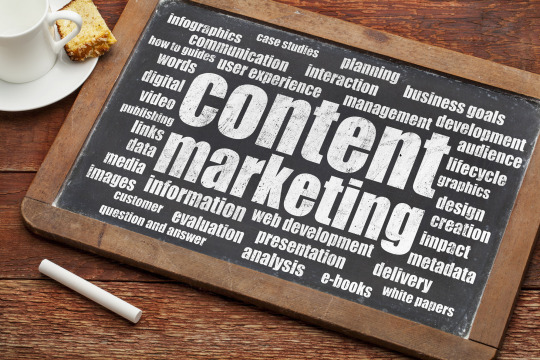
We see internet disruptions every day. The results of which are obvious in highly visible industries, such as media and publishing, music, consumer products, advertising and more.
It has also affected the way B2B companies go to market. Most notably, on the marketing side where advertising has become more competitive, less effective, and usually reaches a point of diminishing returns.
In fact, it’s become so difficult to figure out where our target audience is consuming information, it’s no wonder why marketers are so frustrated.
From a sales perspective, the internet has put a serious damper on the sales person’s ability to prospect. No one wants to talk to them. Most aren’t equipped to prospect online. After all, that’s not covered in sales training. And because they’re under pressure to make quota, most will give up too early. So they go back to doing what they’ve always done—make calls, send emails and go to networking events and conferences.
What’s Different?
This subtle disruption may be showing up in several ways:
• Your revenue has remained flat, or it has steadily declined, year over year–all despite being in an industry growing up around you, or a growing economy in general.
• Or, maybe your company has a revolving door of sales people, who are in and out faster than you get to know their names.
• Perhaps you’ve always relied on referrals, and maybe you still get them, but it’s not going to be enough to grow revenue like you want.
• And you might have noticed an increased animosity between sales and marketing departments. After all, marketing believes they’re doing great because the web traffic is up. Sales thinks the leads are terrible and marketing isn’t doing enough for them.
The Marketing Shift
Investing in marketing has always been dicey for companies with a complex sale. I’m defining complex here as any company with a product or service that requires a sales person to touch it before it becomes a deal. These products and services are usually costly to purchase, have long sales cycles, require education and consultation, and result in some sort of customized solution.
Many B2B CEOs that I’ve talked to are still hesitant to shift dollars into a demand generation system because they haven’t been able to measure marketing success very well in the past.
And even with internet measurement tools like Google Analytics, the measurement is still at the campaign level. In other words, branding and awareness marketing activities will always be difficult to measure when it comes to the true impact on revenue.
Therefore, simply making a larger investment in marketing and assigning a series of new projects (like starting a blog) won’t get you where you need to go in the digital world. Marketing people of the past are ill-equipped to handle lead generation through content marketing.
And here’s why: Over the last 10 years, the sales model has begun breaking down.
A good sales person used to be able to prospect enough with the phone, email, networking and knocking on doors to fill their calendars with appointments.
All they needed from marketing was branding and awareness, which is why most marketing people are trained this way.
In fact, as a B2B marketing director in the late 90s, I remember our sales people telling me: “I just want them to have heard of us when I call them.” And therefore, we focused our marketing efforts on mass media—mostly advertising and public relations to get the word out so that our sales people had some air cover. We also developed brochures, websites and sell sheets to help them close deals.
Today’s Sales Cycle
But today, sales people are finding it more and more difficult to get into enough sales conversations to make quota. Branding simply won’t open enough doors.
It’s not that we ever wanted to talk to a sales person, but it was necessary when it came to getting the information we needed.
Think about even a simple example of how you might buy a TV today as opposed to 10 years ago. Back then, you would go to Best Buy, find a salesperson, and start asking questions so you could make the right purchase.
Today, you’ll most likely do an internet search first, read reviews, shop for best pricing, and so on. Now, when you do show up at Best Buy, you’re armed to the hilt with information. So how likely are you to talk to the sales person?
My response when they ask me if I need help is usually, “Where are the TVs?” Or, “Your website says you have the Samsung model XKY in stock—can I take a look?”
Sales is Struggling
This same buying process is happening today with every B2B company, whether they know it or not. People are starting their searches for answers on the internet first. They will reach out to sales people, but only when they are ready to buy.
And because people are diagnosing their own problems and prescribing their own solutions, they often get it wrong.
Take the marketing automation industry for example. Do you know of a company that has bought Marketo, Pardot, Eloqua, Hubspot and more, just to have it sit on the shelf collecting dust? They grossly underestimated what it would take to operate them effectively, but it was the answer to their marketing problem, right?
If they’d been willing to talk to a sales person first, they would have told them what’s involved, what the team should look like, options for finding the right resources, and an estimate of what it might cost so a strategy could be prepared before spending any money on technology.
This is especially true if your sales people are selling products and services in an emerging industry. Prospects may not even know that they have a problem in the first place.
So if they’re not willing to take your call, and you can’t figure out where to find them at a conference or networking event, what are you supposed to do as a sales person?

Marketing Must do the Heavy Lifting
Don’t get me wrong. Sales people today are still responsible for developing 1 to 1 sales conversations and running the sales process. They’re still responsible for prospecting and getting into sales conversations. No one is saying they should wait around for the Glen Garry leads from Marketing.
And Marketing is still responsible for branding and awareness—the problem is, it’s not enough to drive one-to-one sales conversations.
The problem for both marketing and sales is that we now have a highly fragmented audience where the marketing activities that we’re used to — like advertising, public relations, SEO and social media — are all having diminishing returns.
And this is important for today’s B2B company. The only metric that matters for marketing is lead conversion. For those of you that know the lingo already, that’s Marketing Qualified Leads (in other words, someone that demonstrates digital behavior) and how many of those turned into sales conversations, or Sales Accepted Leads.
Creating Purposeful Content
If content marketing strategy is therefore intended to convert into b2b sales conversations, each piece that we produce must provide some sort of lead intelligence. Sales can then use this intelligence to try and have a conversation that leads down a buying path.
The bottom line is: if your marketing isn’t putting out content for people to find on a regular basis, you’re missing opportunities. Marketing strategy must be aligned with sales in B2B companies with a complex sale if they’re going to grow revenue—period.
This is important, so I’ll say it again, marketing’s new role in B2B is to drive one-to-one sales conversations digitally where salespeople either have difficulty getting their attention or are unaware of opportunities in the first place. It’s lead generation first, branding second. Branding in this case usually comes as a byproduct of this process when done well.
Even more critical, most innovative B2B companies know that it is now marketing’s burden to build as much of that trust online possible by providing thought leadership and lead intelligence in the form of engaging content that creates a unique experience for the consumer. In short, marketing must do the heavy lifting.
Marketing Like a Media Company
Some time in 2011, the Metropolitan Museum of Art in New York City decided that it could not rely on its 150-year history to acquire enough new audiences—they needed to launch a massive digital initiative.
When your mission shifts from selling product and service to building audience and monetizing it later, how does that change the marketing that you would produce?
For the Met, they do creative storytelling in innovative ways. The example I like to point to is their Artist project series where they brought in 100 famous artists to the museum, put them on camera, and had them talk about their favorite piece and why. Then, they launched the series Netflix-style on their website so viewers can binge watch if they want.
Sreenivasan told me in an interview that he believes the future of every business is storytelling and finding the right way to tell the right story at the right time. And one of the biggest things he’s learned in his tenure at the Met is these lessons apply to every business, big and small, B2B and consumer.
That includes the importance of mobile, social, and video. But most importantly, it’s not about thinking of your audience as millions of people, even though that’s what they have at the Met, but rather it’s about thinking about the right people following you for the right reasons.
The point of this is example is that effective content marketing in B2B means thinking about your audience first, and connecting them with the right message, at the right time, and in the right sequence.
The digital experience must be so good that people want to stay connected to your content, and to have your audience participate in the conversation, you have to think like them.
Now, you certainly don’t have to build an entire news room (although that would be awesome!) but I show you this example because engaging an audience requires marketers to think differently. More like the mindset of a publisher.
In other words, think like a magazine and not like its advertisers. When publishing content, it’s all about what the readers want. It takes frequency (publishing at predictable intervals) and it takes database management (collection of digital behavior) to continuously serve up content that gets your prospect to pick up your publication at the newsstand (or read your email or blog post and want to consume more).
Getting to Know Your Audience
So how does content become a sales conversation anyway? It starts with the creation of content that is going to identify some lead intelligence on a prospect when they consume it. This is why the content strategy that maps to the sales process from the get go is so important.
But even Before you start pumping out blogs and buying marketing automation systems, it’s time to get to know your audience.
Doing that requires involving every part of your team that is client facing– from customer service, to account leads, to sales, to executives. They all know something about the customer that you don’t as a marketer.
For example, you might want to Interview your sales team about the types of customers they target. If they’re face-to-face with a prospect, how do they probe for painpoints? What did the sales conversation in a recent win sound like when they identified them as a prospect? In other words, what was the key issue that prompted the client to talk to you in the first place?
After interviewing colleagues, you can dig deeper by calling your customers and prospects and asking them to validate your assumptions.
Chances are, your customers were facing similar issues in their day-to-day lives as your prospects. Identifying those problems will inspire the content you’ll create to help them solve their problem and hopefully use you to do it.
I should also note that content at the top of the funnel cannot and should not focus on the products and services offered by the company. That comes much later in the sales cycle, when a customer is ready to make a purchase decision and you’re down to answering objections and running sales process.
Once you get that strategy in place and start developing content, you can then start to figure out how you’re going to distribute it so that it gets in front of the right audience and generates leads for sales.
Where to Find Content
If there’s any question about where to get content from, I’ll reiterate that sales and other customer facing job functions are a good place to start. They’re on the front lines with customers and prospects daily. They know what problems they typically solve, what common objections they hear, and what trigger events lead to sales conversations. That’s where you get content topics to generate top-of-the-funnel interest—by focusing on pain, pain, and more pain.
You’re going to need an ongoing process for extracting information from your subject matter experts so that you can communicate in mediums that make sense for your consumer. And you want that anyway because you want quality writing. So say hello to journalists, designers, videographers and other media personnel!
If there’s any doubt as to why many large companies are hiring journalists to write for them, it should be apparent now.
The Sales Pyramid
But anyway, let’s get back to sales and what the process now looks like with a demand generation engine providing marketing qualified leads.
Any good sales prospector should be able to use marketing’s support in the digital world to prioritize his or her prospecting efforts.
Jeb Blount, in his book Fanatical Prospecting, talks about a pyramid of prospecting where top sales performers view their prospect database as a pyramid:
At the bottom of the pyramid are the thousands of prospects they know little about other than a company name and perhaps some contact information. These are the coldest of the cold.
The goal with these prospects is always be moving them up the pyramid by gathering information, and qualifying. At the tip-top are highly qualified prospects who are moving into the buying window.
These are the highest-priority prospects and should be on the top of a sales representative’s daily prospecting list.
Once those top priorities have been exhausted, the sales person can move down the pyramid, following up on Marketing Qualified Leads and using lead intelligence to foster sales conversations.
If your sales people are always working at the bottom of the pyramid (the coldest of the cold) they’re probably not going to make quota. And even worse, if you’ve got good sales people who are always working at the bottom of the pyramid, you risk losing them to a competitor who can help them with marketing leads.

Measurement and Analysis
Of course, companies want to know the what content marketing’s return on investment will be, but it depends on several factors.
Let’s start with whether everyone in the organization has bought into the concept of content marketing. If the CEO is going to spend a few dollars to try it out, and 3 months later decide it’s not working and goes back to hiring more sales people, your ROI will be nada. (I’ve met several CEOs that fit this model exactly.)
Another question is, can you accurately measure your sales process now? In other words, where are your deals coming from now, and what percentage of them do you close?
Also, do you have technology in place such as marketing automation and a CRM, and do your sales people actually use it?
If your answer to all of those questions is yes, then it should be relatively easy to track some pretty significant numbers that will tell you exactly where to spend money and what needs to be fixed.
If not, then this is where you start: getting buy-in for content marketing, establishing a baseline for sales and marketing metrics, developing content, putting in the right technology, testing, and measuring.
If you are generating plenty of leads (or MQLs) every month, the statistics should show how many sales conversations that leads to. From those sales conversations, how many turn into opportunities? And of those opportunities, how many are we closing?
Playing around with those numbers will start to give you a sense of where to spend money.
If you’re closing a large majority of leads that come from various sources, but you don’t have enough “at bats” to move the revenue forward, you’ve got a marketing problem and you need to spend money to produce more qualified leads.
If you’re generating plenty of leads, but they aren’t turning into sales conversations, you could have a problem with the quality of content that your producing, or sales could be ill-equipped to nurture leads and run sales process.
Once you have real data, the measurement can even get more granular.
By determining your overall customer acquisition costs — all the money you spend on marketing and sales people for a given time period divided by the total number of customers you got in that time period — you can calculate all the way down to how much one lead was worth to you.
Content marketing done correctly should be completely measureable, giving you the ability to know where you’re going to have the best return on investment.

Finding the Budget
Acquiring new customers is expensive. It always has been.
Content marketing is no different because it’s a long game, and you should expect to make some significant expenditures in the short term to get it moving. It’s like pushing a giant boulder down a hill—it takes an extreme amount of energy to get it moving, and then it should generate momentum on its own.
So where to find the money for content? A lot of times, it’s about shifting available resources. I know—easier said than done. But If you’re currently spending marketing dollars on pay-per-click ads that have shown diminishing returns, of if you’re currently spending dollars to have a “presence at trade shows,” those are some good places to start.
Another place to look is the expenditures within your sales force. Do you have too many expensive sales people? Can any of the business development and nurturing functions be transitioned to an inside sales team?
But most importantly, stop hiring sales people because they promise a large rolodex of industry prospects that they can bring to the table. The only reason to hire more consultative sales people is that marketing and business development are sending over so many qualified leads that the closers can’t keep up.
Re-allocate and invest that money into a marketing front end that leads with great content that is going to add value to your prospects.
They’ll thank you with their business.
Consumers are searching daily on Google for products and services similar to your brand. Do you want them to find you? Studies on consumer behavior have shown that good online exposure is key to building and growing a business. Investing in the Best SEO services in St Petersburg, FL is, therefore, a wise decision.
0 notes
Text
Where Do Black Holes Lead?
Where Do Black Holes Lead?

Where does a black hole go?
So there you are, about to leap into a black hole. What could possibly await should — against all odds — you somehow survive? Where would you end up and what tantalizing tales would you be able to regale if you managed to clamor your way back?
The simple answer to all of these questions is, as Professor Richard Massey explains, "Who knows?" As a Royal Society research fellow at the Institute for Computational Cosmology at Durham University, Massey is fully aware that the mysteries of black holes run deep. "Falling through an event horizon is literally passing beyond the veil — once someone falls past it, nobody could ever send a message back," he said. "They'd be ripped to pieces by the enormous gravity, so I doubt anyone falling through would get anywhere."
If that sounds like a disappointing — and painful — answer, then it is to be expected. Ever since Albert Einstein's general theory of relativity was considered to have predicted black holes by linking space-time with the action of gravity, it has been known that black holes result from the death of a massive star leaving behind a small, dense remnant core. Assuming this core has more than roughly three-times the mass of the sun, gravity would overwhelm to such a degree that it would fall in on itself into a single point, or singularity, understood to be the black hole's infinitely dense core.
Related: 9 Ideas About Black Holes That Will Blow Your Mind
CLOSE
The resulting uninhabitable black hole would have such a powerful gravitational pull that not even light could avoid it. So, should you then find yourself at the event horizon — the point at which light and matter can only pass inward, as proposed by the German astronomer Karl Schwarzschild — there is no escape. According to Massey, tidal forces would reduce your body into strands of atoms (or 'spaghettification', as it is also known) and the object would eventually end up crushed at the singularity. The idea that you could pop out somewhere — perhaps at the other side — seems utterly fantastical.
What about a wormhole?
Or is it? Over the years scientists have looked into the possibility that black holes could be wormholes to other galaxies. They may even be, as some have suggested, a path to another universe.
Such an idea has been floating around for some time: Einstein teamed up with Nathan Rosen to theorise bridges that connect two different points in space-time in 1935. But it gained some fresh ground in the 1980s when physicist Kip Thorne — one of the world's leading experts on the astrophysical implications of Einstein's general theory of relativity — raised a discussion about whether objects could physically travel through them.
"Reading Kip Thorne's popular book about wormholes is what first got me excited about physics as a child," Massey said. But it doesn't seem likely that wormholes exist.
Indeed, Thorne, who lent his expert advice to the production team for the Hollywood movie Interstellar, wrote: "We see no objects in our universe that could become wormholes as they age," in his book "The Science of Interstellar" (W.W. Norton and Company, 2014). Thorne told Space.com that journeys through these theoretical tunnels would most likely remain science fiction, and there is certainly no firm evidence that a black hole could allow for such a passage. Artist's concept of a wormhole. If wormholes exist, they might lead to another universe. But, there's no evidence that wormholes are real or that a black hole would act like one. (Image credit: Shutterstock)
But, the problem is that we can't get up close to see for ourselves. Why, we can't even take photographs of anything that takes place inside a black hole — if light cannot escape their immense gravity, then nothing can be snapped by a camera. As it stands, theory suggests that anything which goes beyond the event horizon is simply added to the black hole and, what's more, because time distorts close to this boundary, this will appear to take place incredibly slowly, so answers won't be quickly forthcoming.
"I think the standard story is that they lead to the end of time," said Douglas Finkbeiner, professor of astronomy and physics at Harvard University. "An observer far away will not see their astronaut friend fall into the black hole. They'll just get redder and fainter as they approach the event horizon [as a result of gravitational red shift]. But the friend falls right in, to a place beyond 'forever.' Whatever that means."
Maybe a black hole leads to a white hole
Certainly, if black holes do lead to another part of a galaxy or another universe, there would need to be something opposite to them on the other side. Could this be a white hole — a theory put forward by Russian cosmologist Igor Novikov in 1964? Novikov proposed that a black hole links to a white hole that exists in the past. Unlike a black hole, a white hole will allow light and matter to leave, but light and matter will not be able to enter.
Scientists have continued to explore the potential connection between black and white holes. In their 2014 study published in the journal Physical Review D, physicists Carlo Rovelli and Hal M. Haggard claimed that "there is a classic metric satisfying the Einstein equations outside a finite space-time region where matter collapses into a black hole and then emerges from a while hole." In other words, all of the material black holes have swallowed could be spewed out, and black holes may become white holes when they die.
Far from destroying the information that it absorbs, the collapse of a black hole would be halted. It would instead experience a quantum bounce, allowing information to escape. Should this be the case, it would shed some light on a proposal by former Cambridge University cosmologist and theoretical physicist Stephen Hawking who, in the 1970s, explored the possibility that black holes emit particles and radiation — thermal heat — as a result of quantum fluctuations.
"Hawking said a black hole doesn't last forever," Finkbeiner said. Hawking calculated that the radiation would cause a black hole to lose energy, shrink and disappear, as described in his 1976 paper published in Physical Review D. Given his claims that the radiation emitted would be random and contain no information about what had fallen in, the black hole, upon its explosion, would erase loads of information.
This meant Hawking's idea was at odds with quantum theory, which says information can't be destroyed. Physics states information just becomes more difficult to find because, should it become lost, it becomes impossible to know the past or the future. Hawking's idea led to the 'black hole information paradox' and it has long puzzled scientists. Some have said Hawking was simply wrong, and the man himself even declared he had made an error during a scientific conference in Dublin in 2004.
So, do we go back to the concept of black holes emitting preserved information and throwing it back out via a white hole? Maybe. In their 2013 study published in Physical Review Letters, Jorge Pullin at Louisiana State University and Rodolfo Gambini at the University of the Republic in Montevideo, Uruguay, applied loop quantum gravity to a black hole and found that gravity increased towards the core but reduced and plonked whatever was entering into another region of the universe. The results gave extra credence to the idea of black holes serving as a portal. In this study, singularity does not exist, and so it doesn't form an impenetrable barrier that ends up crushing whatever it encounters. It also means that information doesn't disappear.
Maybe black holes go nowhere
Yet physicists Ahmed Almheiri, Donald Marolf, Joseph Polchinski and James Sully still believed Hawking could have been on to something. They worked on a theory that became known as the AMPS firewall, or the black hole firewall hypothesis. By their calculations, quantum mechanics could feasibly turn the event horizon into a giant wall of fire and anything coming into contact would burn in an instant. In that sense, black holes lead nowhere because nothing could ever get inside.
This, however, violates Einstein's general theory of relativity. Someone crossing the event horizon shouldn't actually feel any great hardship because an object would be in free fall and, based on the equivalence principle, that object — or person — would not feel the extreme effects of gravity. It could follow the laws of physics present elsewhere in the universe, but even if it didn't go against Einstein's principle it would undermine quantum field theory or suggest information can be lost.
Related: 11 Fascinating Facts About Our Milky Way GalaxyArtist's impression of a tidal disruption event which occurs when a star passes too close to a supermassive black hole. (Image credit: All About Space magazine)
A black hole of uncertainty
Step forward Hawking once more. In 2014, he published a study in which he eschewed the existence of an event horizon — meaning there is nothing there to burn — saying gravitational collapse would produce an 'apparent horizon' instead.
This horizon would suspend light rays trying to move away from the core of the black hole, and would persist for a "period of time." In his rethinking, apparent horizons temporarily retain matter and energy before dissolving and releasing them later down the line. This explanation best fits with quantum theory — which says information can't be destroyed — and, if it was ever proven, it suggests that anything could escape from a black hole.
Hawking went as far as saying black holes may not even exist. "Black holes should be redefined as metastable bound states of the gravitational field," he wrote. There would be no singularity, and while the apparent field would move inwards due to gravity, it would never reach the center and be consolidated within a dense mass.
And yet anything which is emitted will not be in the form of the information swallowed. It would be impossible to figure out what went in by looking at what is coming out, which causes problems of its own — not least for, say, a human who found themselves in such an alarming position. They'd never feel the same again!
One thing's for sure, this particular mystery is going to swallow up many more scientific hours for a long time to come. Rovelli and Francesca Vidotto recently suggested that a component of dark matter could be formed by remnants of evaporated black holes, and Hawking's paper on black holes and 'soft hair' was released in 2018, and describes how zero-energy particles are left around the point of no return, the event horizon — an idea that suggests information is not lost but captured.
This flew in the face of the no-hair theorem which was expressed by physicist John Archibald Wheeler and worked on the basis that two black holes would be indistinguishable to an observer because none of the special particle physics pseudo-charges would be conserved. It's an idea that has got scientists talking, but there is some way to go before it's seen as the answer for where black holes lead. If only we could find a way to leap into one.
https://ift.tt/2stoz06 . Foreign Articles December 02, 2019 at 04:13AM
0 notes
Text
Newsgeist un-conference: Facebook faces the music, sort of
Note: This is something I originally published on the New Gatekeepers blog at the Columbia Journalism Review, where I’m the chief digital writer
The Newsgeist conference, which was held this past weekend in Phoenix (as it is every year), is an unusual animal. It’s invitation-only, co-sponsored by Google and the Knight Foundation, and aimed at bringing journalists and academics and others involved in media together for what is known as an “un-conference.” That means there aren’t any organized sessions set up in advance of the event: attendees put their suggested topics on index cards, then the organizers group them, and select which ones get assigned to different rooms at Arizona State University’s journalism school (anyone whose idea isn’t chosen can also use a free room to host a discussion). The event is held under the so-called Chatham House Rule, which states that any information from the conference can be used or published in any way, but no one can be quoted by name.
The ideas at the most recent version of the conference ranged from the technical (“New Formats For Storytelling”) and the opinionated (“How Do We Atone For the Harm We Have Caused?”) to the whimsical (“Pulsing, Useless Anger: How Do We Deal With It?”), and everywhere in between. But just as there have been for the past couple of years, there were a number of suggestions that boiled down to “What Should Facebook Do?” In other words, what should Facebook do for journalism? (There have also been “What Should Google Do?” panels, but they tend to be less confrontational, perhaps because Google helps to fund the conference and many senior Googlers are present).
This year, the Facebook panel (moderated by someone who works at Google) included two fairly senior staffers who work at the giant social network, one on the technical side and one on the media relations side. They talked about the struggle to determine what constitutes “quality” journalism, and how to make it easier to find, while also down-ranking misinformation and fake news. Many of the suggestions from the audience revolved around making those features better, but then a participant who must remain nameless raised a contentious issue: Why, he asked, was Facebook even interested in doing any of this? Why did it care at all about journalism quality, etc., assuming it actually did? Without knowing the company’s inherent motivation, he suggested, it’s impossible to determine whether its goals are aligned with those of the press, or whether its methods will have any hope of success.
This exchange led to a long, awkward pause, but it’s a good question. For example, if Facebook’s only impetus for paying attention to journalism is simply to boost its engagement metrics, keep people on the platform longer, etc. then that is one thing — and something many media companies might be less interested in, if only because users spending more time reading a news outlet’s content on Facebook means less time doing so on a news publisher’s own site. And if Facebook’s motivation has more to do with avoiding possible federal legislation or more uncomfortable appearances before Congress, then that is also worth knowing.
The two Facebook staffers said their sole aim was to improve the experience for users, who in the short term might be tempted by false information, but over the longer term might prefer higher quality information. But this still puts Facebook in the position of wanting quality information primarily to satisfy users’ desires, and to keep them on Facebook as long as possible. Not because they might need to know the information in order to be informed citizens, which is (theoretically, at least) the reason some journalistic outlets publish things, but just so they are happy and remain loyal users. This is the Facebook equivalent of a publisher who prints stories primarily in order to sell newspapers. Although Facebook co-founder and CEO Mark Zuckerberg has talked about his commitment to quality information as a social good, it’s not clear whether this over-rides his company’s commercial or financial goals.
The point of the question, the original questioner said later, was to highlight just how bizarre a situation the media industry is in, where journalists are deferentially asking a private company if it could please figure out how to fix the misinformation problem, or how to promote better journalism. Also left almost unsaid in the panel, was one of the most tangible means of support that Facebook could provide, namely paying media companies and/or journalists for their work. The only person to make explicit mention of this idea, surprisingly enough, was the Google executive moderating the session (no mention of whether Google might be interested in doing the same).
One of the other panels that sparked conversation was a debate over whether the blockchain can help save journalism, a session that saw at least one F-bomb thrown by attendees, and one that seemed particularly relevant given the ongoing token sale by Civil, the blockchain-powered platform for independent journalism that seems likely to fall short of its minimum $8 million fundraising goal. Other popular topics included artificial intelligence, how to fight misinformation, the need for diversity — one of the topics covered by a great lightning presentation from Heather Bryant — and the shift towards reader revenue through subscriptions and memberships. And as a kind of ironic metaphor for the industry’s current situation, during one panels every cellphone started ringing or vibrating simultaneously with an emergency alert. It was about high water levels due to a tropical storm, but it could just as easily have said: “Warning: We have detected declining levels of revenue and trust in the media industry. Please move to a safe location and await further instructions.”
Newsgeist un-conference: Facebook faces the music, sort of was originally published on mathewingram.com/work
0 notes
Text
What’s on USMLE Step 1?

By BRYAN CARMODY
Recently, I was on The Accad and Koka Report to share my opinions on USMLE Step 1 scoring policy. (If you’re interested, you can listen to the episode on the show website or iTunes.)
Most of the topics we discussed were ones I’ve already dissected on this site. But there was an interesting moment in the show, right around the 37:30 mark, that raises an important point that is worthy of further analysis.
__
ANISH: There’s also the fact that nobody is twisting the arms of program directors to use [USMLE Step 1] scores, correct? Even in an era when you had clinical grades reported, there’s still seems to be value that PDs attach to these scores. . . There’s no regulatory agency that’s forcing PDs to do that. So if PDs want to use, you know, a number on a test to determine who should best make up their class, why are you against that?
BRYAN: I’m not necessarily against that if you make that as a reasoned decision. I would challenge a few things about it, though. I guess the first question is, what do you think is on USMLE Step 1 that is meaningful?
ANISH: Well – um – yeah…
BRYAN: What do you think is on that test that makes it a meaningful metric?
ANISH: I – I don’t- I don’t think that – I don’t know that memorizing… I don’t even remember what was on the USMLE. Was the Krebs Cycle on the USMLE Step 1?
__
I highlight this snippet not to pick on Anish – who was a gracious host, and despite our back-and-forth on Twitter, we actually agreed much more than we disagreed. And as a practicing clinician who is 15 years removed from the exam, I’m not surprised in the least that he doesn’t recall exactly what was on the test.
I highlight this exchange because it illuminates one of the central truths in the #USMLEPassFail debate, and that is this:
Physicians who took Step 1 more than 5 years ago honestly don’t have a clue about what is tested on the exam.
That’s not because the content has changed. It’s because the memories of minutiae fade over time, leaving behind the false memory of a test that was more useful than it really was.
I’m speaking from experience here.
CONFESSIONS OF A FORMER STEP 1 APOLOGIST
Believe it or not, I was once a USMLE apologist. If you’d asked me my opinion of Step 1 a few years ago, I would have said “Yeah, it’s not the best, but it’s the best we’ve got…” and parroted back many of the same arguments for a scored test that are still bandied about today.
My opinion started to change a few years ago when I started teaching some courses for our first- and second-year medical students. I wanted to be sure that the concepts and terminology I used were consistent with what they needed to know for the USMLE, so I reviewed a whole bunch of Step 1 questions using the NBME’s Computerized Assessment System (CAS).
As I answered question after question, three broad categories of questions emerged.
CORE SCIENTIFIC CONCEPTS: Many questions I knew cold. These questions tested key aspects of physiology, pharmacology, or pathology that I use frequently to take care of patients.
A LITTLE OFF THE BEATEN PATH: Another group of questions were more challenging. They asked about basic science concepts with only peripheral relevance to the practice of nephrology. Some of these I got right; some I got wrong. Most stirred up a dormant memory of facts that I might have known during my own Step 1 studying.
BASIC SCIENCE TRIVIA: A final group of questions were completely foreign. Not only did I not know them, but I had no memory of there ever being a time in my life when I would have known them. For these, it was hard to even conceive of how such information could be clinically useful.
I’d like to share examples of these questions to you. However, to gain access to CAS, I signed a blood oath confidentiality agreement with the NBME that I would not disclose the questions within, and I am going to honor that.
However… the USMLE does provide some real USMLE Step 1 sample questions to the general public. I reviewed just the first block (questions 1-40) and highlighted some of the best below.

SAMPLE QUESTION 1

You might think that the makers of a mandatory medical licensing examination would be interested in determining whether doctors-to-be knew how to keep this poor guy from dying in the first place. Nah. For Step 1, let’s just figure out who knows how this cell got here.
(The correct answer, in case you were wondering, is B.)
_
SAMPLE QUESTION 2

What I love about this question is the way it lures you in with a totally-believable clinical vignette. Is it a question about burn care? Infection prevention? Indications for debridement? Nope. Hope you memorized your cytokines! If not, the correct answer is E.
_
SAMPLE QUESTION 3

Whoa. Not to be outdone by Sample Question 2, this question makes multiple head-fakes toward clinically relevant medical decision-making that might benefit a human being… before ending with cellular signaling pathways.
Look, I actually evaluate children suspected to have diabetes insipidus. Never once has it occurred to me to look up this factoid (much less carry it around in my head). But in case your diagnostic algorithm differs from my own, the correct answer is A.
SAMPLE QUESTION 4

Are you sensing a theme here?
As usual, the question stem starts off strong with a vignette on a clinically-relevant entity (RSV bronchiolitis), before diverting into Virology Jeopardy. Is it really the case that all doctors must know, as a condition of licensure, that RSV has a linear, negative-sense RNA genome?
Sigh.
I hopefully guessed answer choice E, thinking that perhaps the USMLE was trying to test a clinically-useful point which I had been heretofore unaware. They weren’t. The correct answer is D.
_
SAMPLE QUESTION 5

I have to at least applaud this question for its lack of pretense. No clinical foreplay at all. It gets straight into the basic science.
And in case it’s been a while since you walked into clinic and did a Southern blot on the digestion products of your patient’s cerebellum and pancreas, the correct answer is C.
HOW’D YOU DO?
Anybody go 5 for 5?
Let me save you a little time on your angry e-mails and address some of the inevitable objections to this little exercise.
YOU CHERRY-PICKED THOSE QUESTIONS.
Yes, I did. But bear in mind, these cherries were plucked from a 40 question block – so these 5 represent 12.5% of the total. (Plus, these are the exemplary questions that the NBME has chosen to release on the sample test. The questions I reviewed on CAS verged even farther into the realm of the obscure.)
And bear in mind, as Step 1 scores climb higher and higher, the questions that are used to discriminate between candidates at the upper end become more and more obscure. Knowing the answers to these kinds of questions may be the difference between a student being able to pursue a career in, say, orthopedic surgery – or not.
So students will study more and more to memorize facts that are less and less useful. And as this process repeats iteratively over residency application cycles, things will get worse and worse – until we demand that something be done about it.
THOSE AREN’T BAD QUESTIONS. I GOT THEM ALL RIGHT.
Cool. Actually, I got two of them right. But that doesn’t keep me from appreciating that the concepts being tested are almost certainly unnecessary for the safe and effective practice of medicine.
THIS MATERIAL ISN’T IRRELEVANT! WHY, JUST YESTERDAY I PRESCRIBED A VEGF INHIBITOR TO A PATIENT IN MY CLINIC.
So why not test the indications for using VEGF inhibitors, or their side effects? Just because the answer to some of these questions relates to something that’s useful doesn’t mean that they’re good questions.
THOSE QUESTIONS AREN’T IRRELEVANT FOR ALL PHYSICIANS. WHAT ABOUT THOSE WHO PURSUE CAREERS IN RESEARCH? SOUTHERN BLOTTING IS QUITE USEFUL!
Let me be clear – none of what I am pointing out here is intended to denigrate basic science or basic scientists. For those of you who work in research, hats off to you. Honestly. But I would put it to you that even those who have made it their life’s mission to understand the Janus kinase weren’t inspired to do so through their Step 1 preparation.
Here’s the thing: the USMLE Step 1 is a licensing examination. Medical licensure exists to protect the public.
And it’s very for me difficult to conceive of a situation in which a patient could be harmed by a physician’s inability to answer any of those questions above. (It’s even more difficult to try to imagine a case in which a patient would benefit by receiving care from a clinician armed with these nuggets of trivia.)
WE DON’T USE STEP 1 SCORES BECAUSE OF THE KNOWLEDGE IT TESTS. WE USE SCORES BECAUSE IT SHOWS US WHAT CANDIDATES HAVE THE BEST WORK ETHIC, TIME MANAGEMENT SKILLS, DETERMINATION, GRIT, ETC.
Then could we not measure those things while engaging students in an endeavor that actually leads to them being a better physician? If it’s really true that the content is irrelevant, why not just ask students to memorize digits of pi?
THE BOTTOM LINE
The “save the scored USMLE” coalition is a varied one.
There are students who perceive that they benefit from a scored test, or who would rather compete with their Step 1 score than by some other metric. There are graduates who worked their butts off to get a high score and have benefitted from it – and they view an attack on Step 1 scores as an attack on their own intelligence or work ethic. There are (cough cough) certain organizations who have a vested financial interest in maintaining a scored test. And there are well-meaning faculty and program directors who aren’t sold on Step 1, but buy into the NBME’s messaging about how anything that could possibly replace Step 1 will be worse.
Some of those objections I get; some, not so much.
If you support maintaining scored test, all I ask is this: know what you’re fighting for. Don’t rely on your own remote experience with Step 1 inform your knowledge about what’s being measured by the Step 1 score.
Dr. Carmody is a pediatric nephrologist and medical educator at Eastern Virginia Medical School. This post originally appeared on The Sheriff of Sodium here.
What’s on USMLE Step 1? published first on https://wittooth.tumblr.com/
0 notes
Text
What’s on USMLE Step 1?

By BRYAN CARMODY
Recently, I was on The Accad and Koka Report to share my opinions on USMLE Step 1 scoring policy. (If you’re interested, you can listen to the episode on the show website or iTunes.)
Most of the topics we discussed were ones I’ve already dissected on this site. But there was an interesting moment in the show, right around the 37:30 mark, that raises an important point that is worthy of further analysis.
__
ANISH: There’s also the fact that nobody is twisting the arms of program directors to use [USMLE Step 1] scores, correct? Even in an era when you had clinical grades reported, there’s still seems to be value that PDs attach to these scores. . . There’s no regulatory agency that’s forcing PDs to do that. So if PDs want to use, you know, a number on a test to determine who should best make up their class, why are you against that?
BRYAN: I’m not necessarily against that if you make that as a reasoned decision. I would challenge a few things about it, though. I guess the first question is, what do you think is on USMLE Step 1 that is meaningful?
ANISH: Well – um – yeah…
BRYAN: What do you think is on that test that makes it a meaningful metric?
ANISH: I – I don’t- I don’t think that – I don’t know that memorizing… I don’t even remember what was on the USMLE. Was the Krebs Cycle on the USMLE Step 1?
__
I highlight this snippet not to pick on Anish – who was a gracious host, and despite our back-and-forth on Twitter, we actually agreed much more than we disagreed. And as a practicing clinician who is 15 years removed from the exam, I’m not surprised in the least that he doesn’t recall exactly what was on the test.
I highlight this exchange because it illuminates one of the central truths in the #USMLEPassFail debate, and that is this:
Physicians who took Step 1 more than 5 years ago honestly don’t have a clue about what is tested on the exam.
That’s not because the content has changed. It’s because the memories of minutiae fade over time, leaving behind the false memory of a test that was more useful than it really was.
I’m speaking from experience here.
CONFESSIONS OF A FORMER STEP 1 APOLOGIST
Believe it or not, I was once a USMLE apologist. If you’d asked me my opinion of Step 1 a few years ago, I would have said “Yeah, it’s not the best, but it’s the best we’ve got…” and parroted back many of the same arguments for a scored test that are still bandied about today.
My opinion started to change a few years ago when I started teaching some courses for our first- and second-year medical students. I wanted to be sure that the concepts and terminology I used were consistent with what they needed to know for the USMLE, so I reviewed a whole bunch of Step 1 questions using the NBME’s Computerized Assessment System (CAS).
As I answered question after question, three broad categories of questions emerged.
CORE SCIENTIFIC CONCEPTS: Many questions I knew cold. These questions tested key aspects of physiology, pharmacology, or pathology that I use frequently to take care of patients.
A LITTLE OFF THE BEATEN PATH: Another group of questions were more challenging. They asked about basic science concepts with only peripheral relevance to the practice of nephrology. Some of these I got right; some I got wrong. Most stirred up a dormant memory of facts that I might have known during my own Step 1 studying.
BASIC SCIENCE TRIVIA: A final group of questions were completely foreign. Not only did I not know them, but I had no memory of there ever being a time in my life when I would have known them. For these, it was hard to even conceive of how such information could be clinically useful.
I’d like to share examples of these questions to you. However, to gain access to CAS, I signed a blood oath confidentiality agreement with the NBME that I would not disclose the questions within, and I am going to honor that.
However… the USMLE does provide some real USMLE Step 1 sample questions to the general public. I reviewed just the first block (questions 1-40) and highlighted some of the best below.

SAMPLE QUESTION 1

You might think that the makers of a mandatory medical licensing examination would be interested in determining whether doctors-to-be knew how to keep this poor guy from dying in the first place. Nah. For Step 1, let’s just figure out who knows how this cell got here.
(The correct answer, in case you were wondering, is B.)
_
SAMPLE QUESTION 2

What I love about this question is the way it lures you in with a totally-believable clinical vignette. Is it a question about burn care? Infection prevention? Indications for debridement? Nope. Hope you memorized your cytokines! If not, the correct answer is E.
_
SAMPLE QUESTION 3

Whoa. Not to be outdone by Sample Question 2, this question makes multiple head-fakes toward clinically relevant medical decision-making that might benefit a human being… before ending with cellular signaling pathways.
Look, I actually evaluate children suspected to have diabetes insipidus. Never once has it occurred to me to look up this factoid (much less carry it around in my head). But in case your diagnostic algorithm differs from my own, the correct answer is A.
SAMPLE QUESTION 4

Are you sensing a theme here?
As usual, the question stem starts off strong with a vignette on a clinically-relevant entity (RSV bronchiolitis), before diverting into Virology Jeopardy. Is it really the case that all doctors must know, as a condition of licensure, that RSV has a linear, negative-sense RNA genome?
Sigh.
I hopefully guessed answer choice E, thinking that perhaps the USMLE was trying to test a clinically-useful point which I had been heretofore unaware. They weren’t. The correct answer is D.
_
SAMPLE QUESTION 5
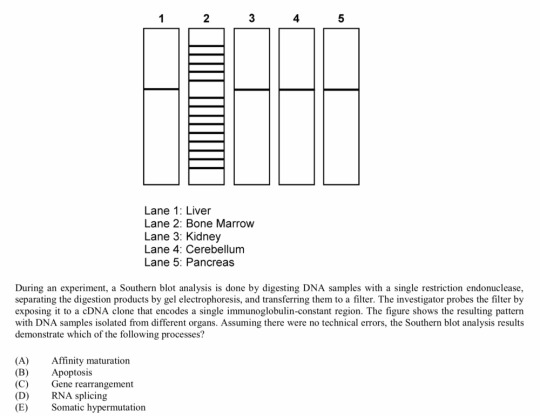
I have to at least applaud this question for its lack of pretense. No clinical foreplay at all. It gets straight into the basic science.
And in case it’s been a while since you walked into clinic and did a Southern blot on the digestion products of your patient’s cerebellum and pancreas, the correct answer is C.
HOW’D YOU DO?
Anybody go 5 for 5?
Let me save you a little time on your angry e-mails and address some of the inevitable objections to this little exercise.
YOU CHERRY-PICKED THOSE QUESTIONS.
Yes, I did. But bear in mind, these cherries were plucked from a 40 question block – so these 5 represent 12.5% of the total. (Plus, these are the exemplary questions that the NBME has chosen to release on the sample test. The questions I reviewed on CAS verged even farther into the realm of the obscure.)
And bear in mind, as Step 1 scores climb higher and higher, the questions that are used to discriminate between candidates at the upper end become more and more obscure. Knowing the answers to these kinds of questions may be the difference between a student being able to pursue a career in, say, orthopedic surgery – or not.
So students will study more and more to memorize facts that are less and less useful. And as this process repeats iteratively over residency application cycles, things will get worse and worse – until we demand that something be done about it.
THOSE AREN’T BAD QUESTIONS. I GOT THEM ALL RIGHT.
Cool. Actually, I got two of them right. But that doesn’t keep me from appreciating that the concepts being tested are almost certainly unnecessary for the safe and effective practice of medicine.
THIS MATERIAL ISN’T IRRELEVANT! WHY, JUST YESTERDAY I PRESCRIBED A VEGF INHIBITOR TO A PATIENT IN MY CLINIC.
So why not test the indications for using VEGF inhibitors, or their side effects? Just because the answer to some of these questions relates to something that’s useful doesn’t mean that they’re good questions.
THOSE QUESTIONS AREN’T IRRELEVANT FOR ALL PHYSICIANS. WHAT ABOUT THOSE WHO PURSUE CAREERS IN RESEARCH? SOUTHERN BLOTTING IS QUITE USEFUL!
Let me be clear – none of what I am pointing out here is intended to denigrate basic science or basic scientists. For those of you who work in research, hats off to you. Honestly. But I would put it to you that even those who have made it their life’s mission to understand the Janus kinase weren’t inspired to do so through their Step 1 preparation.
Here’s the thing: the USMLE Step 1 is a licensing examination. Medical licensure exists to protect the public.
And it’s very for me difficult to conceive of a situation in which a patient could be harmed by a physician’s inability to answer any of those questions above. (It’s even more difficult to try to imagine a case in which a patient would benefit by receiving care from a clinician armed with these nuggets of trivia.)
WE DON’T USE STEP 1 SCORES BECAUSE OF THE KNOWLEDGE IT TESTS. WE USE SCORES BECAUSE IT SHOWS US WHAT CANDIDATES HAVE THE BEST WORK ETHIC, TIME MANAGEMENT SKILLS, DETERMINATION, GRIT, ETC.
Then could we not measure those things while engaging students in an endeavor that actually leads to them being a better physician? If it’s really true that the content is irrelevant, why not just ask students to memorize digits of pi?
THE BOTTOM LINE
The “save the scored USMLE” coalition is a varied one.
There are students who perceive that they benefit from a scored test, or who would rather compete with their Step 1 score than by some other metric. There are graduates who worked their butts off to get a high score and have benefitted from it – and they view an attack on Step 1 scores as an attack on their own intelligence or work ethic. There are (cough cough) certain organizations who have a vested financial interest in maintaining a scored test. And there are well-meaning faculty and program directors who aren’t sold on Step 1, but buy into the NBME’s messaging about how anything that could possibly replace Step 1 will be worse.
Some of those objections I get; some, not so much.
If you support maintaining scored test, all I ask is this: know what you’re fighting for. Don’t rely on your own remote experience with Step 1 inform your knowledge about what’s being measured by the Step 1 score.
Dr. Carmody is a pediatric nephrologist and medical educator at Eastern Virginia Medical School. This post originally appeared on The Sheriff of Sodium here.
What’s on USMLE Step 1? published first on https://venabeahan.tumblr.com
0 notes